Vegetarian The
National Vegetarian Week 2023
Read all about this year's campaign: Make Your Meals Better By Miles!
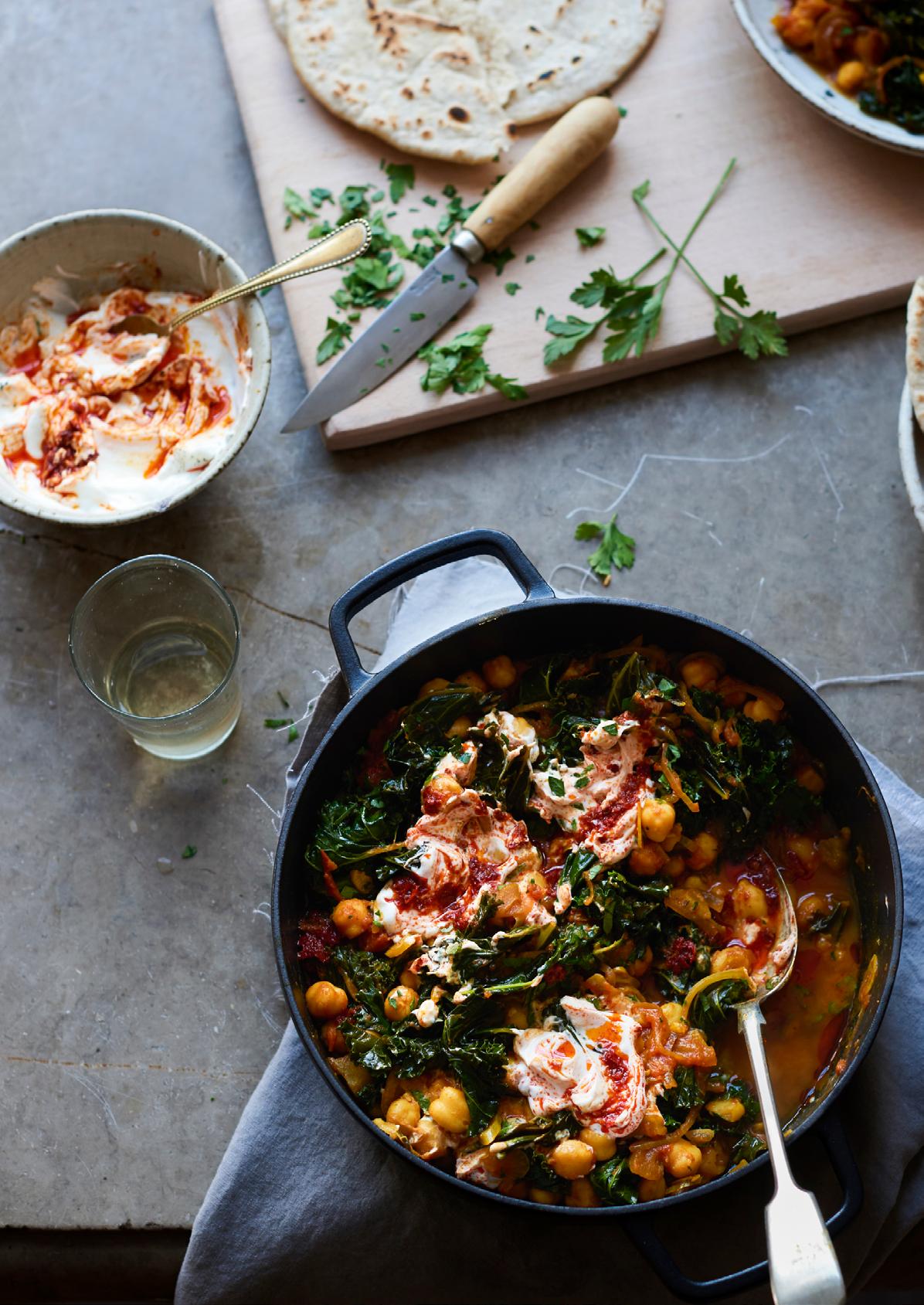
A trip to the spiritual home of vegetarianism
Our Chair, Conn O'Neill, tells us about his adventures in India
Exploring the Veggie World
A vegetarian teacher who quit her job to travel the world discusses some of the challenges she faced
Mini Menus for Little Eaters
Great tips and ideas for eating out with the children
ISSN 1475-3413 Summer/Autumn 2023
The members' magazine of the Vegetarian Society
4 VEGGIE GOOD REASONS TO VISIT AMBLESIDE
COMBINE LUXURY ACCOMODATION WITH FINE VEGETARIAN CUISINE
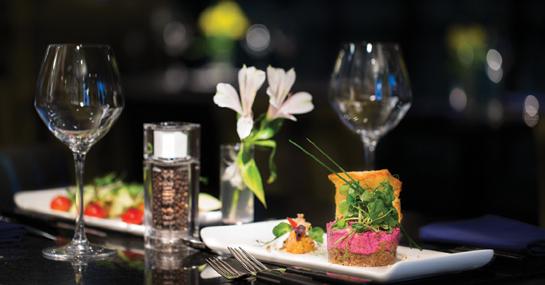
Zeffirellis
www.zeffirellis.com
An award-winning vegetarian restaurant that also hosts a daytime cafe, a jazz bar and an independent cinema. We offer a Cinema Deal for £27.75 which includes a two course meal and reserved cinema seat.
Telephone: 015394 33845
Yewfield Vegetarian Guest House
www.yewfield.co.uk
A five star Country Bed and Breakfast and self catering holiday apartments. Mid week offer 3 nights B&B plus 2 x 2 course dinners at Zeffirellis or Fellinis from £440.00 per couple

Telephone: 015394 36765
Fellinis
www.zeffirellis.com/venues/fellinis
A modern ‘Vegeterranean’ restaurant for the most discerning palate and a distinct Mediterranean twist. We offer a Cinema Deal for £29.75 which includes a two course meal and reserved cinema seat.


Telephone: 015394 33845
Ambleside Manor
www.ambleside-manor.co.uk

3 night specials available-Sunday to Thursday from £460 per couple. Includes 3 nights B&B plus 2 x 3 course dinner or 2 x 2 course dinner and movie at either Zeffirellis or Fellinis. Valid until April 2024. Subject to availability.
Telephone: 015394 32062
advertisement
Welcome to the summer/autumn issue of The Vegetarian.


We've got a bumper edition for you this time, with a whole host of fascinating reads.
On page 10, you can read all about this year's National Vegetarian Week, and how everyone who took part saved a truly staggering amount of carbon in the process!
Over on page 23, you can read the latest article from our dietitian, who focuses this time on nutrition for children. And speaking of youngsters, there's also an article on page 36 full of hints and tips for when you take them out to eat.
We also have some inspiring interviews. You can read about the seminal author of Animal Liberation, Professor Peter Singer on page 28. And a truly insightful chat with minimalist, Fumio Sasaki, on page 48. On pages 14 and 15 we have quick chats with some of our National Vegetarian Week supporters, including Anna Jones, Simon Rimmer, and Max La Manna, and on page 16, we meet the award-winning TV presenter, Michaela Strachan.
If travel is more your thing (and what better time than the summer holidays), read about our Chair's India adventure on page 26, and on page 34 there's the story of a vegetarian teacher who set off to explore the planet.
Of course, this edition is also full of the latest news from the Vegetarian Society and the wider world of vegetarianism. In fact, there's so much to enjoy, I feel I'm keeping you from it by telling you about it.
So go on... dive right in...
Contents Letters 3 Letter from the Editor 4 A Word from our Chief Executive 5 A Word from our Chair News 6 Looking back... at 1944 A delve into our wartime archive 8 New staff Meet our latest members of staff: Becks and Lisa 9 Write your Will Discover how you can write your Will for free 10 National Vegetarian Week Read all about this year's campaign: Make Your Meals Better By Miles! 18 News Read all the latest news 23 Ask the Dietitian: Healthy eating for children Advice on nutrition for young people 24 Plant-Based Councils Encouraging councils to make the veggie change
16 Meeting Michaela Strachan An interview with the TV presenter and National Vegetarian Week supporter 26 A trip to the spiritual home of vegetarianism Conn O'Neill, Chair of the Vegetarian Society, shares his story of his travels around India 28 Interview with Professor Peter Singer A chat with the author of Animal Liberation 31 Let's Talk About Eggs An in-depth discussion 34 Exploring the Veggie World The teacher who quit her job to travel, and discovered it wasn't all plain sailing 36 Mini Menus for Little Eaters A guide to eating out with your little ones 38 The Vegetarian who Supports Traditional Hunting Practices A member of the traveller community shares her viewpoint 40 Book review - One Medicine Reviewed by Vegetarian Society Fellow, Paul Appleby 42 Finding Common Ground Discussing where vegetarians and vegans have shared goals 44 Ministry of Defence Investigating catering in the armed forces 46 Charles Dowding Our No Dig gardening expert 48 Interview with Fumio Sasaki Our Chief Executive Richard McIlwain speaks with Japanese author Fumio Sasaki about minimalism and his thoughts on a plant-based diet Food 51 Tip of the season 53 Recipes Products 60 Trademarked products 71 Discounts Editor's Letter Summer/Autumn 2023 The Vegetarian 3
Longer reads
COVER RECIPE: Quick Chickpea Braise with Kale & Harissa by Anna Jones (p56)
@4thestatebooks
Photo by: Issy Croker
John Soonaye Acting Director of Marketing and Communications, The Vegetarian Society
A word from our Chief Executive
I had the pleasure recently of meeting up with Tina Fox, who was CEO of the Society from 1995 through to 2006. Amongst the many things we discussed was the strong campaigning element to the Society’s work, particularly in the 1990s and the desire to make our voice heard amongst communities, policy makers and business leaders. Which was music to my ears, as it’s my vision for the future of the Society and after all, was the primary reason for setting up the organisation back in 1847. We have a new vision, mission and strategic aims. We will soon have a fresh new brand, a revamped website and a new headquarters. And we are setting out a programme of policy work looking at a range of issues, including vegetarian and vegan provision across the public sector including schools, the future of farming, the role of technology in creating new novel foods and also how economic policy can deliver a better food system, one without animal slaughter and cruelty. And at the heart of this work will be you – our members and supporters. Together we can be a real force for change and you will see a distinct change in our communications, not just bolder and more assertive but with
Contacts and contributors

The Vegetarian Society, Suite G.03
Colony, Jactin House
24 Hood Street
Manchester, M4 6WX
T: 0161 925 2000
E: hello@vegsoc.org
opportunities for genuine member engagement and action. I’d also like to bring members together at small events around the country, maybe over a bite to eat, because in an increasingly digital age, the power of meeting people face to face is perhaps more important than ever before.
Of course, we’ll still have fantastic vegetarian and vegan recipes, cooking tips and nutritional information. Our cookery school will remain at the heart of our work to teach people from all walks of life the joy of vegetarian and plant-based cooking. But we will be increasingly vocal on the changes we all want to see, if we are to pass a kinder society and healthier environment on to our children and grandchildren. As ever, if you have any thoughts about our Society and its direction of travel, please do write to me at the addresses below – you will always get a reply!
Richard McIlwain Chief Executive
EDITORS:
John Soonaye & Coral Sirett
CONTRIBUTORS:
Vanessa Brown, Antony Byatt, Kirsty Cunningham, Jen Elford, Louise Goodwin, Nikita Gordon, Natasha Ivanchenko, Craig Longshaw, Richard McIlwain, Chris Ogden, Sam Linford-Platt, Su Taylor, Lisa Williams, Becks Wood, Ben Worth
The Vegetarian Society trustees are: Conn O'Neill (Chair), Dale Hoyland (Deputy Chair), Andrew Johnson (Treasurer), Tobias Azizah, David Bennett, Carmel Edwards, Michael Harriott, Katie Phillips, Anne Plaskett, Sima Ramkalowon and Sophie Randles-Dunkley.

The Vegetarian is published by the Vegetarian Society of the United Kingdom and is sent free of charge to its members. All material written and illustrated is fully protected by copyright. No part of this magazine may be reproduced without the written consent of the Vegetarian Society. All views expressed are those of the individual authors and are not necessarily those of the Vegetarian Society.
While every care is taken in the publication of the magazine, the publishers cannot be held responsible for any results arising from the contents thereof.
Any nutritional analysis of recipes is provided for guidance only. When using cheese, please ensure it is vegetarian. All eggs in recipes are free-range.
All third-party websites featured in this magazine are provided for your information and convenience only. Inclusion of these websites is not an endorsement by the Vegetarian Society of these sites or their content. The Vegetarian Society has no control over any third-party websites and is
@thevegetariansociety @vegetariansocietyapproved @vegsoccookeryschool @vegsoc @vegsocapproved @vegsoc_cookery
/the_vegetarian_society
not responsible for their content. As such, these sites may contain information that is not related to vegetarianism and may have nonvegetarian products on sale.
Products and services advertised in The Vegetarian are not necessarily licensed to carry the Vegetarian Society Approved trademarks. We can only ensure that those which carry the Vegetarian Society Approved trademarks meet our strict criteria. The acceptance of advertisements does not imply endorsement by the Vegetarian Society.
As an educational charity, the Vegetarian Society has a responsibility to report on research studies of vegetarian interest in
a balanced way. References to studies in this magazine are not an endorsement of, or condoning of, any scientific or research methods used.
Any information contained in this magazine about Vegetarian Society Approved products is based on information received from the relevant company/manufacturer. They should be contacted directly if you have any product queries.
© The Vegetarian Society of the United Kingdom Ltd 2023. Registered Charity No. 259358 (England & Wales). Registered Company No. 00959115 (England & Wales).
4 The Vegetarian Summer/Autumn 2023
A word from our Chair
We have recently concluded the sale of Parkdale, the property on the outskirts of Manchester that has been the home of the Vegetarian Society for over fifty years. In making the decision to sell, trustees were conscious of the significance of this decision since you can only sell once. We are excited by the opportunity to now find a new location that allows the Cookery School to have even more impact and accommodate modern working patterns for the wider team.
The strategic decision to acquire Parkdale was a wise one made in a different era, at a time when the London and Manchester Vegetarian Societies were coming together to form one UK-wide organisation. Not only did the property provide a base for staff and volunteers to carry out their work, its size also allowed us to provide overnight accommodation for visitors. Of course, the world is a very different place today, in particular social media has changed the way we engage with issues and indeed each other. In fact, discussions on moving away from Parkdale date back to the 1990s and part of the site was sold for housing development at this time, providing much needed funds. The sale of the main building will once again unlock funding for the charity. Of course, much of these funds will be used to secure new premises in central Manchester but some of the excess will be invested alongside existing reserves to provide security for our future. Our number one priority is to deliver impact in the short to medium term in line with our strategy, vision and charitable objectives, but there is also a weight of responsibility as custodians of a 175-year-old charity, to provide security for the future.
As vegetarians and vegans, we are all conscious of purchasing power and how the choices we make can drive the market, the growing plant-based
sections in supermarkets are testament to that. In common with most charities, we have invested in the stock market for many years, albeit with an increasingly complex set of ethical criteria – most obviously not investing in the meat production industry. Whilst the returns have been good in the long run, they are not as strong as they once were and so we have considered ways in which we can diversify. As a result, we have made our first steps into the world of ethical investment via the ‘Ethex’ platform, supporting the work of the Kindling Trust in their bid to purchase a community farm. This will specialise in providing organic fruit and vegetables for a local community box scheme, in addition to on-site training days and education. With a vision of engaging local communities in food production, a strong teaching outreach element and a vision of equitable, healthy food for all, it aligns perfectly with our own values and mission.
We are committed to sound financial management to weather the storm of the current inflation crisis and whatever else the world may throw at us. An ongoing task is the recruitment of trustees. Having adopted Charity Commission guidance on 9-year maximum term limits, we are conscious of the need for succession planning and in particular for the role of Treasurer, for which we are looking for someone with financial expertise. If you feel you have the time, skills and expertise necessary then we’d be delighted to receive an application. You can find the details on our website.
The purpose of seeking financial security is of course to ensure the Society can not only withstand economic downturns but has the tools and expertise to deliver genuine impact. Enhancing the way in which we engage with our members and supporters will be critical to our success and together I firmly believe we can build a more
radical, campaign-driven organisation. But this cannot happen without regular investment in our people, our communications and our digital infrastructure. Funds from the sale of Parkdale will help kickstart this process but the ongoing support of members and supporters will remain critical as we navigate the next few years, when the need for a rapid transformation in the way we produce and consume food will become ever more critical.

Summer/Autumn 2023 The Vegetarian 5
Conn O'Neill Chair
Looking back… at 1944
In this edition of Looking Back, we have landed in 1944 towards the end of the Second World War. Here you can find references to our work in securing vegetarian rations for members of the armed forces, plus obituaries reporting on members of the Society sadly killed in action. But even during these dark days, members were still compelled to put pen to paper on issues such as animal rights and the environment. In reading these essays and letters from 80 years ago, it is interesting to note how many of these issues remain hot topics of discussion today.
The January 1944 journal carried news of Dr John Harvey Kellogg’s death the previous month, the founder of the ‘Kelloggs’ empire – and a strict vegetarian and teetotaller. On the following pages the Society brought to the attention of its members the work it had undertaken in ensuring vegetarian rations were available for those serving across all three branches of the armed forces.
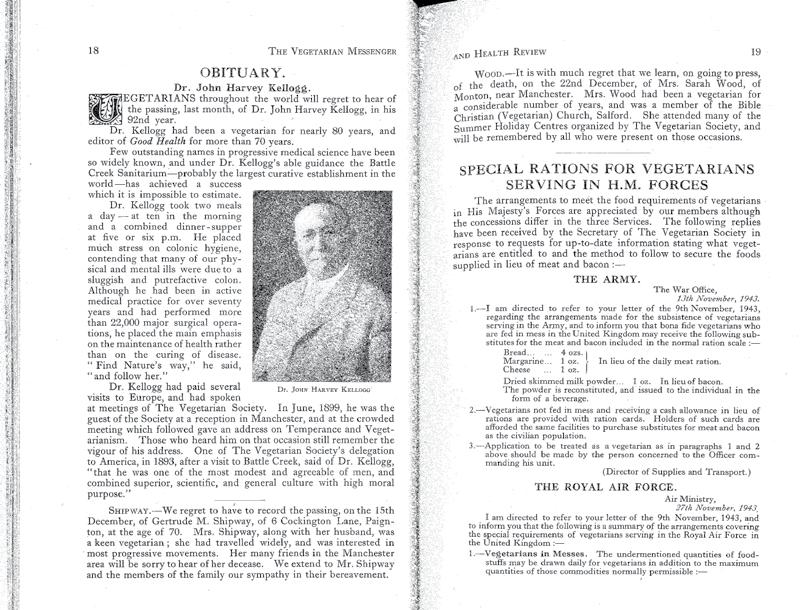
Details regarding how to obtain vegetarian rations

6 The Vegetarian Summer/Autumn 2023
Obituary for Dr John Harvey Kellogg in the Society’s journal
The Society published a letter from a dairy farmer named ‘Mrs Tuckey’ on the subject of ‘vegetarian farming’, in particular the life of the dairy cow and how intensive methods of milk production are harmful for the animal. It is interesting to note that Mrs Tuckey claims her cows provide good quantities of milk up to 15 years of age (compared to the average 3-to-5-year lifespan of a modern intensively milked dairy cow). Mrs Tuckey was writing in response to Donald Watson (founder of the Vegan Society but lifelong Vegetarian Society member) and his series of essays titled ‘Should Vegetarians Eat Dairy Produce’. At the end of the article are a number of obituaries reminding us that the war was still raging across Europe.

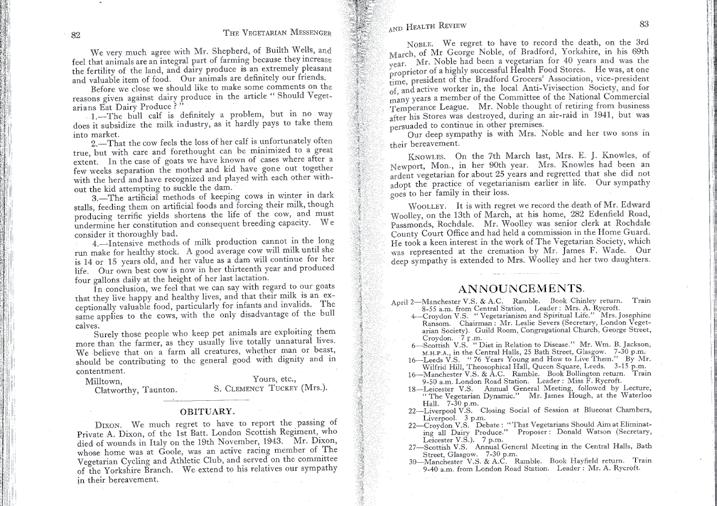
The Society also reported on Sir Albert Howard’s work on organic farming and soil health, recognising the risks from overapplication of artificial fertiliser on soil health and the need for more natural composts. Of course, soil health is a major topic of discussion today, with some experts warning that we have less than 60 harvests left.
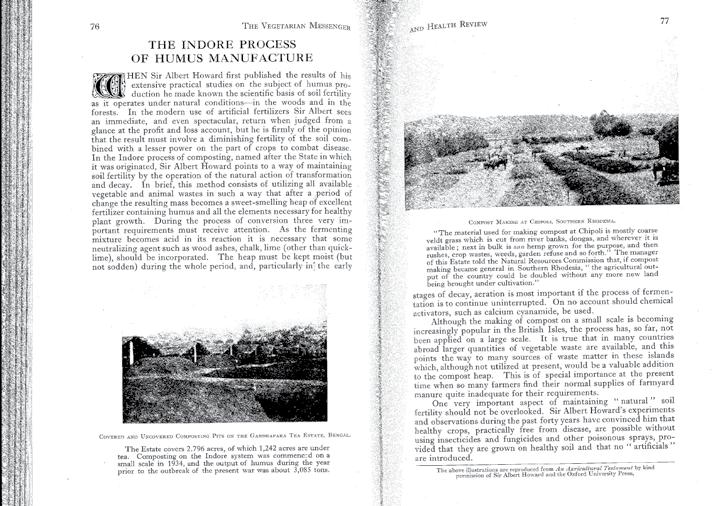
Summer/Autumn 2023 The Vegetarian 7
The Society reporting on organic farming and soil health
RIGHT TOP: Letter from dairy farmer ‘Mrs Tuckey’ on the subject of ‘vegetarian farming’
RIGHT BOTTOM:
A number of obituaries for Society members killed in the war
New staff
Becks Wood (Fundraising and Administration Officer)
Becks recently graduated from UCL in London with an MSc in Social and Cultural Anthropology. Growing up in rural Suffolk, she was surrounded by farming culture, and went vegetarian after making the connection between what we eat and where it comes from. She has now been vegetarian for around 10 years (including a year or so of being vegan).
In her spare time, she enjoys yoga, meditation, cooking, and being creative (especially through clay, crochet, and making clothes). She also loves to travel, spending time in New Zealand before the pandemic.

Lisa Williams (Business Development Officer)

Lisa has been in post since February this year, liaising with clients wishing to have their products accredited with the Vegetarian Society Approved vegetarian and vegan trademarks. She has previously worked in higher education, with the last 15 years managing GP placements for medical students based at Manchester University. Prior to higher education, Lisa worked for the Vegetarian Society and is thrilled to be back.
Lisa first became a vegetarian at the age of eight, after a family friend joked that the pie they had just eaten was 'Flopsy pie' – one of the pet rabbits. The joke struck a chord, and she made the decision not to eat any animals. She has now been vegan since January this year. Lisa has a keen interest in food and nutrition, and enjoys walking, cycling, camping, holidays, gardening and reading autobiographies.
“It’s fascinating to see how things have progressed while also keeping close to the charity’s roots”.
Legacies – a thank you
We wish to acknowledge and extend our gratitude to the wonderful people who each kindly left a gift in their Will to the Vegetarian Society. Our thanks to their families and loved ones too.
Mrs Janette Hill from Bridgnorth in Shropshire and Mrs Audrey Reat from Bexhill-on-Sea in East Sussex. Also Mr. David Lloyd from Bilston in the West Midlands, and Miss Joan Mulligan from Culrain, Ardgay in Scotland, who had been members of the Vegetarian Society since 1987 and 1999 respectively.
Their generosity will make a huge difference to, and help support, our future work as we campaign to make important changes happen, helping people, the planet, and animals.
Leaving a gift in your Will
After looking after loved ones, many people find that they can, and would like to, also support a cause that is meaningful to them. If you would like to leave a gift in your Will to help generations to come, the Vegetarian Society and the National Free Wills Network have partnered to provide you with the opportunity to create your Will free of charge. Any gift, large or small, really does make a difference to our work, as we endeavour to create a kinder world.
If you would like to know more, please contact us at writeyourwill@vegsoc.org
8 The Vegetarian Summer/Autumn 2023
“I like working for the Vegetarian Society because it offers the unique opportunity to work alongside people who share similar values. It also provides an exciting opportunity to raise funds and awareness for a cause I feel passionately about!”
The Gift of a Lifetime


Create your Will for FREE
Leaving a gift in your Will to the Vegetarian Society is the most powerful way to put your beliefs into action, protecting and creating a better world for future generations. The Vegetarian Society has partnered with the National Free Wills Network to give you the opportunity to create your Will for free.



Since 1847, supporters like you have played a vital role in funding the work we do and making the world a kinder place. Any gift that you decide to leave, large or small, will support our work for years to come, making sure your ideals live on.


All we ask is that once you’ve looked after your loved ones, you consider including a gift in your Will to support our future work too.

To find out more, visit: www.vegsoc.org/writeyourwill or email: writeyourwill@vegsoc.org








Summer 2023 The Vegetarian 9
This year, National Vegetarian Week focused on the climate crisis and the positive impact that our food choices can make. With a culinary feast of carbon-calculated recipes, the week highlighted the difference switching to veggie meals can make in reducing people’s personal carbon footprint. The campaign was sponsored for the third year running by Cauldron Foods - a perfect partner for National Vegetarian Week since their bestselling range is now completely carbon neutral. Here's how it all went…
People across the UK chose veggie food for the planet!
Over 17,000 people from all corners of the UK signed up to take part in this year’s National Vegetarian Week, and the combined pledges resulted in projected carbon emission savings equivalent to a staggering number of miles of driving!

On average, people pledged to try veggie food for three days
Even better, 97% of meat eaters who took part, pledged to incorporate more vegetarian and plantbased food into their diets...
...with over one in three participants (38%) expressing interest in adopting a vegetarian or vegan diet because of taking part.
With the carbon footprint of meat higher than almost all vegetarian and vegan foods available, having so many people cutting down on meat (or cutting it out altogether from now on) is a real positive impact – and, as you know, it’s one of the simplest ways anyone can help tackle climate change.
A Million Miles Better!
This year, we asked people to Make Your Meals Better By Miles! and shared a free digital guide, jam packed with inspiring info and favourite veggie recipes from celebrity chefs and food writers, perfect for celebrating National Vegetarian Week.
There was a nod to reducing food waste, such as eco-chef Tom Hunt’s Roasted Squash and Celery with Sour Cherries, Brazil Nuts and Aioli; and a cost-conscious but flavours punching Artichoke Paella from Miguel Barclay, one of the top budget chefs in the UK.
Thomasina Miers, cook and cofounder of Wahaca, treated us to smoky and zingy Chargrilled Courgettes with Whipped Feta and Blackened Chilli-Lime Dressing (page 58). And there were not one but two weekend ‘fakeaways’! Chef and presenter Simon Rimmer and daughter Flo shared a Halloumi and Cauliflower Curry (page 59) and from BOSH! there was a sticky, gooey and incredibly moreish Crispy Chilli Tofu (page 54).
From quick light bites like the Hairy Bikers’ savoury Asparagus and Ricotta Tart, to an adventurous Tofu, Dandelion and Pickled Apple dish from awardwinning chef Eddie Shepherd, there was an abundance of planet-friendly recipes.
To illustrate how much of a positive choice eating veggie can be, all the recipes in the booklet were carbon calculated by My Emissions, a leading provider of carbon emissions calculations and carbon labels for the food sector.
We also showed how much more carbon each recipe would produce if it were made with meat or fish instead of the main veggie ingredients. We converted the carbon savings of each recipe into an equivalent number of miles driven in a car... to demonstrate that by choosing veggie food, you can literally make your meals better by miles!
And the results were impressive… National Vegetarian Week really did make your meals better by miles… a million miles! Yes, you read that right! The carbon savings made by the participants of National Vegetarian Week this year were the equivalent of driving a car ONE MILLION MILES!
1,000,000
10 The Vegetarian Summer/Autumn 2023
"It’s great to be able to show the tangible impact of collective actions. If 17,000 individuals can save the carbon equivalent of one million miles of driving, imagine what could be possible if many more people swapped out meat for vegetarian and plant-based foods.”
– Richard McIlwain, Chief Executive of the Vegetarian Society
So many people helped spread the word!
As a vegetarian, you are already doing something great for the planet. That’s why we asked you, our members, to help encourage people to get involved by asking your friends, family, and colleagues (and everyone else!) to sign up too. And you certainly did! Thank you to every one of you who helped plant the seeds of success for this year’s campaign.
Of course, we also had a lot of famous faces support the week this year, which really helps get the vital veggie message across to more people....
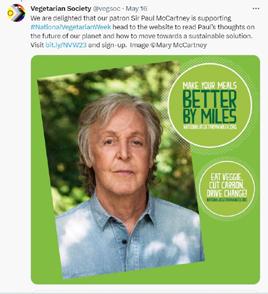
Chris Packham
Wildlife TV Presenter and conservationist Chris Packham encouraged people to sign up to take part in the week, with a lovely video, which you can view here www.vegsoc.org/chrispackhamfilm2023
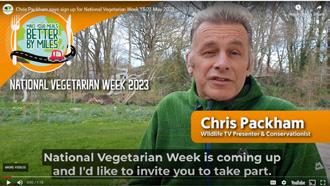
“In my view the future of our planet has to move towards a sustainable solution. The fact that meat and dairy production takes up so much land and water together, of course, with the cruelty to the animal involved, seems to me to point to the fact that a vegetarian and vegan way of life will be much better for us all in the long run. It is a wiser and kinder solution to the future of our world."
“I am delighted to be a supporter for the Vegetarian Society, helping inspire more meat-free eating.”
Local authorities joined in too
Building on the successes of last year, the week had the support of loads more local authorities, as they continue to work with partners and local communities to tackle the causes and impact of climate change.
With many local authorities having declared climate emergencies, they are very committed to doing all they can to help reduce carbon emissions in their areas – and National Vegetarian Week is a perfectly simple way to do this.
With the week garnering widespread support across the length and breadth of the UK, almost every local authority had someone participating – which is fantastic!
Lambeth Council backed the campaign, as it encouraged more people to visit local plant-based eateries, buy produce from local markets and enjoy getting creative with vegetarian cooking.
Councillors got involved by sharing their own veggie cook-ups on social media and supporting local with veggie lunchbreak outings. One councillor went to visit some of the local traders and cafés to get their veggie cooking tips, making a short film too, how brilliant!
Active on social media for the week, the Council also spread news of the campaign’s messages, wide and far within their local community. Their planned activity included mentioning the week through a climate newsletter, environmental groups, and a community garden, and by reaching out to young people and families too, via the Future Fit Schools Network and the youth council.
At Preston City Council, there was a wonderful blog, ‘Vegetarian Week at Preston Markets’, looking at the joys of shopping and eating local. Showcased
“I am pleased we are supporting National Vegetarian Week and offering support to local people who want to try and cut down how much meat they eat."
– Mary McCartney, photographer, director, food writer, TV presenter and global meat-free ambassador

cabinet member for Sustainable
Other celebrities doing their bit for National Vegetarian Week included Dame Joanna Lumley, award-winning TV presenter and author Michaela Strachan, actor and WWF ambassador, Cel Spellman… and many more!


were the veggie eatery options, as well as the excellent fruit and veg stalls, and a call to get creative in the kitchen with a variety of produce, such as nuts, peas, spices, fresh okra, ripe plantain, and cassava.
Over at Blackpool Council, students at Blackpool and The Fylde College cooked up some locally grown fresh herbs and fabulously named vegetables such as rainbow chard, cavolo nero and Egyptian walking onions, courtesy of local community charity @TheGrange community hub, run by Groundwork on behalf of Blackpool Council.
It was great to work with these and so many more local authorities this National Vegetarian Week, and to show our support too, for all the work being done to help reduce carbon emissions across their local communities.
Summer/Autumn 2023 The Vegetarian 11
– Sir Paul McCartney
Food for Thought: a special launch event
National Vegetarian Week had a launch event in County Durham in appreciation of the local authority’s desire to promote environmentally friendly food choices and carbon calculations on menus. In partnership with Durham County Council, and REfUSE Café, who raise awareness and educate about the climate and ecological impact of food waste, attendees including Young MasterChef finalist and vegan chef Jordan Pomerance, enjoyed a very special evening.
At the ‘Food for Thought’ event, they were served up a tasty meal with a difference. For each dish, the carbon emissions were calculated and converted into car miles equivalent, and diners paid £1 per car mile to show them the true cost of the food we eat. A most delicious and truly eye-opening evening.
Plant-Based Week – growing a new partnership
This year, Public Sector Catering ran a ‘Plant-Based Week’ that coincided with National Vegetarian Week. The Vegetarian Society and Public Sector Catering magazine both helped amplify the important veggie message by supporting and sharing information about each other’s activities.

Plant-Based Week ran from May 15 – 19 and the theme this year was ‘Be a Plant-Based Hero’, encouraging caterers to nominate individuals and teams who are helping lead the way.

A highlight of the week was a live webinar hosted by Public Sector Catering, looking at how public sector caterers can use menu development to achieve net zero targets. Richard McIlwain, Chief Executive of the Vegetarian Society, joined other industry experts in the debate, including Tony Mulgrew, the awardwinning catering manager from Ravenscliffe School, to discuss the short-term challenges and solutions to putting plant-based dishes on menus, and to explore how the public sector makes the transition longerterm to a predominantly plant-based offer.
Plant-Based Week also showcased daily video cooking demos, including one with Head of the Vegetarian Society Cookery School, Sam Linford-Platt, presenting to public sector caterers.
A taster of National Vegetarian Week in the news
National Vegetarian Week always grabs the imagination of the UK media!
In the national newspapers, The Sun shared three great recipes from the cookbook Spice Kitchen: Vibrant Recipes and Spice Blends for The Home Cook by Sanjay Aggarwal. Kirsty Spence, Food Editor at The Sun’s Fabulous magazine, shared recipes from TV chef Dean Edwards, in celebration of the joys of spring greens.
In The Independent , Desert Island Dishes podcast host Margie Nomura shared her recipe for whole roasted cauliflower, so readers could impress their friends this National Vegetarian Week and beyond.
Whilst there was plenty of national coverage, regional and local newspapers also embraced the campaign. The Argus reported on the ‘Tik Tok halloumi gyros’, a vegetarian dish hugely popular on the social media app and recommending it as a great recipe
to try for National Vegetarian Week, whilst The Herald focused on where to treat yourself to excellent plant-based food in Glasgow and Edinburgh. Finally, several trade publications picked up on the week, such as The Grocer, who mentioned National Vegetarian Week in their article about plant-based Beyond Meat’s launch of a range of frozen ready meals.
A new UK-wide survey, commissioned from YouGov by the Vegetarian Society, has found that over half of all young adults agreed that they would choose to eat more sustainably if carbon footprint labelling was included on food packaging , with mentions by Packaging Scotland magazine amongst others.
Leading professional memberships body LACA , representing the school food sector and the country’s largest provider of school catering, also picked up the survey results, as did TUCO,
representing in-house caterers, who chose to mention in their magazine, some of the amazing celebrity chefs who shared their recipes for the week.
Beyond the trade press, the YouGov survey was also reported on in First News, a UK newspaper designed for children aged seven to 14. It highlighted that the survey found carbon footprint labelling could help reduce the eating of high carbon foods like beef and lamb, and that young adults would choose a more environmentally friendly diet if they knew the carbon footprint of their food.
OOH magazine, covering the foodto-go industry, also gave the week a shout with both an article and listing in their diary dates section, as did Chippy Chat. Serving up info to the UK café sector, Café Life magazine commented on the cost-effectiveness of the demand for vegan and vegetarian options.
12 The Vegetarian Summer/Autumn 2023
National Vegetarian Week social media highlights
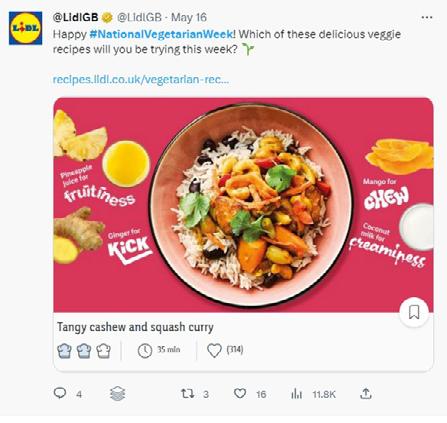
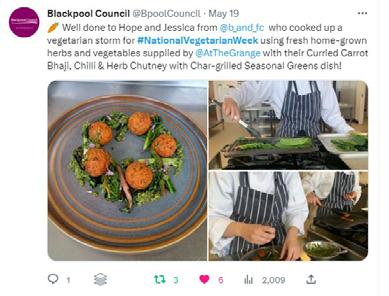
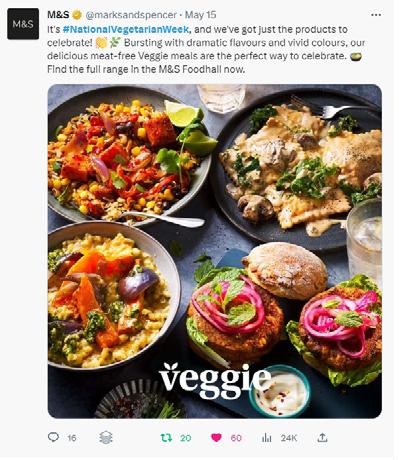
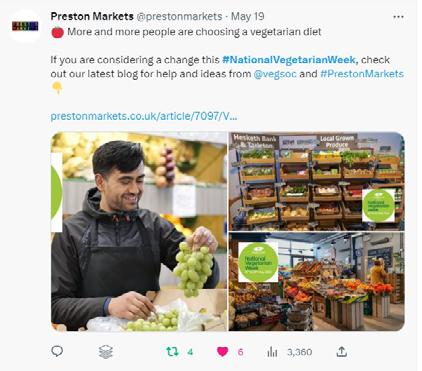
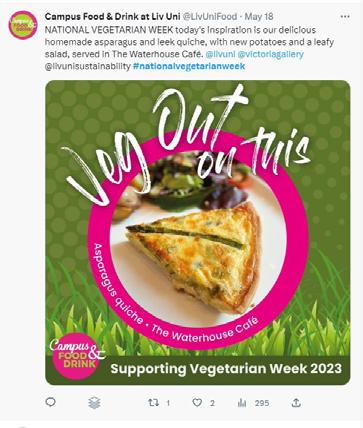

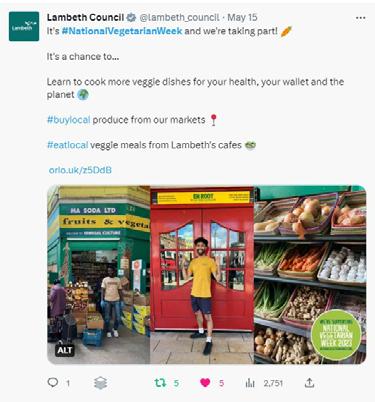
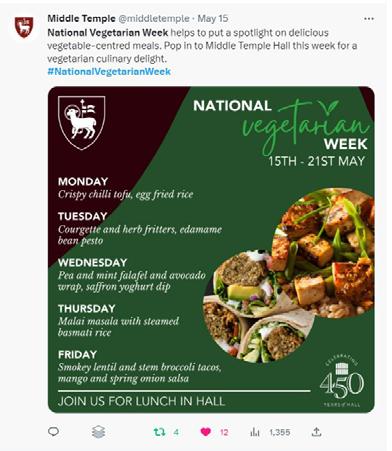
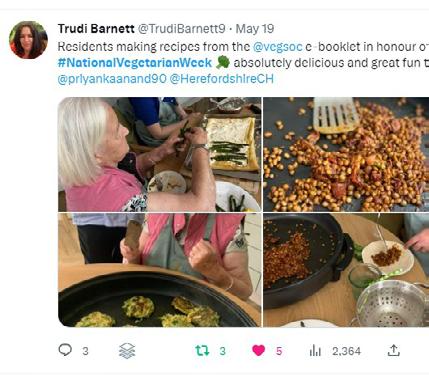
































The week saw many businesses, restaurants, schools, and universities up and down the country, using the #NationalVegetarianWeek and dishing up delicious veggie menus, products, special offers and competitions.

Summer/Autumn 2023 The Vegetarian 13
Spotted out and about ...
For the first time the campaign featured on Out of Home media at over 1,000 sites across the UK. It was fantastic to work with Clear Channel to help get the veggie message out on the streets, to even more people!

Offers, mouthwatering menus and comps galore!

National Vegetarian Week was bursting with prize draws and we'd like to say a huge thank you to our partners for donating a brilliant bundle of prizes. Russell Hobbs, Las Iguanas, vegan chefs and best-selling authors BOSH!, horticulturalist and author Charles Dowding , natural Turkish Delight and luxury confectioners Truede, and lowwaste chef and award-winning author
Max La Manna
And finally, a big thank you to our sponsor...
We’d like to say an extra special thank you to Cauldron Foods, for sponsoring National Vegetarian Week 2023. Cauldron shared some fab recipes for the week; do try out their one-pot wonder Boston Beans and Sausage Casserole recipe (page 57), using their re-launched fanfavourite Cumberland and Lincolnshire Vegetarian Sausages!
Cauldron’s plant-based goodies also went down a treat with wildlife TV presenter, conservationist, and National Vegetarian Week supporter, Chris Packham, who enjoyed their delicious Vegan Falafel Buddha Bowl recipe.
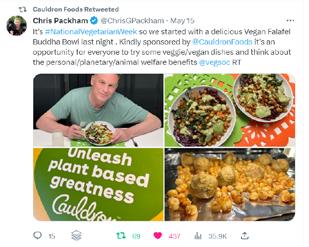
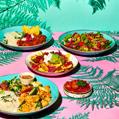
Sixty seconds with…

We chatted with some of our National Vegetarian Week supporters about their go-to veggie meals, their dream dinner guest and why they love to get involved…
Anna Jones
Cook, writer, best-selling author

My go-to veggie meal is… Black bean taco bowls.
My one piece of advice for new veggies is… Get good at five recipes you love and that are cheap and easy to make.
I’d love to go for a veggie dinner with… Drew Barrymore.
My top tip for getting more veggie food into your diet is… Celebrate each vegetable as it comes into season by cooking with it when it tastes at its best.
I support National Vegetarian Week because…
Eating without meat and fish and with more focus on plants is the way forward for ourselves, our bodies and the planet.
14 The Vegetarian Summer/Autumn 2023
BOSH! bumper book bundle Russell Hobbs Satisfry Air & Grill Multi Cooker! £100 Las Iguanas voucher! …and more! win!
Photo by: Issy Croker
For more 60 second interviews with our National Vegetarian Week supporters, visit www.vegsoc.org/lifestyle
My go-to veggie meal is…
Our feta and spinach pie at Greens – layers of filo, caramelised onions, pistachios, feta and served with roasted veg and honey. Cannot be beaten.
My one piece of advice for new veggies is…
Don’t try and replace meat but celebrate the joy of veg. Roast veg, experiment with pulses and grains. Make sauces.
I’d love to go for a veggie dinner with…
Stanley Tucci - he was on Sunday Brunch and is a foodaholic - I’d love to cook my fave dishes for him - he can bring the wine.
My top tip for getting more veggie food into your diet is… Reduce the % of meat on your plate and up the veg. Treat the veg with respect and learn how it behaves if you fry, roast, boil, pickle.
I support National Vegetarian Week because…
I’ve owned Greens for 33 years and every year this week becomes more exciting and celebratory. I’m proud to have been a veg restaurant owner for so long.
Annabelle Randles Founder of The Flexitarian, cook and food writer


My go-to veggie meal is… Anything on or wrapped in flatbread (grilled veg, chickpea curry, houmous etc…)
My one piece of advice for new veggies is… Make changes at your pace, don’t be too hard on yourself and have fun!
I’d love to go for a veggie dinner with…
Dame Joanna Lumley and Deborah Meaden who I both admire for their animal welfare activism.
My top tip for getting more veggie food into your diet is… Explore different world cuisines, there is so much out there to enjoy.
I support National Vegetarian Week because… It is a fantastic opportunity to challenge yourself to make plants centre stage for a week. Reducing the amount of meat in our diet benefits our health and the health of the planet.
My go-to veggie meal is…
Tofu butter chicken. It’s a fan favourite, this one has been one of my most popular dishes – over 4 million views on social media. Pressing the tofu removes excess water and then coating it in cornflour gives it a thin crunchy exterior when it’s baked until golden in the oven. Paired with a vibrant, creamy sauce, it’s a winner-winner, tofu chicken dinner!
My one piece of advice for new veggies is…
Have your go-to dishes, but experiment and have fun with trying new dishes.
I’d love to go for a veggie dinner with…
Nigella Lawson.
My top tip for getting more veggie food into your diet is… Incorporate them at the start of your day. From green smoothies to adding blended up spinach in your pancake batter, I think getting your veggies in at the start of the day is the best way, so you don’t have to think about it later on.

I support National Vegetarian Week because…
More plants on your plate are better for you, and the planet.
Summer/Autumn 2023 The Vegetarian 15
Simon Rimmer
Chef, presenter, restaurant owner
Max La Manna
Low-waste chef, award-winning author
Photo by: Lydia Wakelam
Photo by: Annabelle Randles
Photo by: Lizzy Mayson
Meeting Michaela Strachan
We catch up with Michaela Strachan, award-winning TV presenter and author, and one of our supporters of National Vegetarian Week this year...
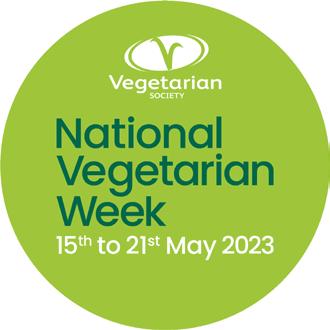

When did you first become vegetarian and what motivated you to give up meat?
I first became a veggie at age seventeen. I was motivated after watching a video showing the transportation and slaughter of factory farmed animals. I didn’t want to contribute to that sort of cruelty.
Has your motivation changed over the years?
It has. Now, sustainability is the driving force for me. It is so much more efficient to use a piece of land to grow a plantbased diet rather than a meat-based diet. The world population is constantly growing. If at least some of us go plantbased or reduce meat consumption, we would need less farmed land and hopefully be able to protect more wild areas. Eating fish has become completely
unsustainable. I don’t think we realise just how much damage overfishing has done.
You live in Cape Town, South Africa – a country which appears to love its meat. Does living there bring any specific challenges in maintaining a veggie diet?
South Africa has some great restaurants and although it’s well known for its steaks and biltong, Cape Town, where I live, is extremely progressive. It has been easy to be a vegetarian and particularly easy to buy vegetarian and vegan alternatives in the supermarkets. Most coffee shops have plant-based milk, and the popularity has really grown. Having said that, in rural areas it’s definitely not as easy. But people have always [accommodated me]
wherever I have travelled within the country.
If you were marooned on a desert island and could have just one dish every day, what would it be?
Pad Thai.
16 The Vegetarian Summer/Autumn 2023
© Benjamin Harris
You have been a familiar face on a whole range of TV wildlife programmes including The Really Wild Show, Countryfile and Springwatch. Do you think these programmes are now having to adapt – in showing not just the beauty and wonder of the natural world, but the serious impact we are having on it? Without a doubt. But programmes have to be clever, as nobody wants to be preached at and nobody wants to watch programmes full of doom and gloom. The first challenge is to inspire and make people appreciate what we have, then show the threats and damage and if possible, what people can do to make a difference. Making people feel completely helpless and disempowered doesn’t help anyone. It is challenging though as there is a huge amount of negative information and depressing statistics, of course we have to be realistic, but we also have to give hope and sometimes that is a very hard balance.
You’ve come across so many different animals in your career. Which have you felt the most connection with?
Orangutans. I filmed two series of Orangutan Diaries for the BBC and spent a lot of time with orphaned orangutans. There are so many similarities between them and us and with some of the orphans, I felt a real connection. There was one in particular called Lomon who I helped nurse back to health. When we went back to film the second series, Lomon definitely recognised me, came to sit next to me and put his arm around me. There was so much recognition in those eyes. It was really touching.
You seem to have a lot of fun on Springwatch and Autumnwatch alongside Chris and Iolo – is it as fun as it looks behind the scenes and what is the catering like on set?
The Watches are a lot of fun, but they are also hard work. No one realises how much work goes into each programme and that’s the way it should be. It should look effortless, but it takes a lot of work to make it look that way! Catering is usually excellent and there is always a vegetarian or vegan option, and we have meatless Mondays for the whole crew.
You’ve travelled to many different places. Where is the best view to sit and have a picnic?
The top of Table Mountain on a sunset/ full moon evening. Definitely with a bottle of Chardonnay.
Which three essential items do you always pack in your travel bag?
Binoculars, trainers, contact lenses!
What do you think holds people back from giving up meat – and how might we inspire more people to become veggie?
I think it’s incredibly encouraging just how popular eating less meat has become. The rise of dairy alternatives has been astonishing. In many places, oat milk is almost normal. When I
became a vegetarian it was really hard, 40 years ago there were few options. I even tried to give up dairy all those years ago but found it almost impossible when I was on the road and instead of my health benefitting, it definitely made my health worse as there was so little, if any, choice.
But things have changed dramatically. Now in the UK, there is always a choice. I’m amazed at the choice in service stations for instance. You used to be lucky to get a white bread cheese sandwich. Now you can get a quinoa salad with pomegranate dressing. Who would’ve thought! The best way to start is to do a meatless Monday, get inspiration for recipes online, then add a plant-based Friday, a veggie Wednesday, before you know it, you’ll have halved your meat consumption and you’ll keep going until you’re a full vegetarian. And like me, you’ll never look back!
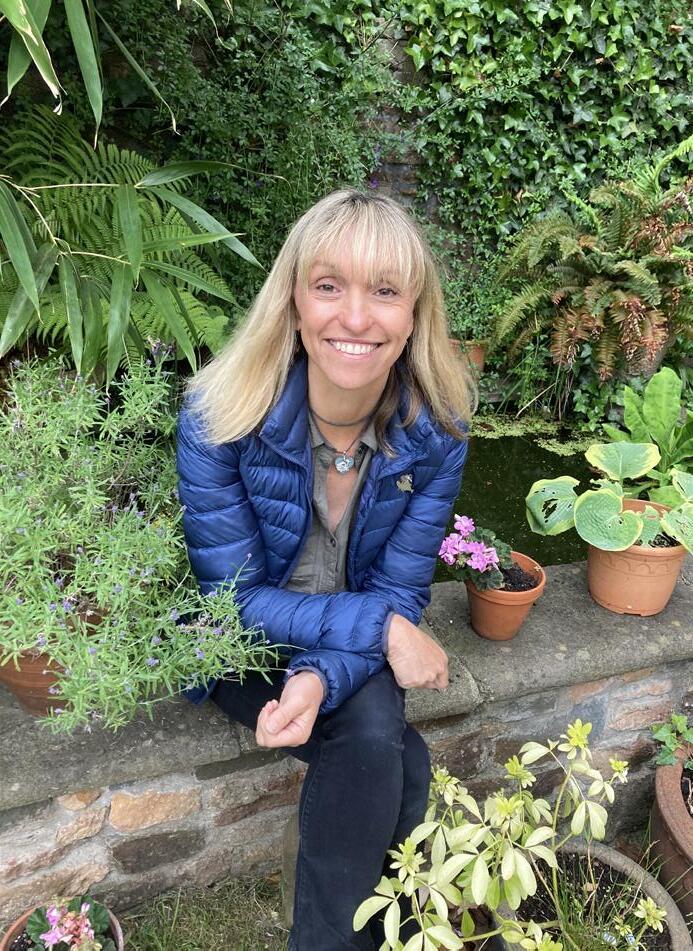
Summer/Autumn 2023 The Vegetarian 17
A 'meaty' subject for debate
In recent weeks, the US Department of Agriculture has formally approved the sale of lab-grown chicken produced by two companies, Upside Foods and Good Meat.
While such ‘meats’ are already available in low-regulation regimes such as Singapore, the fact that these products can now be sold in the US feels like a major step forward.
But how should we react to these developments, particularly when many vegetarians and vegans object to eating any form of meat? Our Chief Executive Richard McIlwain explored this in a blog.
“The first thing to say is that this new product is definitely comprised of animal cells,” Richard wrote. “An initial needle biopsy provides the necessary cells which can then be cultivated in the lab. Businesses seek to create infinite cell lines, i.e., selecting or modifying cells such that they continually divide and grow, which prevents having to constantly biopsy an animal. In this way, a single animal is required to provide the initial cells from which apparently endless quantities of meat can be cultured.
“Of course, the reality is not quite so straightforward. In truth, many animals will be needed in order to assess and test which cells are most useful, not
only in terms of growth but in terms of the taste and texture of meat. In theory, once a suitable group of cells has been chosen, growth using infinite cell lines in a laboratory should become a reality and animals will no longer be required.
“Secondly, the cells require nutrients in order to grow, just as they do when still within the animal. The cells are bathed in a growth medium comprising a wide variety of nutrients and amino acids. This medium could be adjusted to provide particular nutritional profiles for health. Up until recently, the growth medium of choice was foetal bovine serum drawn from the foetus of pregnant cows at abattoirs: clearly not something any vegetarian or vegan could support. However, serum-free growth media are now available; in fact, Upside Foods developed their own, as have many other companies globally.
“Thirdly, it does appear that over time as these foods scale, they could be produced using power from a green energy grid and with a substantially smaller land use footprint than traditional agriculture. They would also overcome the risks associated with intensive animal farming, such as antibiotic resistance and zoonotic disease.
“Finally, on the question of health, the jury is out. The debate on whether cultivated meat is healthy or at least
healthier than meat, is unlikely to be conclusively answered soon.
“Should vegetarians and vegans be supportive of cultivated meat? We suspect the answer is a tentative ‘yes’. While we may choose not to eat it, it does appear to provide a cruelty-free alternative for those meat eaters who simply refuse to entertain the idea of cutting down or cutting out meat. This is particularly the case for processed meats, if costs can be reduced over time as the industry matures (at the moment, it’s targeted at high-end restaurants). Whether the technology can recreate a T-bone steak is another matter altogether…
“As we strive for a slaughter-free food system which limits our impact on climate and biodiversity, it appears we should support this technology, even if we would never class it as vegetarian or vegan.”
What impact do you think this decision to allow the sale of lab-grown meat might have, and should vegetarians and vegans support this novel food? Let us know your views by dropping us an email at hello@vegsoc.org or in writing to our head office.
We’ll aim to publish your responses in an upcoming members’ magazine.

18 The Vegetarian Summer/Autumn 2023 News
'Brave thinking needed' to wean UK off meat
World Environment Day, the United Nations' annual outreach day for environmental protection, took place in early June.
Writing to mark the day, our Chief Executive Richard McIlwain explored how we need the right political leadership for the UK to wean itself off meat and head into a better, more environmentally conscious future.
“Switching to sustainable energy and sustainable land use will together make by far the biggest differences to our
heating climate and our biodiversity crisis,” Richard wrote. “Both of these are potentially existential threats, particularly for the many people living in poverty in the Global South.
“Rather than discussing the merits of [electric vehicles], I’m more interested in how we decarbonise our entire energy generation and supply system. And we need an urgent focus on land use and agriculture. We need to stop skirting around the edges of the argument, afraid of upsetting vested interests or being accused of ‘nanny statism’ in defining what we should be eating.
“In my opinion, Denmark leads the way here. They have modelled the costs to the country associated with poor diet, developed a plant-based reference diet for Denmark based on the EAT-Lancet Planetary Health Plate, and the government is investing 1.25
Help us receive a £1,000 grant by nominating now!
The Benefact Group are currently running the Movement for Good Awards, their annual programme of giving. This year, they'll be giving over £1 million to charities and good causes.
You can help us be in with a chance of receiving a £1,000 grant by nominating us! Simply fill in a short form to help us get into the draw. We're charity number 259358.
The more nominations we get, the greater our chances of winning, so please nominate us and spread the word!
You can nominate us for the grant by visiting www.movementforgood.com
Have you ever Meta better trustee?
We’re currently in the process of moving office, and Meta has kindly donated some office desks and chairs to us for use in our new premises!
This donation was secured through our trustee Tobias Azizah, an International Food and Beverage Manager for Meta who we interviewed in a previous issue of The Vegetarian. These new desks and chairs will go a long way to helping us settle into our new workspace. Thanks Tobias!
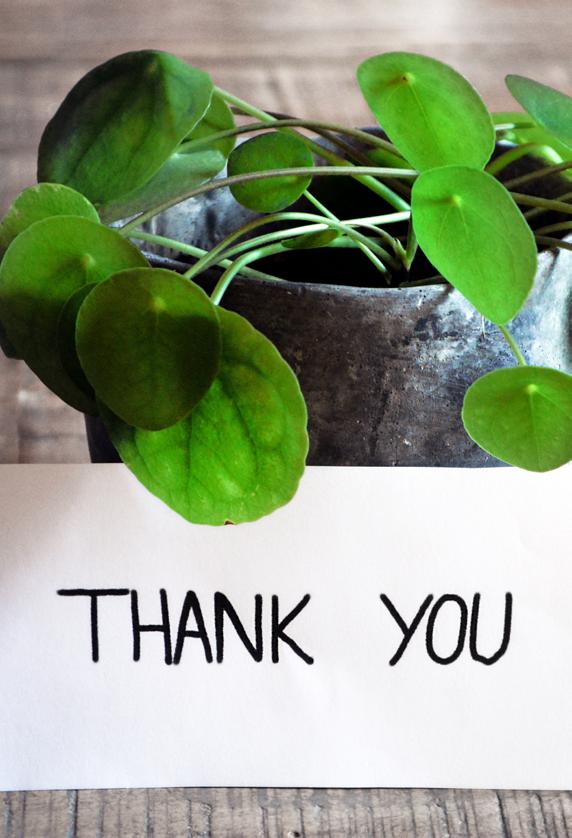
billion krone into the development of new plant-based foods across the whole supply chain – from which crops should be grown, to the processing plants required, and the need to take into account consumer demands for taste and texture.
“It definitely feels to me that we can deploy the blueprint provided by our friends in Denmark as a road map for how the UK might wean itself off meat. It’s certainly one the Vegetarian Society of the UK is looking at and thinking about how it could inform policy over here.
“In conclusion, with time for action running out, we need the right action, not just any action. Twentieth century solutions to 21st century challenges don’t wash. We need to be brave and radical in our thinking. Britain could lead the way if only we can get the right political leadership to turbo-charge us into a better future.”
Summer/Autumn 2023 The Vegetarian 19
Earth Day lessons: let's eat more plants
The last year has seen global conferences on climate (COP27) and biodiversity (COP15), and the UN's latest Synthesis Report which lays out what we can do to limit the worst effects of climate change.
However, when it comes to climate action, measures such as switching to electric cars or recycling more seem like mere tinkering around the edges.
Writing for Earth Day on 22 April, Richard McIlwain, Chief Executive of the Vegetarian Society, explored how revamping our food system is the game changer we need to curb our carbon emissions.

“In March the UN issued their Synthesis Report, which had a dull title but headline-making content,” Richard wrote. “Nothing was new, except the urgency of tone and the array of charts showing the devastation that will be
wreaked if we don’t start curbing our carbon emissions, and fast.
forest cover and carbon sequestration can be driven and underpinned by a global shift to a more sustainable diet — predominantly a plant-based diet and certainly one which doesn’t include meat from animals. It follows that decarbonising our energy supply and revamping our food system should be up in lights as the game changers we need, not switching to electric cars or recycling more.
“One chart was of real interest for me, and anyone else with an interest in the food that we eat. It shows that land management, agriculture and land use are on a par with the global energy supply system when it comes to the potential to reduce carbon emissions and limit our exposure to the worst impacts of climate change.
“When it comes to this section, it’s clear (to me anyway) that all of the gains in ecosystem restoration, increased
“If we are running out of time, as the UN Synthesis Report makes clear, then we need two things: urgency of action, and focus,” Richard wrote. “It’s no good learning to mend a hole in your pants or picking up a bag of litter if we aren’t also laser-focused on the issues that stand to deliver most for our planet.
"Therefore, you can expect to see the Vegetarian Society becoming more vocal on this issue as we advocate for a transformation in our food system.”
The Vegetarian Society... on TV!
Back in autumn 2021, we were asked to take part in a segment as part of the BBC series Inside The Factory. Eighteen months on, the segment finally aired! While the episode was largely about vegan sausages, you can see our Chief Executive, Richard McIlwain, speaking with historian Ruth Goodman about the birth of the vegetarian movement in Britain. You can watch the episode by heading to BBC iPlayer and searching for “Inside the Factory: Series 7: Vegan Sausages”. The episode will be available to view until spring 2024.
20 The Vegetarian Summer/Autumn 2023
"You can expect to see the Vegetarian Society becoming more vocal on this issue as we advocate for a transformation in our food system.”
We’re back at the Great British Food Festival!
With summer now well underway, the Vegetarian Society Cookery School is back on the festival circuit with the Great British Food Festival.
The Great British Food Festival combines the nation’s love of great food and drink with some of the country’s most treasured locations, providing a unique opportunity to explore new flavours and beautiful venues, all at the same time.
We were delighted to meet people at Trentham Gardens in Staffordshire in late April, where attendees got to see us share some of our favourite recipes in the Chef Demo tent.
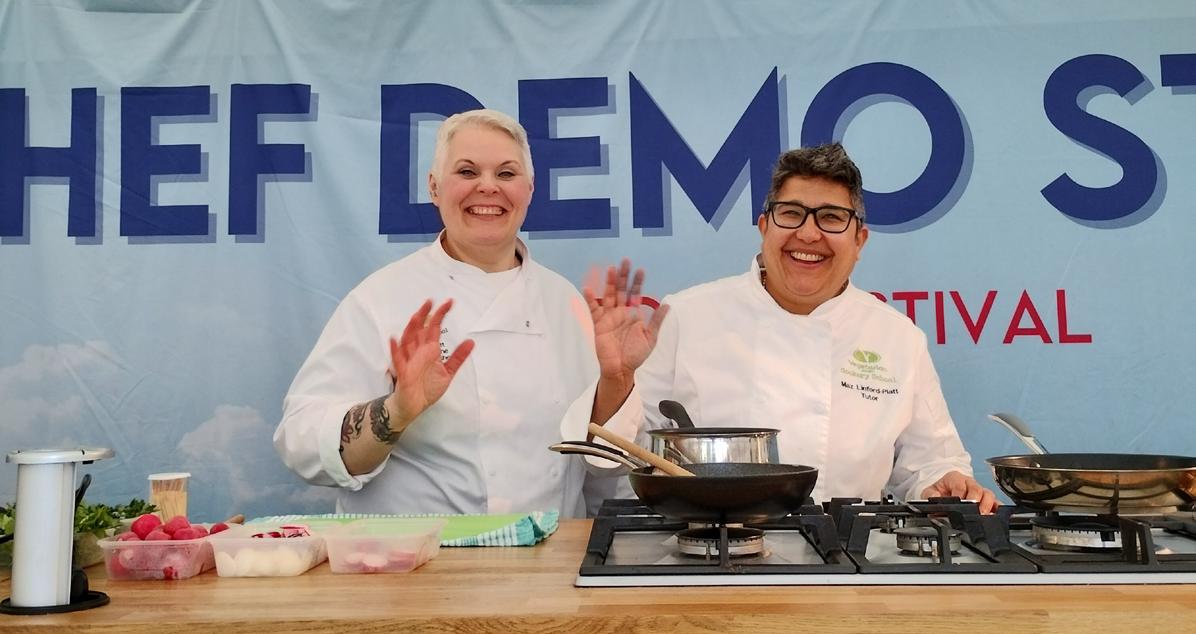
We'll be at several Great British Food Festival events over the coming months. Our next event is on Saturday 19th and Sunday 20th August at Wentworth Woodhouse in Yorkshire. Pop along and pick up some great tips and hacks with seasonal veggies.
We hope to see you this summer!
The North's best young veggie chefs
Over the last few months, we've been working with the International Wine and Food Society sponsoring their Vegetarian Chef Competition.
The contest showcased talented young chefs from six Northern catering colleges tasked with creating the best vegetarian dish with a given set of ingredients.
The contest saw heats take place in February and March, with the grand final held at Warrington College in April. The winners were announced at a prestigious awards lunch at Bolton College in May.
Pictured below from left to right are: Sam Linford-Platt, Head of the Vegetarian Society Cookery School, who helped judge and present the awards, Ethan Dowson, who finished in third place, Caitlin Clark, who came second, and Sabah Shah, who was named the overall winner.

Congratulations to all three winners!
Exciting times for our cookery school...
The Vegetarian Society Cookery School have something extremely exciting on the horizon and we are busy planning and developing our next steps behind the scenes.
We are moving away from our current location, and because of this, we won’t be advertising regular classes for a little while. However, rest assured that we will be back soon.
When preparations for our new home are in place, we’ll let everyone know!
Summer/Autumn 2023 The Vegetarian 21
What do vegetarians and vegans look for when shopping?
A new 2023 survey shows that one in three shoppers (34%) across the UK now look for an on-pack vegetarian or vegan symbol when trying to figure out whether a product is free from animal products.
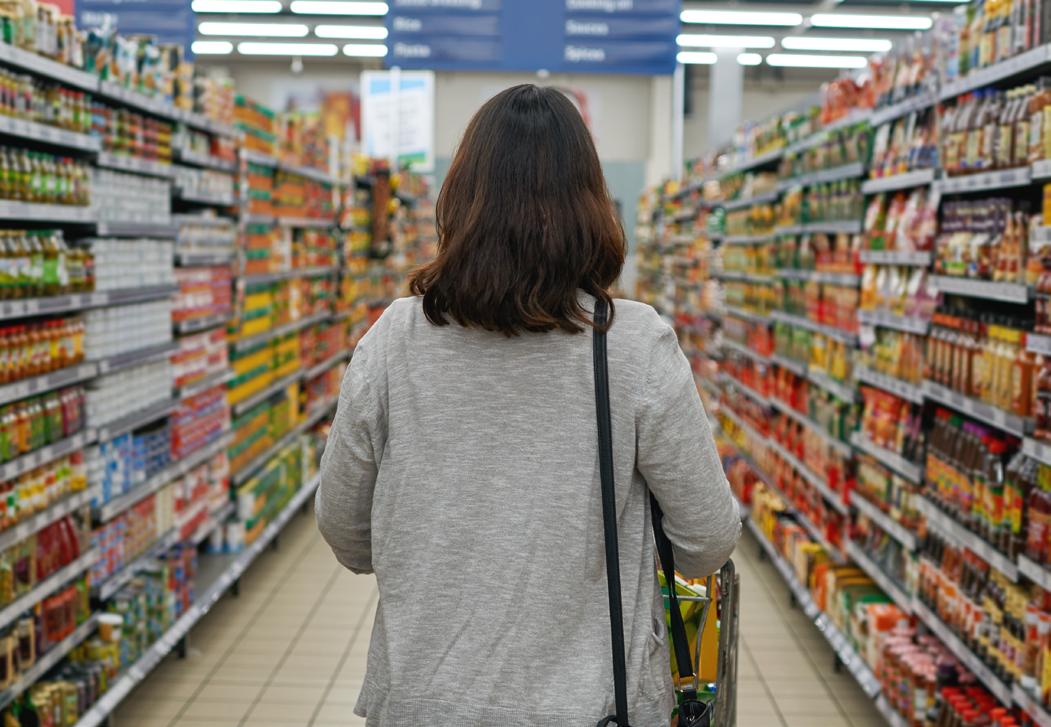
With the plant-based sector in the UK and EU forecast to grow from £3.9bn in 2019 to £6.6bn in 2025, and more people actively looking to reduce meat in their diet, it’s therefore critical that veggie and plant-based food manufacturers make their products and brands stand out and appeal to shoppers, who will often make quick purchasing decisions in store.
While supermarkets and manufacturers may choose to develop and use their own labelling schemes, this latest survey suggests that the Vegetarian Society’s accredited trademark labels are already familiar to over a third of all shoppers (37%). And when it comes to vegetarian and vegan consumers, almost eight out of
10 (77%) reported that they often or always check for a Vegetarian Society label before making a purchasing decision.
This suggests that the choice of label on new product lines could be critical for sales.
Vanessa Brown, Head of Business at the Vegetarian Society, said: “For over 30 years our trademarks have been helping consumers to choose your products when they’re shopping. We accredit a wide range of vegetarian and vegan products and services, from food to clothes to household items to restaurant menus. Chances are you can add one of our trademarks, giving your business a boost!”
If you run a business, or manufacture products, to find out whether you could be eligible for a Vegetarian Society Approved vegetarian or vegan trademark label, go to: www.vegsoc.org/getatrademark
Our trademarks ...up in lights!
We recently teamed up with Clear Channel to promote our Vegetarian Society Approved trademarks on their digital panels across the UK.
We’re excited for people to see our ads, so please keep an eye out for them! If you see one of our ads in the wild, why not grab a photo and tag us on social media?

22 The Vegetarian Summer/Autumn 2023
Ask the Dietitian: Healthy eating for children
It can be hard to know what foods children need to eat to stay healthy, especially if they are vegetarian or vegan. Registered dietitian Rachael Hunter outlines the key nutritional needs.

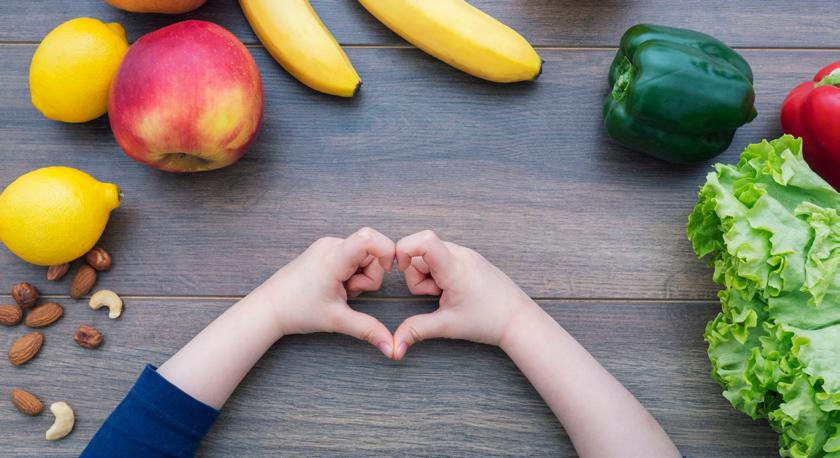
Role modelling
It makes sense that children learn from what they see around them, so if we eat a healthy balanced diet, they are more likely to follow in our footsteps. Eating together is a great way to show children healthy eating habits in action. This might include sitting at a table together rather than in front of the television, possibly involving them in the cooking beforehand, and even, at this time of year, growing some of the vegetables. This is also a great way to expose them to new foods. It is common for some children to become fixed on only liking certain things. Eating together is an easy way of introducing them to different foods, as they will not only see you eating a variety of foods, but they will also have the opportunity to try them.
All about balance
Just like with adults, it is good for school-aged children to have a regular meal pattern: for example, three meals and two snacks a day. Prioritising fruits and vegetables at snack time will make sure they get a good dose of vitamins and fibre, and choosing these foods rather than grazing on snacks with lots
of added sugar is also better for their teeth.
Main meals should consist of a carbohydrate (e.g. pasta, rice, potatoes), protein (e.g. beans, pulses, lentils, tofu) and vegetables. Children’s stomachs are smaller than those of adults, so they will need smaller portions. It can help to serve a child’s portion on a side plate rather than an adult-sized plate so it still looks full, and if they are still hungry at the end of the meal they can have the option of seconds. Some of us will have been brought up to finish everything on our plate, but it is important not to force children to do this so that they can learn to listen to their body when it tells them they are full.
Calcium
Children’s bones are still growing and developing, so it is important they have enough calcium. Aim for around three portions a day: for example, a small glass of milk, a yoghurt, and a small, matchbox-sized piece of cheese. Plantbased milks often have calcium added now, but it is always good to doublecheck the label.
Quick tips
• Have a family fruit bowl that children can access.
• Foods like fruit salad can be made with a mix of fresh, frozen, and tinned varieties and be kept in the fridge for an easy snack or dessert. Carrots can also be chopped into sticks and kept in the fridge. Storing them in the water will help to keep them fresh.
• If your child is having sugary drinks (including fruit juice), keep them to mealtimes to help protect their teeth.
• Think about the language we use around food. Are we using highsugar and high-fat foods as a treat or reward, but also calling them bad? Aim to talk about food in more neutral terms. No food is all good or all bad: it is simply nutrition.
• Have patience! Supporting children to eat a balanced diet can be challenging, particularly if they were not weaned to be vegetarian. We all need to taste new foods several times before we start to accept them. Small steps along the way might even be putting a new food to their lips: this is all progress.
Summer/Autumn 2023 The Vegetarian 23
Persuading councils to lead the way: campaigning with Plant-Based Councils
By Linda Newbery, author,
animal and environmental campaigner and regional co-ordinator for Plant-Based Councils.
“There’s no question that the current food system poses an existential threat to humanity.” You might assume that this statement came from Extinction Rebellion, Animal Rising or the Vegetarian or Vegan Society – but no. It was from James Bailey, CEO of Waitrose. He added, “All supermarket bosses are aware of the need to change. There’s no if.”
James Bailey was speaking at the Extinction or Regeneration Conference recently hosted by Compassion in World Farming and IPES (International Panel of Experts on Sustainability). Speaker after speaker highlighted not only the urgent need but the possibility of change towards more sustainable farming and eating.
So why, with such convincing and growing evidence, is change so slow to happen? “Revolution in our food system will only happen when customers ask for it and are prepared to pay for it,” James Bailey said. “Attitude shifts can take a very long time.”
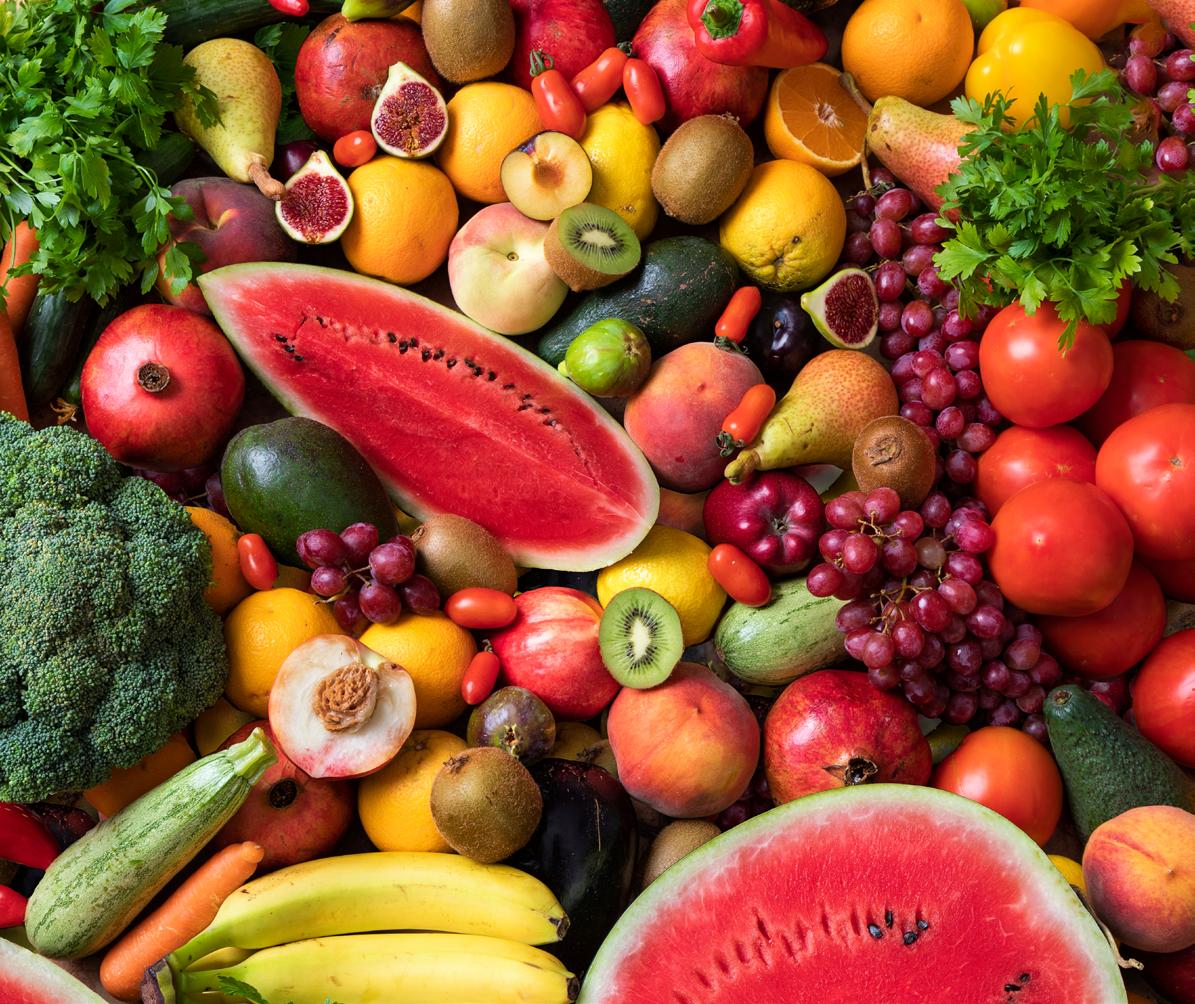
That’s all too true. Anyone who uses social media for campaigning will be used to the torrent of abuse and ridicule that follows any suggestion that we should reduce meat and dairy products in our diets. For many people, the notion of cutting down (let alone cutting out) meat is still extremist, wacky, hippy, etc – and many remain unaware of the impact of food choices on our individual carbon footprints. Tradition, culture, habit and convenience erect powerful barriers against logic, morality and environmental sense.
So, if behavioural change is going to happen, it needs leadership. Plant-Based Councils came into existence during lockdown, devised by a small group of animal and climate campaigners as something they could work on from home – asking councils to commit to plant-based catering for their own events, to raise awareness of sustainable or ‘climate-friendly’ eating. When I attended an introductory Zoom talk in the early spring of 2021, I immediately saw the potential for success, and began to campaign in Oxfordshire.
One attraction of this project is that it’s possible to see results. Most councils have made a declaration of climate emergency, and we suggest a relatively easy, immediate and effective way for them to show commitment to that policy.
24 The Vegetarian Summer/Autumn 2023
With a few other local people, I emailed all the Oxfordshire county councillors, providing statistics about the environmental costs of meat and dairy products and the health benefits of plant-based foods. Our campaign is backed by ProVeg UK and by PlantBased Health Professionals, so we have good resources to draw on. Although a few councillors replied with a decided No, others (from various parties) responded encouragingly. By the end of 2021 a motion had been brought to the council and passed.

Popular outrage followed, energetically stirred up by Jeremy Clarkson who lives and farms locally, calling the decision “madness, utter madness.” Opponents could only see it as a “ban on meat”, an “attack on farmers” and an “authoritarian council dictating what people can eat.”
Of course, it’s none of those things. The council has pledged to serve a plantbased meal to councillors at Council meetings, maybe six times a year. This is hardly “forcing vegan food down people’s throats,” as our accusers claimed, as if plant-based dishes are somehow alien or unrecognisable as food. Jeremy Clarkson’s posturing gave us the opportunity to speak on radio phone-ins to add a bit of sense and logic to the debate.
It’s beyond dispute that we have to cut our consumption of meat and dairy in
order to reduce carbon emissions and habitat loss. This means that we must shift our sense of what is normal, and to stop seeing meat as the centrepiece of every meal. Just as the public is being urged to insulate homes and swap to electric vehicles and green energy, plant-based food needs to be normalised. We’re not demanding or expecting everyone to give up meat, but if people eat less meat, obtained from more humanely reared animals, though it is not our stated aim, they can at least support local farmers with higher standards of animal welfare while the fight goes on. Farmers, of course, also grow cereals, fruits and vegetables, so we’re not attacking them: we need them.
by promoting plant-based recipes on social media. The gains are multiple.
Plant-Based Councils now supports campaigners in all parts of the UK, and the Oxfordshire motion was successfully followed by Cambridge, Exeter, Norwich and Oxford City Councils. The debate at Oxford City in March this year was particularly heartening: every councillor who spoke showed understanding and commitment, adding extra reasons to those outlined in the motion. This is the sort of conversation councils everywhere should be having.
Other county, city and town councils are discussing the issue, making it part of their climate, environment and sustainability policy, and we hope many more motions will be passed this year. I hope before long we’ll reach the point where we no longer need to campaign –this will be such an obvious decision for councils to take.
A plant-based pledge means that councils can make an immediate cut in greenhouse gas emissions, and promote a diet that’s better for animals, better for the environment and better for health. In the current cost of living crisis, plant-based meals can save money, too, both for councils and for individuals; Manchester City Council highlights this

If you’d like to add your voice and engage with your own local councillors, do come to one of our introductory Zoom talks – we have all the resources, support and encouragement you need. This is one campaign where your efforts really can make a difference!
Find us at www.plantbasedcouncils.org
Twitter: @PBCouncils
Summer/Autumn 2023 The Vegetarian 25
Dr Nicola Smith, NHS doctor and PBC member who spoke in favour of the successful Oxford City Council motion earlier this year (photo credit Linda Newbery 2023)
"Revolution in our food system will only happen when customers ask for it and are prepared to pay for it."
A trip to the spiritual home of vegetarianism
Conn O'Neill, Chair of the Vegetarian Society, spent several weeks travelling around India. His cookery class tour expanded his palate, and his understanding of the country. Here he tells us about his adventures...


pav, a spicy potato burger, is the staple in Mumbai, whereas chole bhature – chickpeas with puffed flatbread –has gone from a breakfast dish to an anytime option in Delhi. When it comes to sweet selections, they are endless, but whether you go for a syrupy gulab jamun in Mumbai or a jalebi cooked in ghee in Delhi, your fingers will get sweet and sticky!
I recently returned from several weeks travelling around India, covering Mumbai, the fort towns of Rajasthan, Agra, Delhi and Goa. From a culinary perspective, the country lived up to my expectation as the promised land for vegetarians. Restaurants clearly distinguish between ‘veg’ and ‘non-veg’ with many being ‘pure veg’, and the same terms apply to people.
In developing countries across the world, meat consumption is increasing in tandem with higher disposable incomes, and India is not immune to this. The percentage of people who are ‘pure veg’ is falling, although reliable statistics are hard to come by. Where the situation in India appears to differ is that respect for the ideal of vegetarianism is strong, most likely due to how intertwined this diet is with the Hindu religion. Whilst not all interpretations of Hinduism advocate for a ‘pure veg’ lifestyle, I heard anecdotally that most Indian weddings will provide only vegetarian food, although sometimes with over a hundred options! This enormous variety in the delicious dishes available is another reason that it would be impossible for anyone to turn their nose up at vegetarian food in India.
I was keen to experience local food in every incarnation, and so during my trip I joined street food tours; visited some of the innovative high-end restaurants in megacities; ate at innumerable small cafes and hotel rooftops; attended four cookery schools; and even witnessed camel-herders cooking fresh chapatti and pakora on a campfire in the Thar desert. I enjoyed the most authentic versions of the dishes I already knew such as jeera aloo and palak paneer, whilst also discovering totally new ingredients like the caper-esque ker berry in Rajasthan.
Trying out the local street food was an essential item on my to-do list. In both Mumbai and Delhi, I joined tours organised by Reality Tours, a company that invests its profits into supporting local people. The guides were knowledgeable about both the quality and hygiene standards of various stalls, and so we sampled dozens of sweet and savoury snacks without any upset tummies.
In hindsight, it is perhaps obvious given the vastness of the country that whilst some dishes have become universal, there is a clear distinction in the favourite dishes in each city. The vada
Particularly in the early days of my trip, I tried to be ruthless when reviewing restaurant menus to only order items that were traditional to the area. The logic in this was sound, but as I was only scratching the surface of an enormous country, and with many popular dishes having become universal across the nation, I relented. Particularly in Delhi, the capital, it is possible to have the best of Punjabi, Keralan or Indo-Chinese food in speciality restaurants; indeed, visiting them only made me more conscious of the need to plan a return trip and visit these regions. The Dhaba restaurant in the Claridges Hotel, New Delhi, was an exemplar in this category, although it also brought London-style prices to the table.
26 The Vegetarian Summer/Autumn 2023
Street food stalls in Mumbai.
Photo: Conn O’Neill
I have been a keen cook for many years but only attended my first cookery class, at the Vegetarian Society Cookery School, in 2021. I enjoyed the class so much that I have expanded my repertoire by attending classes across the UK, in Tuscany, Thailand and Morocco. I find the benefit of these classes to be not only in mastering how to replicate dishes at home, but also in gaining a deeper understanding of the place and culture when travelling. Once you have seen how each ingredient contributes to the overall flavour of a meal, you become far better informed when ordering in restaurants. It was a priority for me on this trip to learn as much as I could. And so I booked eight classes at four different schools, in addition to my impromptu lesson over the campfire in the Thar desert.
In Jodhpur, with instruction from Bhavna at the Indrashan Homestay, we cooked up a homely meal including the ever-present dal (lentil curry), and two vegetable dishes. Even in this first class, it was interesting to note the individual preferences of my host; for example, using only powdered rather than fresh chilli, as well as blending onions to ensure the smoothest consistency.
My next stop was in Jaipur with Chef Lokesh who is recommended in Lonely Planet's travel guide. Here, I selected a menu made up of traditional Rajasthani dishes, most of which do not make it onto restaurant menus in the area, let alone in the UK. Baati, a kind of Indian
dough ball, were a great accompaniment to dal. Given the local preference for a fairly watery consistency, it prevented the balancing act of liquid on flatbread!
In Delhi, I spent three days at Manju Monga’s cookery school. Manju and her family have created a purpose-built teaching kitchen which, coupled with the demonstrative approach that is common in the area, makes it feel like you are in the front row of a recording of Saturday Kitchen. In a whirlwind, we covered the highlights of North Indian cuisine, including a myriad of ways to serve paneer. My absolute highlight was gobi mussalam, an ingenious way of cooking a whole cauliflower before coating it with a thick curry sauce so its identity is only discovered when cut open. Manju has an unrivalled attention to detail and presentation is a top priority for her, available to see on her beautifully curated Instagram page.
The last stop on my tour of India’s cookery schools was Rita’s Gourmet in Goa. I had let Rita know in advance about everything I had already learnt, and she excelled in creating a bespoke menu without any repetition. We focused on recipes from Goa and further south that prioritise coconut instead of dairy, which is commonplace in the north. This area of India was colonised by the Portuguese and there is a clear influence on the cooking style, including the use of vinegar and sometimes even béchamel sauce. It was drily noted that the British had less
influence on the food in the areas they ruled over!
Rita’s classes were the most handson of all those I attended, which was fortuitous sequencing as I was ready to get stuck in. Rita’s passion for showing the difference in flavour that just a small tweak in the make-up of the masala (spice mix) could make was insightful. My enduring memory of the class will be the whir of the food processor as we ground another batch of freshly roasted spices. This was most impactful in the puliyagare rice which had no fewer than twenty-five ingredients but was delicious.
Now that I am back in the UK, I have a shopping list to complete so that I can recreate as many of these amazing flavours and experiences as I can, albeit in very different surroundings. I will be stocking up on spices and masala mixes, as well as a cast-iron Karahi pan and, if I feel brave, a pressure cooker to speed up the cooking of beans and lentils. I’ve expanded my palate and my understanding of the motherland for vegetarianism and look forward to returning one day. I thoroughly recommend the trip to any vegetarian.
If you can’t make it to India but want to take your tastebuds on a journey, then keep an eye out for the upcoming Indian cookery classes and Curry Supper Clubs at the Vegetarian Society Cookery School in the future.


Summer/Autumn 2023 The Vegetarian 27
Conn cooking Rajasthani dishes with Chef Lokesh.
Spices at Manju Monga’s cookery school.
Photo: Conn O’Neill.
An Interview with Professor Peter Singer
Our Chief Executive Richard McIlwain speaks with Professor Peter Singer, whose seminal book, Animal Liberation, was republished under a new title this summer. Animal Liberation Now, a revised edition of renowned philosopher Peter Singer’s seminal 1975 book Animal Liberation, was published on 8 June in the UK.
In your 1975 edition, you reference why you chose to adopt a vegetarian diet and then write extensively on the subject of animal suffering. I thought it might be nice to recount your experience, for those who haven’t yet read Animal Liberation.

In 1970, when I was a graduate student in philosophy at Oxford, I happened to have lunch at Balliol College with Richard Keshen, a Canadian graduate student. There were only two options for lunch that day: spaghetti or a salad plate. I wanted something hot and substantial,
so I took the spaghetti, which had a reddish-brown sauce on top of it. Richard asked the person serving if the sauce had meat in it, and when he was told that it did, he took the salad. I asked him what his problem with meat was (in 1970, it was very rare to meet someone who was vegetarian.)
Richard told me that he didn’t think it was right to treat animals as if they were treated to be raised for food. He told me that many of them were crowded into sheds, and never got to go outside or walk around freely. I didn’t know anything about this — I imagined that they all had good lives in the fields
until they were slaughtered. Richard recommended Ruth Harrison’s book Animal Machines, which was then the only book that described factory farming, at least for a general reader. I read it and learned that these methods of raising food were giving animals miserable lives just in order to produce their meat or eggs more cheaply — and I realised that I was supporting this. I decided that I couldn’t justify this, and stopped eating meat, and bought only free-range eggs.
In Animal Liberation, I provided a detailed account of the suffering of
28 The Vegetarian Summer/Autumn 2023
animals in factory farms, documented by reports in both scientific and farming journals. I have fully updated that account in Animal Liberation Now. I won’t repeat it here, but the main point made by Ruth Harrison still stands: the welfare of the animals being raised for food and the profitability of the enterprise in which they are being raised are frequently in conflict, and when they are, the profitability of the enterprise wins out.
The original 1975 edition was updated to take account of the fact that animal liberation movements were now growing in many countries, whereas in 1975 there were few, if any. I’m curious as to what has prompted you to issue a revised edition in 2023. Many people have said that Animal Liberation triggered the modern animal rights movement. Obviously, concern for animals goes back much further than that, but it is true that in the period before my book was published, there was not much activity for animals, other than dogs and cats and horses. Animal Liberation helped to inspire the rise of the animal movement, which became very active in the last quarter of the 20th century. But by 2020 the book was 45 years old and had not been properly revised or updated since 1990.
Although the philosophical and ethical arguments I make have stood up very well to all those years of rigorous philosophical discussion, the two longest chapters of the book are descriptions of the use of animals in research, and in factory farming. Obviously these two areas have changed greatly, so a large part of the book was no longer relevant to the way we treat animals today.
I wrote Animal Liberation Now to bring the book up to date and make it relevant for the present century. The changes are very substantial. I wanted to describe the progress we have made, but also indicate how far we still have to go. I thought it important to include new research showing that fish are capable of suffering, and also that some invertebrate animals are. And I wanted to discuss issues that were not on my radar in 1975, like the contribution of the meat industry to climate change. In addition, the growing significance of Asian countries, and especially China, both in factory farming and in research on animals, means that the new edition
is more global in its approach than the earlier one.
In your original work, you make many references to vegetarian diets. What I like about the work is that it doesn’t exclusively challenge people to become immediately vegetarian or indeed vegan, but to explore the issues for themselves and draw their own line, which can of course be revised over time, as people’s awareness grows. However, with our rapidly heating climate and the need for a rapid transformation of our food system, do you think this still holds?
Yes, I believe it still holds, even though I continue to believe that a vegan diet is best for animals and for our planet. Unfortunately, neither the Vegetarian Society, nor Animal Liberation has succeeded in persuading the majority of consumers to go vegetarian, let alone vegan. Given that regrettable fact, I think the urgency of avoiding catastrophic climate change makes it reasonable to encourage people to reduce their meat consumption, even if they are not willing to become entirely vegetarian or vegan.
On a similar theme, you reference the need for vegetarians to think about how eggs and dairy are produced and to consider whether they should be consumed, given the inherent animal welfare issues and ultimately the need for slaughter. You suggest free-range eggs are probably OK to consume, but suggest dairy is probably not. Has your position on this changed?
No, that is still my view. The separation of cows and calves is sufficient reason for rejecting dairy products, unless you can find a dairy farm that leaves the calves with their mothers and only markets the surplus. In Animal Liberation Now, I mention the Ahimsa Dairy Foundation, in Rutland, that does that, as well as one dairy farm in Australia and one in Germany.
As for free-range eggs, ‘probably OK’ describes very well my uncertainty on this issue. I should emphasise that when it comes to free-range eggs, I am referring to eggs from hens who are genuinely free to range on pasture. That means that the stocking density must be low-hundreds, rather than thousands of hens per hectare – because if there are too many hens, there won’t be any grass left. Under these conditions hens can have good lives, but of course the male chicks of the egg-laying breed have no commercial value and are killed as soon as they can be sexed. In addition, commercial egg producers kill their hens when they start to lay fewer eggs. That’s the ethical conundrum: is a good but short life better or worse, for a hen, than no life at all?
I argued for that view in an article I published in the New York Times on Earth Day. I urged readers to choose plant-based foods for half their meals, because if a majority of those living in affluent countries were to do that, it would make a much bigger difference than, say, doubling the number of vegetarians or vegans in those countries. I also think it is more likely to happen, because there is now a trend in some countries – Germany and Sweden, for example – towards reduced meat consumption.
What is your view on the recent technological advances, particularly gene editing, which for instance now allows chickens to lay exclusively female eggs, obviating the need for male chicks to be slaughtered? Similar advances could be made in dairy. Some people are unhappy with these advances, advocating wholly natural systems for food production. What is your view?
I am all in favour of this technology. It’s fine to advocate wholly natural systems for food production, but when is that going to happen? While we wait for such systems to be adopted, the vast majority of consumers of eggs continue
Summer/Autumn 2023 The Vegetarian 29
"The welfare of the animals being raised for food and the profitability of the enterprise in which they are being raised are frequently in conflict, and when they are, the profitability of the enterprise wins out."
to eat from entirely unnatural systems of egg production, and there is no sign that this is about to stop. As long as it continues, this system causes distress and pain to hundreds of millions of male chicks each year when they are killed. If we can prevent that with new technology that doesn’t cause harm to others, isn’t that a good thing?
Where do you now stand on the farming of animals? Do you believe that any exploitation of animals for food is inherently wrong, or can you see a future that is perhaps predominantly plant-based but with some continuation of animal farming that reduces or removes suffering?
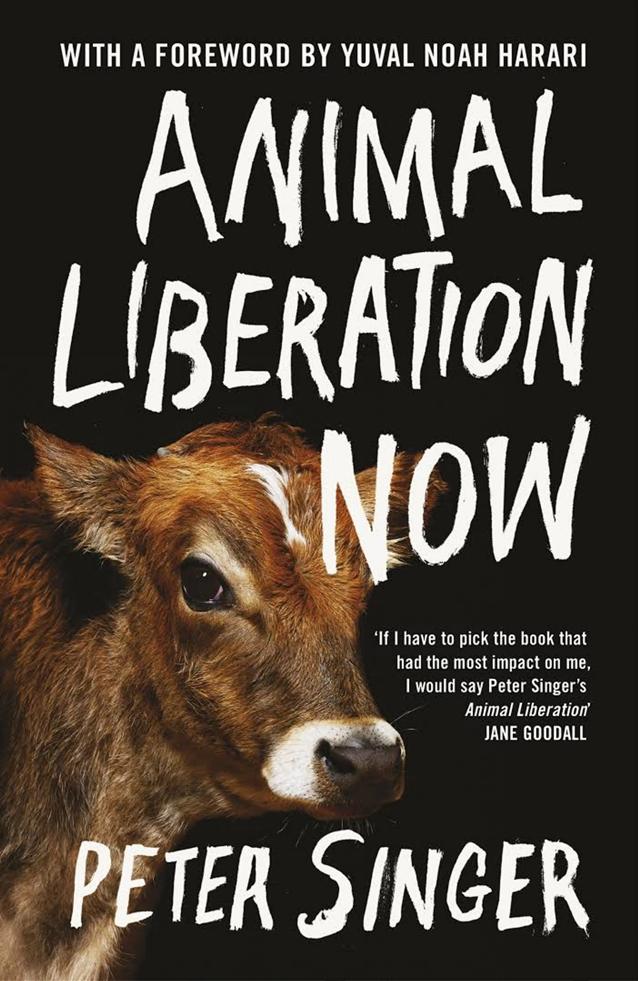
I hope that the future of food is predominantly plant-based, because even when animals do not suffer, they are significant contributors to climate change, especially ruminants, such as cows and sheep. So we need to reduce the number of ruminant animals in the world.
In Animal Liberation, both in the original 1975 book and in Animal Liberation Now, I reject speciesism, and defend the principle of equal consideration for similar interests, irrespective of whether the interests are those of a human or a nonhuman animal. So if there are ways of raising animals, and giving their interests the same importance and consideration that we give to similar interests of humans – for example, not to have pain
inflicted on them, to be part of a social group that suits their needs, and to be able to do things that they enjoy doing – and as part of that process, we obtain food that we like to eat, then it may not be wrong to raise animals in that way.
As you can see, I have again avoided the issue of when it is wrong to kill animals. That’s another topic that is too large and complex to discuss here. I say something about it in Animal Liberation Now, but there are fuller discussions in two of my other books: Rethinking Life and Death, and Practical Ethics.
In your work you champion the role of activism when it comes to raising awareness of animal suffering, but quite rightly condemn actions that threaten human life – in line with the principle of non-violence practised by Gandhi and others. What is your opinion of activist groups such as Just Stop Oil, particularly in light of their recent disruption of various sporting events? Do you think this type of activism helps or hinders when it comes to raising awareness and changing mainstream opinions?
I really don’t know if it helps or hinders, and I’d like to see some solid research to find out. But I can understand why Just Stop Oil does these things. They are trying to grab our attention and awaken us to just how bad climate change is, and how urgent it is that we cease to use fossil fuels – and, of course, much the same goes for eating beef, lamb and dairy products, as these are the foods that contribute the most to climate change. Just Stop Oil is committed to nonviolence, and it’s also important to state that their recent actions in art galleries and museums were carefully designed to avoid harm to any works of art.
So in the absence of clear evidence that such actions are counter-productive, I support them. It is important to try to get the general public to see just how dangerous the continued emission of greenhouse gases is.
30 The Vegetarian Summer/Autumn 2023
Let's talk about eggs...
A frank and honest discussion about eggs by Richard McIlwain
Ever since the Vegetarian Society was formed back in 1847, members have debated the ethics of the various vegetarian diets – ‘ovo-lacto’, ‘lacto’, ‘ovo’ or ‘vegan’ – and these issues are still alive and very much with us today. A decision to become vegetarian almost necessarily leads people to take greater notice of the foods they eat, their nutrient content and critically, how they are produced.
And most vegetarians that I speak to have indeed mulled over the ethics of eating eggs and dairy, recognising that these industries still slaughter animals at the end of their productive lives. This ethical dilemma can lead people to adopt increasingly vegan diets, and as an inclusive and broadchurch organisation, we always seek to reflect and champion the views of our members and supporters both vegetarian and vegan.
However, many vegetarians I speak to have no desire to adopt a vegan diet. They are content to identify as vegetarian, recognising that in terms of the overall number of animals slaughtered, and in terms of health and the environment it is still far better than a meat-based diet.
But what if foods such as eggs and dairy could be produced in a way
which didn’t require slaughter of the animal at the end of its productive working life? This could represent a fair ‘quid pro quo’ with the animal looked after and cared for its whole life, in return for providing us with food stuffs such as eggs and dairy. Certainly, there would be a number of obstacles to overcome, but in my opinion none of these are insurmountable. And so, in line with our new vision and mission, we will be exploring whether the animal derived foods enjoyed by vegetarians can in fact be produced without the need to slaughter animals at the end of their productive life. We are now actively seeking funding for a programme of research focusing on whether slaughter-free farming practices could operate commercially at scale, and in a way which minimises the impact on climate and biodiversity.
We are also engaged in seeking out and raising the profile of those people already working in this area: the scientists, the farmers and the businesses which are leading the way when it comes to the development of kinder farming systems within a more sustainable global food system. Hopefully, this whole subject area will be of great interest to members, whether flexitarian, vegetarian or vegan, and we hope to engage you actively in this research and policy work as it develops.
As a starter for ten below, I have outlined some thoughts about the future of the egg industry, and how as a society we could help shape its future development in a way which puts kindness and sustainability at its heart. But I would love to hear from members with your thoughts on this work area,

Summer/Autumn 2023 The Vegetarian 31
in particular with suggestions for where we should focus our efforts and examples of good farming practice or scientific breakthroughs that we could highlight in future articles.
But for now, read on as I muse over the future of the humble egg.
Eggs have been at the heart of human diets for millennia and remain a favourite of meat-eaters and vegetarians alike. This is not surprising given the rich nutrient benefits associated with consumption of eggs, not just protein but a range of micro-nutrients and choline which helps with healthy brain function. And despite concerns linking consumption of eggs to raised cholesterol (now debunked) and scares over salmonella poisoning, our passion for eating eggs continues. In the UK, we now have around 33 million laying hens producing circa 10.4 billion eggs per annum, which when you add in the 1.5 billion eggs imported, represents consumption of almost 190 eggs per person per year according to the egg industry’s own figures.
Yet anyone who lifts the curtain on the egg production process will realise that it comes with a range of ethical and environmental issues, some of which are set out below.
• While hens can live for between five and ten years (and in some cases even longer), longevity depends on factors such as the breed, environment, disease and predation, and typically most are slaughtered at between 18 months and two years once their egg laying cycle starts to decline.
• While the eggs we eat are, in the main, unfertilised, providing for a constant supply of laying hens requires fertilised eggs. The 50% of chicks born that happen to be male are typically slaughtered almost immediately.
• The intensive nature of the egg-laying industry requires that many hens be housed in cramped conditions with 35% of current laying hens living in ‘enriched cages.’ These provide only a little more space than the old battery cages together with some minor enrichment such as litter and a perch. Even free-range eggs allow stocking densities of up to nine hens per square metre inside, with access to just four-square metres of outdoor space per hen.
• Intensively farmed hens also require feeding with large quantities of grain, and over 50% of soya imported into the UK for animal feed (mainly for pigs and poultry) comes from Brazil, where the destruction of the Cerrado tropical forest in particular is being driven by the rush to develop new soya plantations.
• And the recently negotiated TransPacific Partnership trade deal will in all likelihood see import tariffs on eggs dropped, which could flood the UK market with cheaply produced eggs from countries such as Mexico where battery cages are still widely used.
The question then becomes one of ‘how might we continue to eat eggs while addressing the key issues outlined above?’
As part of our developing programme of research, policy development and lobbying, we intend to answer these questions and hopefully prove that a reformed egg industry can be both ethical and sustainable. Indeed, some of the potential solutions are with us now.
Eradicating intensive farming
Our current demand for eggs and the desire for competitive pricing are the two major drivers which lead farmers to intensify production methods. It therefore follows that reducing consumption and possibly being prepared as consumers to pay a little more for eggs could encourage fewer intensive methods of production. With around 20% of UK eggs sold in liquid form for use in food manufacturing, there is a clear opportunity to replace this use with the new plant-based and fermentation food products that replicate eggs in processed foods. The same could apply to home baking, where in addition to these novel foods, traditional egg white replacements such as aquafaba (the liquid from canned chickpeas) could be promoted. If we reserved eggs for their traditional use (boiled, scrambled, poached etc), we could reduce consumption of shell eggs. Combined with financial incentives to encourage farmers to transition to more natural production systems, this could lead to a significant and positive shift in current production methods.
Eradicating the culling of unwanted male chicks
As recently as December 2022, reports emerged of a new technique developed in Israel for preventing the birth of unwanted male chicks. The company Huminn together with the Israeli Agricultural Research Organisation have created a process using blue light which prevents the development of male embryos in the egg at an early stage, resulting in the hatching of only female hens.
If commercially scalable, this could prevent the unnecessary deaths of billions of young male chicks globally. We will shine a spotlight on this technology and its scalability in a future article.
Providing an enriching environment
Already, small-scale farms here in the UK practice no slaughter egg production. In particular, ‘The Paddock’, a fruit and veg box scheme in North East England, is producing and selling eggs from a flock which get to live out their natural lives.
Their own website tells the story, as set out below:
‘Our hens have come from many places over the years, from ex-battery rescues to the chicks we incubate ourselves. We have a very back-to-basics approach, and the chickens have the whole six acres with fox-proof housing in the orchard. One question we are often asked is what we do with our male chicks. Do we kill them? The answer is no. They live at The Paddock or are re-homed to new loving homes.’
I was also intrigued while attending Compassion in World Farming's recent Extinction & Regeneration Conference by the US business Tree-Range Farms. These are broiler hens bred for meat, but what intrigued me were the conditions in which the hens were raised: indoor housing, with low stocking densities and high welfare and enrichment standards combined with large and predator-proof outdoor space.
32 The Vegetarian Summer/Autumn 2023
Once again, a glance at their website is enlightening:
‘Tree-Range® chickens are raised under a canopy in a coop & paddock system that integrates perennial crops like hazelnuts and elderberries into the diets of the chickens. This seasonal production system protects the birds and improves environmental quality through a design that prioritizes soil building, biodiversity, and clean water.’
I was interested to hear the company founder Reginaldo Haslett-Marroquin speak passionately and eloquently about the project at the CIWF conference. And what struck me in particular was his observation that as hens are descended from the red junglefowl (Gallus gallus), which prefer tree and shrub cover for foraging and protection, then efforts to provide enriched environments for hens should incorporate these features.
What can we conclude from this?
Even in the early stages of developing this area of work, we can see the green shoots of a way forward emerging. Already, scientific breakthroughs and ethical entrepreneurs are making inroads into the issue, and we can start to chart the development of a programme of insights and original research that could make a compelling case for a commercially viable, kind and sustainable slaughter-free egg production system.
If we can demonstrate how these systems can scale up, in a manner that is viable for the producer and affordable for the consumer, then we can create a strong argument for both government and business, and campaign for a major transition in the egg industry while reframing our relationship with animals to one of kindness and respect.
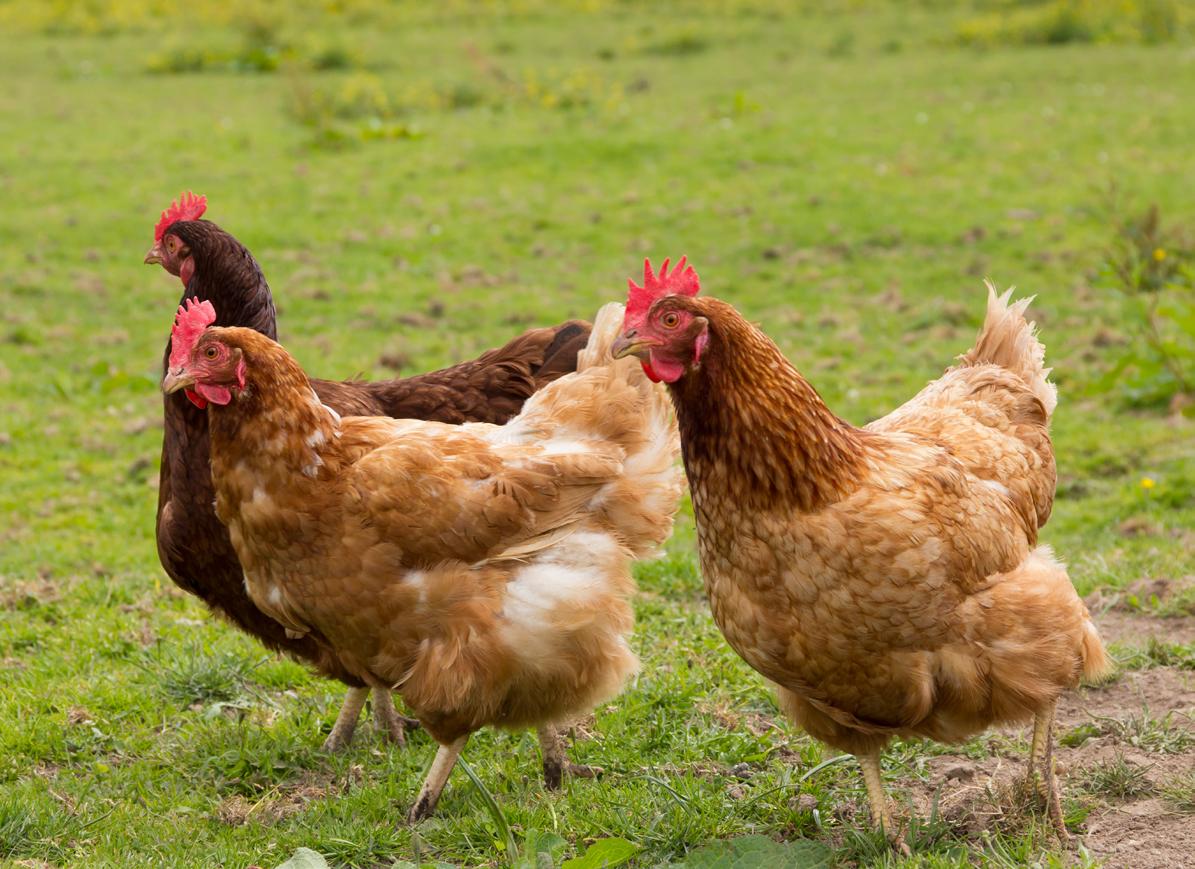
We will of course, be seeking funding in support of this work, in particular from grant-making trusts. But if any members wish to make a separate donation in support of our planned programme of research, we would be extremely grateful. We will happily recognise your contribution in relevant reports and critically your donation will help in the development of the better future for animals we all wish to see.
You can make a donation by going to:
www.vegsoc.org/donate
Or calling 0161 925 2000
Summer/Autumn 2023 The Vegetarian 33
Exploring the Veggie World
Lauren Taher decided to quit her job as a teacher and travel the world. She shares how being a vegetarian on the go has proven more challenging than she first thought it would be…
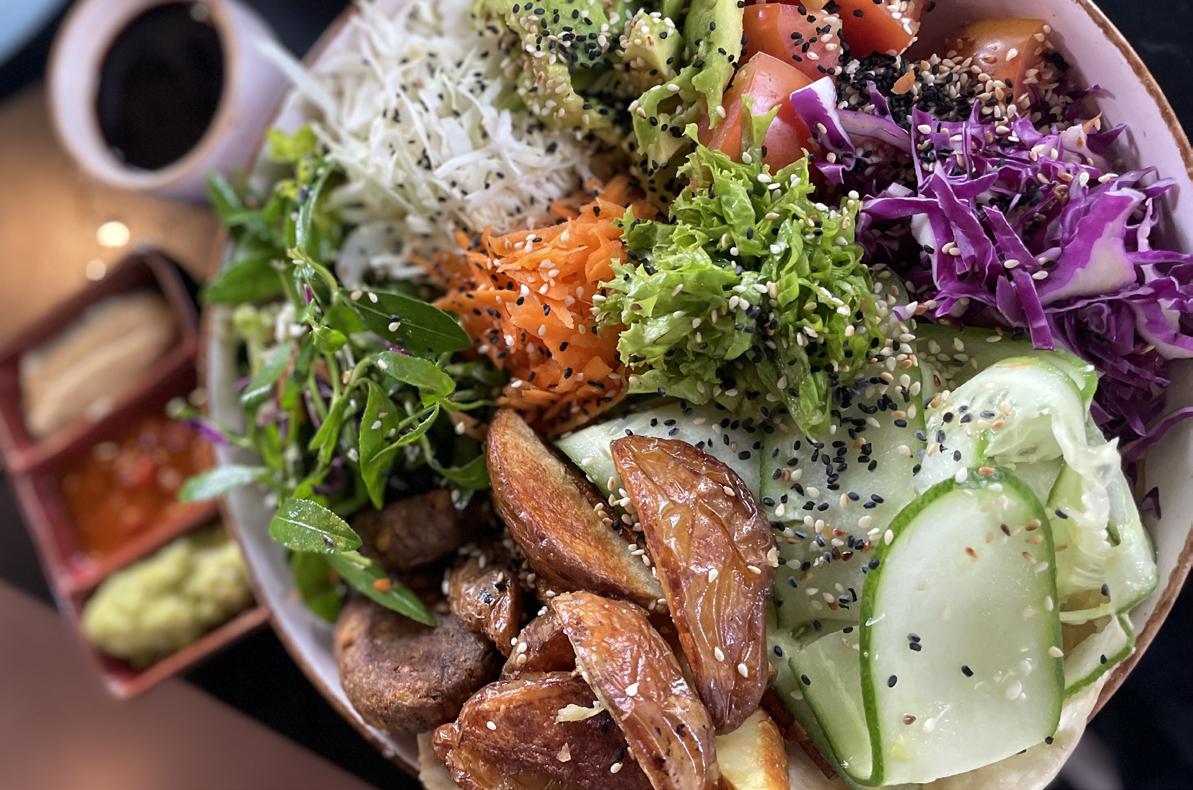
I was six years old when I decided to become a vegetarian. It is a moment I remember so vividly: the moment I promised myself that I would never again eat something with a heartbeat.
I was on a school trip to a farm, a science trip, looking at food chains. I didn't fully understand what the trip would entail at that age. 'A cuddle with some cute animals? Yes, please!' thought my little brain. When the reality of the trip hit me, I could not cope. I couldn't cope with the thought that the helpless, beautiful animals I had spent my afternoon cuddling would be sitting on someone's plate just days later. I did not and could not understand how people, my family included, knew about this and still chose to eat meat. Little did I know that years later, I would spark a chain reaction that converted my mum, dad, and two younger sisters into fellow veggies.
Twenty-two years later and I have never looked back. Now a 28-year-old primary school teacher, I decided to quit my job and embark on a journey to travel the world – or, at least, as much of the world as my bank balance could manage. At 28, I may not fit the stereotypical criteria for taking a gap year, but you only live once, right? So why not go against the grain? At least, that's what I keep telling myself.
So, six months into my adventure, what has it been like to travel the world with a 'dietary requirement'? The short answer is that it has been challenging. More challenging than I anticipated. Of course, different cultures and places foster different cuisines, which I was very excited about before travelling –the opportunity to sample delicacies from other places! I was looking forward to embracing the challenge of eating vegetable noodles with chopsticks in the street. However, what I didn't predict was that getting hold of food not containing meat would be so difficult to source.
One place I did not expect to be so tricky was when travelling in the sky. Having been on over 50 flights whilst
travelling, I cannot stress enough how problematic ensuring that I receive a veggie-friendly meal has been. Don't get me wrong, I am not a fan of plane food by any means; however, on a long-haul flight, it is nice to have the option to have something to fill your tummy. Some of the more expensive airlines offer the opportunity to choose your meal preference before checking into the flight. The more budget-friendly airlines, however, do not – and as I am backpacking, I usually favour the latter! I can count more times when I have not been able to have a vegetarian plane meal than when I have. When the food trolley reaches you, having served the length of the plane, there is often no vegetarian option left, leaving me with a rumbling stomach when arriving at my destination. One hack I have found is when checking in, requesting to sit near the front of the plane works well, allowing you to get served from a nearly full trolley!
So far, the most challenging part of being a travelling veggie must be explaining to places serving food that I do not eat meat. That I do not eat the range of critters served on street
34 The Vegetarian Summer/Autumn 2023
stalls in Cambodia, nor would I like to touch one. Although only sometimes successful, using Google Translate to say 'I do not eat meat or fish' in the language of whatever country I travel to usually has some benefits. I often still get the same response of 'Ah, not meat! Not a problem! We have vegetarian beef.' A waiter shouted this to me from across the street in Bangkok, Thailand, as I declined his offer to eat at his restaurant due to the large boards outside advertising every kind of meat you could imagine, and some that you wouldn't! Alongside these were tanks of various aquatic creatures waiting to reach their fate on someone's plate. I have found this a common occurrence and particularly traumatic, seeing these poor, defenceless creatures sitting in tanks, with me powerless. I constantly remind myself that, whilst travelling, all I can do is choose to eat elsewhere, but that does not ease my sadness. Meeting fellow travellers and socialising around food is one of my favourite things; there is something so heart-warming and safe about chattering over delicious food, especially when stumbling across a vegan café, which I often did in parts of Thailand. I am comfortable explaining why I choose to be a vegetarian, yet I still find it bizarre how shocked people are that I have made this choice willingly. I am so used to the same conversation that I almost switch to autopilot when asked, 'Vegetarian? What on earth do you eat?'
Recently, when staying at a rather luxurious resort in the Maldives – a belated birthday treat – I felt relief when going for dinner. I noticed all the dishes were labelled to show whether they were vegetarian-friendly. I was so looking forward to the prospect of having a proper meal containing different food groups!

When going up to the bougie outdoor buffet equipped with twinkly lights – although this didn't much help with seeing what I was putting on my plate – I plated up a delicious salad fit for vegetarian royalty, or so I thought. I was just about to tuck in when I noticed the small meat-like chunks amongst the salad on my plate. After closer inspection with none other than my phone torch, I realised multiple dishes had meat or fish in them despite being labelled as vegetarian. I was furious. The buffet had not been cheap, and to find that the food was mislabelled made my blood boil. Of course, I complained to the hotel manager, who apologised profusely, offering to reimburse me for the meal. But this did not take away from the fact that even at a place as luxurious as this was, what I could eat was limited.
Most of the accommodation I have stayed in has been hostels and homestays where I rarely have access to cooking facilities. Thus, I’ve relied on eating when out and about. When hiring a van in New Zealand for two months, I found it easier than expected to eat a plant-based diet. The option to shop at supermarkets and purchase fresh vegetables was a luxury, albeit relatively pricier than in the UK. Having spent much time in Asia, where street food was the norm, I thoroughly enjoyed cooking my veggie-friendly dishes, even on a tiny gas fire outside in the pouring rain. What I did not enjoy was the washing up out of a bucket! It put my mind at ease knowing that what I had made was 100% veggie and often vegan.
Sri Lanka has so far been my favourite place to find vegetarian cuisine. Although meat is still eaten here, with a large Buddhist population, vegan and vegetarian food is increasingly popular. The locals utilise everything they grow, and staying at several homestays has allowed me to experience the real Sri Lanka and its superb cuisine. I am fascinated by how they grow so much fresh produce on their often-small areas
of land, swapping these with neighbours and cooking dishes by eye without glancing at a recipe. I have taken part in vegan cooking classes here, where the food is so incredibly delicious; I have jotted down the recipes on scraps of paper, which I will attempt to follow when I return to the UK.
At home, I love to cook, experiment with vegetarian dishes, and ensure I eat my five a day. I find the art of preparing food so therapeutic. Even as an adult, one of my favourite things to do is sit in my parents’ kitchen with a coffee and learn from my mum, who whips up the most incredible vegetarian food without even following a recipe, whilst my dad and I watch in awe. This ability to buy and cook fresh produce from scratch is something I will never take for granted again.
So, I sit here writing from a vegan café in Sri Lanka, listening to a European man at the table across from me rudely complaining to the waiter. He believes it is unacceptable not to be able to add chicken to his plant-based burger at a plant-based café. I smile at the patient waiter serving the man whilst he rolls his eyes back at me, telling me with his eyes that he deals with this kind of ignorance daily. With the street dog nestled on the sofa beside me, soundly sleeping, I sip a piping hot pot of lime and ginger tea and munch my avocado and mushrooms on crusty sourdough. I am so proud to be a vegetarian, and I feel lucky and empowered to have the opportunity to share my journey with the world.
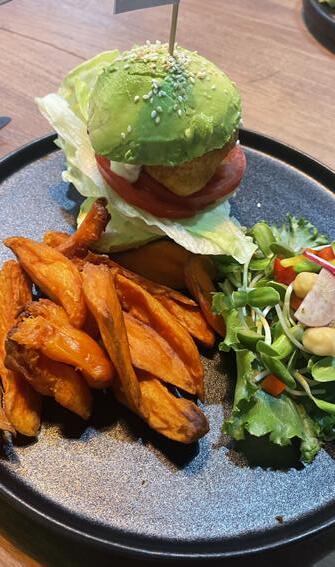
Summer/Autumn 2023 The Vegetarian 35
Mini Menus for Little Eaters
Eating out with your little ones? Wondering where to head for the best meat-free meals? Here, we round up some of the best places to eat out with children across the country if you’re vegetarian or vegan.
by Kayleigh Rattle
Eating out meat-free has improved significantly over the years, as has what’s on offer for children. Not only are there more meatfree options than ever, but many restaurants and cafés are becoming creative with their menu offerings for children, so it’s not just about fried carbohydrates and all things beige. Here, we round up some of the best places for families and children to dine meatfree, from cafés to restaurants, takeaways and more – tuck in!
Go green
A fantastic place to start if you’re looking to eat out as a family are restaurants that specialise in vegetarian and vegan cuisine. If you’re unable to find a dedicated children’s menu online, consider calling or emailing ahead of your visit to see if they’re able to
cater for children, or to create smaller versions of dishes. Chances are, they’ll be more than happy to oblige, providing they have adequate time, resources, and notice.
London’s Mildreds is a wonderful small-scale group of restaurants which offers 100% plant-based fare. You’ll find outlets in Covent Garden, Dalston, King’s Cross, Camden and Soho, and they also offer an all-day menu for kids. Example dishes include dumplings and sugar snap peas, rainbow rice, or houmous dips. Delicious!
Or, how about taking advantage of the last of the summer by heading to a specialist vegetarian 'fish' and chip shop for dinner? Top places to look out for include Brighton’s The No Catch Co and Birmingham’s The Veggie Chippy. While not exclusively vegan, London’s Sutton & Sons also has a brilliant vegan menu which features banana blossom marinated in seaweed and samphire.
Chain reaction
Another option to consider when eating out as a vegetarian family are larger-scale chain restaurants. One such example is Pizza Express; its ‘Piccolo’ children’s menu has long been a favourite with families. The menu typically contains three courses (dough balls, pizza or pasta and dessert, plus a Bambinoccino). Vegan options include dough balls with houmous, vegan Quorn pizza, and fruit ice lollies, again all rounded off with an oat milk Bambinoccino.
Bill’s is another great family-friendly chain with more than 70 premises around the UK – look out for half-term deals where children often eat free or at a reduced price. As well as providing colouring books and pencils to keep little ones entertained in a vibrant setting, Bill’s menu changes regularly, and is well-thought out. There’s a specific kids’ breakfast menu – think

36 The Vegetarian Summer/Autumn 2023
Photo by: Pizza Express
veggie beans on toast or vegan porridge – while the all-day menu features options such as vegan meatball pasta and macaroni & cheese. The houmous and carrot stick sides are also a tasty option, and the vegan coconut ice cream is a great choice for dessert. Bill’s also offers a wide range of juices and smoothies for upping the fruit and veg intake in your little one’s diet. For something a little different, and an opportunity for your children to experiment using chopsticks, try Wagamama’s vibrant and zingy kids’ menu. For veggies, there’s flavourful ramen, soba noodles and katsu curry and stir-fried rice on offer, and all of these come with vegan options.
Mexican restaurant chain Wahaca, co-founded by chef Thomasina Miers, offers a range of fun and flavourful dishes on their kid’s menu too. Standout choices include ‘build your own tacos’, where children can compile their own meat-free tacos filled with seasonal veg, lettuce, cheese, slaw and black beans: perfect for independent eaters. Wahaca’s cheesy toasted quesadilla sandwiches are also a hit with kids!
At Bombay-inspired restaurant group Dishoom, they’ll happily prepare smaller and reduced spice portions of main meal dishes. There’s also a dedicated kids’ menu covering breakfast (such as vegan porridge with bananas or a vegan pancake stack), lunch, dinner and dessert. The mango kulfi dessert – served on an ice cream stick – is a delicious treat.
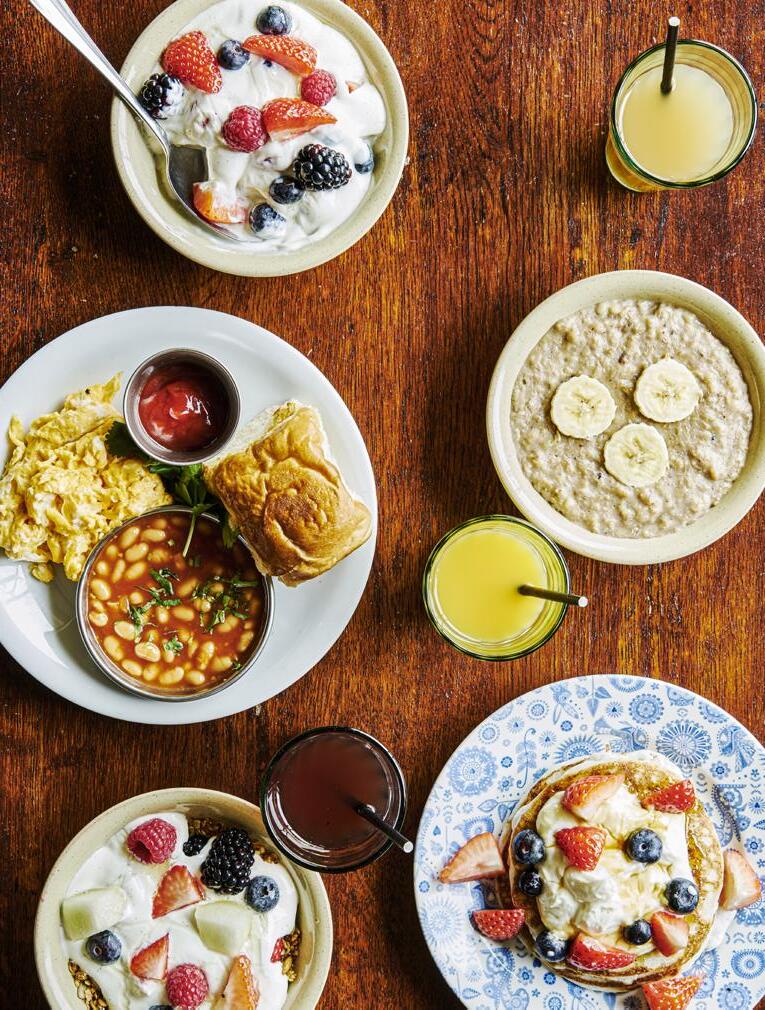
Takeaway tots
Another great eating out option – that saves you planning what to eat, the clear-up afterwards, or sitting down for too long – are food markets. Available up and down the country, these can be a brilliant way of grabbing a bite to eat (and something different for everyone if you have varying tastes and dietary requirements) and heading to a nearby park or bench to enjoy your spoils.
If you’re in London or Manchester, look out for Veggie Pret, the meat-free outlets of popular café chain, Pret A Manger. While you’ll find an impressive selection of veggie options at a regular Pret, Veggie Pret even has its own dedicated vegan bakery – ideal if you’re planning a picnic in the park.
Top tips for eating out with veggie children
Call ahead
Found a lovely meat-free spot but unsure of its kiddie credentials? Call ahead – while the outlet may not have a standalone children’s menu, that’s not to say it won’t be able to cater for children, whether that’s bite-sized portions or something bespoke from the ingredients they already have in the kitchen.
Time your visit
Menus can vary wildly depending on the time of day, or day of the week. Take a look at the different menus and specials that an establishment has to offer, and time your visit accordingly – e.g., lunch might be the best time for veg-packed salads.
Take some activities with you!
Bear in mind that asking for something off-menu may take a little longer if the chef or kitchen has to do some extra prep work. Not all restaurants offer activities such as colouring books and pens and pencils, so our top tip would be to pack your own selection of activities – books and sticker books can work well here too.
Ask for their food to come first
If the adults in your party are ordering starters, consider asking for your little ones’ food to come out with the starters, or order a portion of bread for them to nibble on if you know theirs might take a little while.
Photo by: Dishoom
DIFFERENT VIEWPOINTS: Why this vegetarian Gypsy supports traditional hunting practices
Of course, the Vegetarian Society does not support hunting practices of any sort and does not see the killing of any animal for food as being in line with its values and aims. However, we are keen to hear from different voices within the vegetarian community and this is an edited version of a piece originally published in the Travellers' Times. By understanding differing viewpoints, we can avoid working in an ‘echo chamber’ and better determine how to deliver on our mission across a broader demographic.
Gemma Lees shares her opinions on the global meat industry and her support of traditional GRT (Gypsy, Roma, and Traveller) subsistence hunting practices. I’m a Gypsy and a veggie, which seems quite rare within our community. I made the decision to stop eating meat at age 13 after I came across some literature about slaughterhouses at school. This was a huge decision for me as at the time literally everyone else in my life ate meat and, as it was 1996, I didn’t have the benefit of the support of online communities.
I do, however, still support traditional GRT subsistence hunting methods. GRT folks have lived off the land for centuries, only taking what they need to feed their families, using everything they catch and allowing animals to replenish their own stocks during offseasons.
I understand that this is an incredibly controversial opinion and the most common (and very fair) question I get asked is ‘why?’
I love animals. I couldn’t bring myself to kill one and I don’t feel like I have the right to pay some faceless corporation to do this for me. I do, however, believe that if you can bring yourself to catch and kill animals in line with traditional subsistence practices, then you’ve earned the right to eat it.
I cannot, however, support the global behemoth that is animal agriculture. The suffering it inflicts begins way before the death of any animal. The Humane League UK 1 explains that 94% of all animals raised for food are battery farmed. These 130 billion animals will
never experience the outside world, and many won’t even have enough space to ever fully extend their limbs. Chickens, for example, have been selectively bred to have such ridiculously large breasts that soon enough they can’t stand; they instead are forced to lay in their own waste, which burns their skin.
Fish don’t even have the meagre legal protections afforded to land animals in the UK. Scientists have proven that fish feel pain the same as other animals. Despite this, an undercover operation undertaken by Animal Equality UK 2 caught farmed fish being brutally mistreated.
A 2021 report published in Nature Food 3 states that 20% of all humancaused greenhouse gas emissions are from livestock. Sixty percent of all food system emissions are also caused by meat farming, this is twice that of plant-based foods. A UN-FAO (United Nations Food and Agricultural Organisation) 4 report found that 37% of human-caused methane is also from livestock and as a greenhouse gas, methane is over 20 times stronger than CO2. To put this into perspective, animal agriculture is responsible for more greenhouse gas than all of the world's transportation systems combined.
This impact is lessened by traditional hunting and farming practices due to what the animals eat and their waste. Compassion in World Farming5 explains that traditional methods of farming are relatively efficient, as the few animals eat natural waste products such as grass. Wild animals do the same. The ‘fast-growth, high-yield’ methods used by industrial farms however, leads to substantial amounts of mainly
soya-based feed being grown. These use massive amounts of fertiliser and pesticides. The waste from wild animals acts as manure, replenishing the soil with essential nutrients, but the sheer amount of waste caused by factory farming is often mismanaged, leaking into watercourses and killing local wildlife.
Meat eating on this scale also greatly negatively affects developing nations, such as Brazil, which is home to 60% of the world’s rainforests. It is also one of the world’s largest exporters of soybeans and meat from cows, pigs and chickens.
Unearthed, Greenpeace’s investigative journalism arm, uncovered in November 2020 that feed used by UK farm animals was supplied by a company linked to deforestation in the Amazon and another vital Brazilian ecosystem, the Cerrado.6 Animal Equality UK7 explains that illegal land-clearing in the Cerrado for the production of soya for animal feed has led to the loss of 50% of its vegetation. That’s an area the size of England, Spain, Portugal and Italy combined. Factory farming itself is responsible for more than 80% of Brazil’s deforestation, leading to more forest fires and, as Global Witness, a NGO explains, devastating impacts on local people’s food, water, culture and livelihoods.
My husband is a meat-eater and despite having eaten animals he's caught in the past, he certainly doesn’t kill everything he eats. So, what does he do instead? Well, he cuts down on his meat consumption as much as he can. There are a variety of ways that people can do this.
38 The Vegetarian Summer/Autumn 2023
Meat Free Monday 8 is a national campaign to encourage people to cut out meat for just one day a week. Their website’s calculator states that one person doing so for just one year will save: 789 bathtubs of water, 54 fish, three tennis courts of forests, an equivalent amount of greenhouse gas as driving 434 miles and about four chickens. They will also add two days to their life expectancy and prevent two people in developing countries going hungry.
Another way is to try one of the thousands of alternatives available on the market now. A look around the local supermarket will reveal a treasure trove of products to replace meat with: sandwich slices, frozen nuggets, chilled burgers, sausages and mince, tinned pâté and all manner of tasty treats and desserts!
There are even more benefits to eating a more plant-based diet, as explained by ProVeg International9, it can positively affect your health too. People following plant-based diets usually eat closer to the recommended daily intakes of protein, carbohydrate, and fats than
those who eat meat, and their intake of fibre and many vitamins is usually higher too. The Humane League UK10 add that people who follow plant-based diets usually also have better digestion, more energy, improved heart health and are less likely to be a Type 2 diabetic than meat-eaters.

I now have another veggie in my life, my 11-year-old son, Tommy. We were both incredibly excited to visit the Just V Show at Birmingham’s NEC last year and try lots of tasty new veggie treats.
I’m not asking meat-eaters to run out and start catching fish and shooting pheasants rather than going to the supermarket. But if we can all look a bit closer at what we’re eating, what the supply chain was, how it lived and what we could substitute it with, we could all live healthier, more sustainable, and maybe even tastier lives.
This is an edited version of a piece originally published in the Travellers’ Times. What do you think? Please let us know at hello@vegsoc.org.
References:
1. https://thehumaneleague.org.uk
2. https://animalequality.org.uk/issues/fish/
3. https://www.nature.com/natfood/
4. https://news.un.org/en/story/2006/11/201222-rearing-cattle-produces-more-greenhouse-gases-driving-cars-un-report-warns
5. https://www.ciwf.org.uk/factory-farming/environmental-damage/

6. https://unearthed.greenpeace.org/2020/11/25/brazil-fires-deforestation-tesco-nandos-mcdonalds/
7. https://animalequality.org.uk/act/brazil-deforestation
8. https://meatfreemondays.com/calculator/
9. https://proveg.com/5-pros/health/the-advantages-of-a-plant-based-diet/
10. https://thehumaneleague.org.uk/article/is-a-vegan-diet-healthy
Summer/Autumn 2023 The Vegetarian 39
Book Review
One Medicine by Matt Morgan. Simon & Schuster, 2023; hardback, £16.99

Sometimes the most interesting books are the ones you come across by chance. This was the case with One Medicine by Dr Matt Morgan, which I found in a local library, attracted by the book’s subtitle: How understanding animals can save your life.
As the author points out in the introduction: “Our relationship with animals seems broken… We eat them and experiment on them. We keep them in conditions that destroy not only their wellbeing but human health and the environment. We blame them for pandemics and kill them for medicines that do not work.” To repair this relationship, Morgan seeks, “to share the science, the stories and the ethics of how we can save the lives of humans through understanding the lives of animals.”
Thus, One Medicine is a mixture of medical autobiography (the author is an intensive care consultant), zoology, and anecdote. For example, in chapter five we learn about ant societies (including how African Matabele ants have developed a triage system – the only non-human animals known to do this), and how studying their behaviour has helped to develop effective means of dealing with pandemics such as Covid-19, and even the treatment of a young patient admitted to intensive care with a serious brain injury. If this is something of a stretch, the author rightly acknowledges the debt we owe animals. Influenced by Peter Singer’s book Animal Liberation*, the author argued in a student thesis that “although morally acceptable to continue animal experimentation in very limited settings, eating meat could
not be justified.” However, it was not until he met the renowned philosopher and animal rights advocate 15 years later that he began to practice what he preached and became a vegetarian, albeit inconsistently so, briefly explaining why the reader should follow his example in chapter 10.
One Medicine calls for the integration of human and veterinary medicine. As the author concludes, “there is always an animal to talk about, a species who can help us and who we can help in return. I used to think that I worked only with humans. But now I know I only work with animals.” Rapidly switching from one topic to the next, One Medicine is both intriguing and baffling, but never less than interesting. If the reader is sometimes left behind by Morgan’s breathless storytelling, we can only trust that ‘the doctor knows best’.
Review by Paul Appleby, Vegetarian Society Fellow, May 2023
40 The Vegetarian Summer/Autumn 2023
* Peter Singer’s updated and fully revised "Animal Liberation Now" was published in June 2023.










Summer/Autumn 2023 The Vegetarian 41 Would you like to advertise in The Vegetarian? If so, please get in touch: hello@vegsoc.org 0161 925 2000 NEW VEG DREAM HI TOP (BLACK) NEW AIRSEAL 10 EYE DERBY BOOT (BLACK) NEW SELENE SANDAL (BLACK) NEW MARY JANE DOUBLE BUCKLE (BLACK) NEW VEGAN RUNNER (GREY/NAVY) NEW AIRSEAL BOULDER BOOT (FOREST GREEN) NEW CHEATAH (RED) NEW OLIVER SHOE (TAN) NEW PIXIE BOOT TALL (BLACK) NEW CMJ SANDAL (BLACK) if icon is smaller than 15mm wide use 2nd version Gorgeous new Vegan Footwear... all available at www.vegshoes.com Veg Society ad 260x87 0623.indd 1 14/06/2023 15:46 The Vegetarian Charity Vegetarians and vegans aged under 26 who are in need of financial assistance can apply for grants of up to £500 from The Vegetarian Charity. Please visit the website for details. Committed vegetarians and vegans who are interested in volunteering as Trustees should email the Grants Secretary. www.vegetariancharity.org.uk grants@vegetariancharity.org.uk Donations and legacies to help us continue our work are welcome. Registered Charity No 294767 VegCharity-Ad-2022.qxp_Layout 1 13/06/2022 15:11 Page 1
Vegetarians and Vegans – our shared ambition

A think piece from the Vegetarian Society’s Chief Executive
Over the past 18 months of my tenure as CEO, I have received correspondence from members on a range of issues. But the one theme that recurs on a regular basis is ‘balance’, with members expressing a view that we have lurched too far towards veganism at the expense of vegetarians or that we haven’t gone far enough.

With a broad membership of both vegetarians and vegans, plus now a few flexitarians (or as I like to describe them – ‘soon to be vegetarians’) this is perhaps not surprising. It is also an issue firmly on our ‘to-do’ list as we refresh and redefine our purpose as a charity, making sure we reflect and represent the whole of our membership’s interests whether in our recipe pages, our long reads, our selection of members' letters or the adverts we choose to run.
Indeed, as a society I want us to reach increasingly into the demographic of people who could be labelled as flexitarian or ‘concerned meat eaters’. After all, if we aren’t working hard on inspiring them to reduce and give up meat, we risk becoming an inward facing ‘club’ with limited relevance.
Richard McIlwain, Chief Executive
I firmly believe that having a broad base of members makes us a richer organisation, capable of covering a wide range of issues and providing content that encourages all of us to self-reflect, think critically about the issues we seek to address and ultimately encourage more people to take action.
I believe this provides for a mature and hopefully engaging approach, which allows a diversity of views to be reflected with room for debate and analysis. In addition to members' letters in the magazine, we will be developing a series of short podcasts and interactive online discussions for members, aimed at giving our members a voice and an active role in the Society as we develop. However, venture on to social media and you could be forgiven for thinking that vegetarians and vegans are at each other’s throats, with some activists highly critical of vegetarians and indeed anyone who doesn’t subscribe to veganism. And yet, the many vegans I meet in day-to-day life are typically far more moderate and accepting of other people’s lifestyle choice, even if they may wish that many more
42 The Vegetarian Summer/Autumn 2023
people opened their eyes to the cruelty embedded into our current food system. And I am always humbled to speak to some of our long-standing members, who are vegetarian and, in some cases, have been so for over 80 years. The challenges of becoming and remaining vegetarian in the immediate pre- and post-WWII years were no doubt more substantial than today, and the desire and commitment shown is inspiring. In many ways, they also act as living proof of the benefits of a good quality vegetarian diet with many being fit and well into their 80s and 90s.
Wouldn’t we be much more powerful if were able to unite all of our voices on key issues of concern? After all, taking the Venn diagram approach, irrespective of our own ethical positions, there will be many themes that unite us. Yet, it is perhaps typical of the human condition to look for points of difference than areas of common interest.
There are many surveys that attempt to define numbers of people identifying as vegetarian or vegan. One I glance at on occasion is the regular YouGov tracker survey, which shows that as of January 2023, around 3% of the UK population defines themselves as plantbased or vegan, with 5% identifying as vegetarian.
https://yougov.co.uk/topics/society/ trackers/dietery-choices-of-brits-egvegeterian-flexitarian-meat-eater-etc
A further 14% identify as flexitarian and yet another YouGov tracker poll suggests that over 40% of people in the UK are actively seeking to eat less meat. https://yougov.co.uk/topics/science/ trackers/are-brits-reducing-theirconsumption-of-meat

How much more powerful would our lobbying be if we could reflect the common ambitions of the nearly 1 in 10 people who identify as vegetarian or vegan? And, even better, if we could tap into the 40% of people who are actively cutting down on meat – especially if we understood better what their motivations were: health, animal welfare, or climate.
Governments love to see campaign groups fight amongst themselves. It allows them to do very little. ‘You are calling for “x”, but this group are calling for “y” and last week another group were calling for “z”’.
It is why when I was at Keep Britain Tidy we took a decision to jointly work on policy with the Marine Conservation Society, Surfers Against Sewage, Greenpeace, the Campaign for the Protection of Rural England and others, in developing shared policy goals, shared lines to take and reflecting these goals to government and business. Amongst other successes, this approach helped secure a carrier bag charge in England and a decision to implement a Deposit Return Scheme for drinks containers (20p returnable deposit on your container – remember the Corona pop truck, anyone?)
In particular, we united our members and supporters in activist campaigns, with petitions running to hundreds of thousands of signatures and mass letter writing campaigns. In this way we were able to provide a compelling and competing voice to set against the highly paid industry lobbyists who regularly traipse the halls of Whitehall looking for influence.
Together, we could make an impact. Sure, we had to set aside some points of difference – but aiming for areas where our goals aligned resulted in faster and more substantial progress. It wasn’t perfect, and much remains to be tackled – but we secured wins.
A similar approach would, I’m sure, bear fruit (pun intended) for the Vegetarian Society’s membership. Campaigning on issues that are of major importance to 40% of the population is more likely to make politicians and business leaders take notice. A desire to eat healthy, but still great tasting plant-based foods; a desire to see an end to animal slaughter for food; a desire to take action on our heating climate.
The Society can build a broad coalition on ideas such as these – engaging members in the development of these ideas and seeking coalition with other activist member organisations operating in our space.
After all, no-one really knows what the future will look like. Should the whole world become vegan if cultivated, lab-grown meats offer a slaughter free alternative for determined meat-eaters? Can kinder, slaughter-free systems for dairy and eggs be developed? Should we grow new varieties of protein crops here in the UK at scale – such as gene-edited soya? Can we expand our horticulture sector to provide greater UK food security?
I simply don’t believe anyone who claims to have all the answers now or that their view of the world is the only correct view. The reality is far more complex and nuanced.
But if we can draw back from the detail and build a broad coalition on themes such as animal rights and kindness, sustainability, food security and the role of technology and emerging novel food, then we will be a much more powerful voice for those policy makers and business investors, who otherwise find it easy to ignore us, and we might just start to make real progress.
Anyway, these are just my thoughts. I’d love to hear what members think – as you are the heart of the Society and can play a role in its development. Do you agree? Disagree? Do you have ideas on how we might develop this work? We’ll publish a selection of members' letters in our next magazine – as together we strive to develop the Society as a real force for positive change.
Summer/Autumn 2023 The Vegetarian 43
Vegetarian Society Investigates: The Ministry of Defence
The Vegetarian Society's Chris Ogden speaks with members of the MOD Vegan and Vegetarian Network to see how it is pushing for positive changes to the department’s culture.
We’ve all seen and heard the adverts. The stereotype many civilians have of the armed forces is of well-honed soldiers whizzing around in trucks and on the back of speedboats. Rarely do we imagine the people in these adverts to eat a plant-based diet. However, some people in the Ministry of Defence (MOD) are working to change this perception.
The MOD Vegan and Vegetarian Network launched in November 2021. The network aims to link up the MOD’s vegetarian and vegan staff, inspire others to try a plant-based diet and engage with other internal and external bodies. Above all, it aims to improve the lived experiences of vegetarians and vegans in the MOD, both in the armed forces and the civil service.
Dr Sophie Foxen, chair of the MOD Vegan and Vegetarian Network, is a locum and RAF Reserve GP who recently worked at MOD St Athan in South Wales. She’s eaten a plantbased diet for around the last 13 years, and decided to start the network after posting on Facebook, asking if a support group existed in the MOD for vegetarians and vegans.
“There [were] quite a few people asking the same question [and saying] it would be good if we could work together,” Dr Foxen explains. “We thought ‘OK…’ If we’ve got something formal, rather than just an email from an individual about a concern, it’s going to have more impact if we can be a group and connect with each other.”
The network provides a vital point of connection for its 200-plus members, allowing them to share issues and suggest solutions. The issues the network deals with are wide-ranging but include the provision of healthy
food, better animal welfare, and appropriate kit.
These are not trivial issues. The 2022 Armed Forces Continuous Attitude Survey found that satisfaction with the standard of service from catering contractors was 25%. There are also issues around diversity and inclusion –almost twice as many vegans are female than male, while a systematic review in 2020 found that vegetarian men are subject to greater prejudice from omnivores due to their ‘less masculine’ diet.
A broad church
To understand the breadth of the network, it’s worth exploring the experiences of some of its members. Ben Cann has been in the British Army since January 2020 and works as an aircraft technician. He was one of the earliest members of the network, interested in being able to source vegan kit.
“I define myself as an ethical vegan, so it’s a deep, philosophical belief of mine that any exploitation of animals is completely wrong,” Cann explains. “I wanted to wear kit that adhered to my beliefs.”
“I would say it’s more difficult for vegans and vegetarians, as there is less choice,” Dr Foxen says. “Indeed, at times there is not a vegan option on the hot plate, meaning you may lose out on social time with colleagues. I think this leads to more vegans and vegetarians avoiding the messes entirely, which perpetuates the idea that there aren’t vegans or vegetarians in the Armed Forces to the contractors. Additionally, there are no vegan operational ration packs, which is a problem for ethical vegans.”
The network is already trying to address some of these issues, reaching out to other relevant bodies with some success. Some of the outreach work that the network has been doing includes working with Humane Society International to help train chef instructors about plant-based food, and interacting with the companies that provide the MOD’s catering to address the disconnect between the meals they’re designing and what vegetarians and vegans are seeing on their plates.
“Progress is being made,” Dr Foxen explains. “People are talking to us and wanting to hear our experiences and help, which is good.”
Much of the clothing that the MOD supplies contains animal products, such as leather footwear, wool trousers, and berets. Cann went so far as to hire a hatmaker to make him his own unique vegan beret. The conversation that started when he shared that experience was how he got involved in the network. While Cann’s Army experience has largely been positive, at times he has encountered a benign misunderstanding of his veganism, and situations where no processes are in place to cater for his needs. He’s found being part of the network helpful and finds that it is inspiring change in policies and people.
“If it wasn’t for the network, I don’t think I would have ever met anybody else that’s even just vegetarian, so the chances of me ever meeting another vegan would have been very slim,” he says. “They are around, but it’s only because of the network that we’ve been able to connect.
“Sometimes you can feel a little bit alone when you can’t really find anyone that shares the same sort of values as you. If you’ve experienced some poor food that you’ve been provided somewhere, [the network offers] a space where you can go and… share that experience.”
Dr Manish Tayal is a surgeon commander in the Royal Navy and is the principal medical officer at HMS Nelson Medical Centre in Portsmouth.
44 The Vegetarian Summer/Autumn 2023
"I would say it’s more difficult for vegans and vegetarians, as there is less choice."
He comes from a family of vegetarians, being of Hindu background.
While he is used to being one of a few vegetarians on ships, having worked in the Navy since 2004, he has welcomed the peer support and diversity of the network. It’s already looking to develop relationships with other MOD groups such as the Defence Green Network and the MOD’s religious networks.

“What I’ve been kind of surprised by is how broad a church it is,” he says. “I’m a vegetarian, [but] there are vegans, there are ethical vegans, there are flexitarians in the network. There are people who come at it from a healthy living perspective, some who come at it from an ethical perspective, [and] some who come at it from a climate perspective. I’ve certainly had my eyes opened to some of that, so it’s been really educational.”
As a GP interested in diet, Dr Tayal is particularly pleased that the network has managed to arrange an educational slot at the next Royal Navy GP symposium this summer, given how better plantbased food options could help tackle obesity in serving personnel.
“I was just at a unit international day… [There were] lots of different countries represented and every single stall you go to, there’s at least one, if not more, vegetarian option in the food that they’re serving. Once upon a time that probably wouldn’t have been the case.”
Like Cann, he thinks the network is adding value, furthering the progress he’s seen for vegetarians and vegans since entering the armed forces almost two decades ago.
“Society has moved on, and therefore the people coming into the Navy are different to what they used to be,” he says. “British culture, which is what the Navy represents and reflects, [has] moved on.
A more welcoming MOD
While the MOD Vegan and Vegetarian Network currently has over 200 members now, its potential to grow even larger is huge. Extrapolating data from government statistics suggests that 26,000 MOD employees could be vegan, vegetarian or flexitarian. That’s a lot of people who could potentially benefit from its work.
With the UK’s vegetarian and vegan population only set to grow over the next few years, and climate issues growing in salience, Dr Foxen thinks there’s no better time for the MOD to become a more welcoming environment for plant-based people. Keeping staff happier and healthier, the network argues, would increase the MOD’s operational effectiveness and make it a more ethical and sustainable organisation.
“Even if someone genuinely does not care about animals and the
environment, they ought to be engaged with this,” Dr Foxen says. “Ultimately, if they don’t recruit people who are vegetarian or vegan, they’re going to miss out on 10% of their recruiting population.
“The health benefits for people increasing their plant-based food, even if they don’t eat it all the time, [are] very clear. The military has got a diversity inclusion policy. It’s got a sustainability strategy, so it does fit in with everything. There [aren’t] really any negatives.”

One thing is for sure: the MOD Vegan and Vegetarian Network is proudly representing vegetarians and vegans and raising the issues that matter to them, whether it’s improving people’s health, getting hold of vegan-friendly clothing, or having more than one vegetarian option to choose from at a mess dinner.
Making this last point, Dr Tayal laughs: “If I never see a nut roast again in my entire life, it will be too soon.”
Summer/Autumn 2023 The Vegetarian 45
Photo by: Yau Ming Low / Shutterstock.com
No Dig Gardening with Charles Dowding
Watering
Generally, in the UK we're not used to this being a significant issue. I hope this doesn’t change because unless you have access to a tap and a hose, life gets difficult!
It takes surprisingly little time for water storage to empty. Vegetables benefit from a lot of water!
Reduce water use through restricting what you water:
• Give some to new plantings, until you see them established.
• And to any vegetables which are coming into the cropping stage, including beans, tomatoes, cucumbers, courgettes and salad plants.
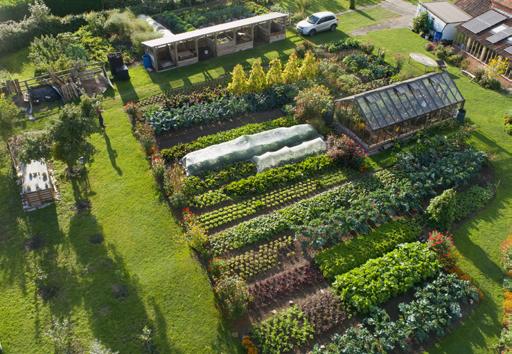
Vegetables I water as little as possible include beetroot, which is remarkably resistant to dry weather. Then it can swell in autumn rain, assuming there is some! Likewise, parsnips.
The weather is sticking in extreme patterns. For gardening it's difficult because we see long periods of either wet, or cool, or dry. Spring for example was mostly cloudy until the second half of May – which was extraordinarily sunny in some parts of the UK, but not everywhere. We were ruled by a northeast wind. It's almost as though somebody flicks a switch and then there is a different long-term pattern.
Soil management is a key part of addressing this. With no dig you have both better drainage, and easier access to moisture reserves for plant roots. The undisturbed mycelial network can extract and share tiny amounts of moisture from crevices in the soil which are too small for roots to access.
Succession planting
This means popping in new transplants preferably, or seeds, in any spaces made available by a harvest that finishes. August is the time to do this for onions.
If you're not paying attention, the garden can be half empty by mid-August and then you are missing a lot of growing possibilities.
Also good to transplant in August are Florence fennel, salad brassicas, pak choi and Chinese cabbage.
‘Transplant’ means you sowed the seeds three weeks earlier. You could take the sowing dates from my website or wall calendar; I recommend putting them in your phone to remind you because it's easy in the heady rush of summer to miss key dates. Once gone, they are gone.
September
This is sometimes seen as the end of the gardening year before the serious business of preparing for next year. Apart from the shortening days, it’s one of my favourite times, with many harvests coming through.
The garden often looks its best now, with beds so full, providing you managed the succession plantings of summer and also to keep everything watered.
If you missed making new plantings through summer, your September garden may look a little empty. Compensate with late sowings of salads for winter. These include lambs’ lettuce, salad rocket, mizuna, coriander, Claytonia or winter purslane, and chervil which is a super-hardy winter herb. Chervil gives leaves of mild aniseed flavour throughout winter in mild conditions, and it will survive some cold spells as well. There are other important sowings to make, with a view to winter fast approaching. The middle two weeks are excellent for sowing salad plants to crop under cover all winter. We sow them in module trays and transplant in October, after clearing tomatoes, cucumbers, and other summer plantings. Aim to have them in the ground before the end of October so they establish before winter, to give you harvests until April next year.
To speed up the ripening of tomatoes, now is a good moment to reduce watering. This keeps plants slightly stressed and sweetens the fruit more rapidly.
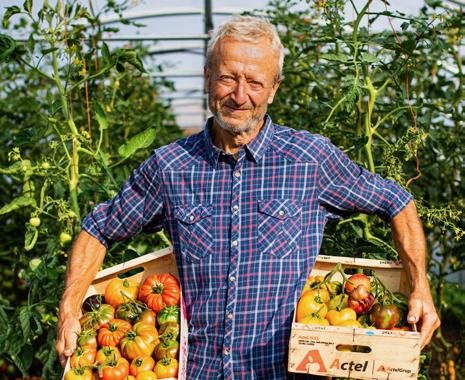
46 The Vegetarian Summer/Autumn 2023
One sowing outdoors you can make after equinox is garlic; see below. Garlic was reduced this year because of rust, and the more growth you can achieve before the end of May, when the rust arrives, the better chance you have of a reasonable harvest. Also, you can grow it under cover to reduce rust. This includes a cloche of mesh.
October
Now we encounter unfortunate tipping points, of day length and weather. For gardening there are two main consequences:
• Rapid reduction of light levels
“On October 10th, the devil spits on blackberries”. Either side of the equinox sees daylight decreasing much more quickly than at solstice time. It’s not only day length we lose but intensity of sunlight, hence the saying about fruits losing sweetness, because leaves cannot photosynthesise enough to make a decent amount of sugar. Tomatoes can continue cropping into November, but flavour is declining fast. I recommend you pick all tomatoes before mid-October and finish their ripening in the warmth of your house, just in a box, they don’t need sunlight for that. Then in a greenhouse you could sow, or better plant if you sowed before, winter leaves such as rocket and mizuna.
• Night temperatures may be below freezing.
First frosts can be from about mid-October, check the forecasts. Look to harvest frost-susceptible vegetables before that, such as squash, pumpkin, bulb fennel and celery. Other vegetables withstand frost and most improve in flavour, thanks to increased sugars for antifreeze.

Last sowings
Pop in cloves of garlic now. It’s fine to use the larger cloves of your own garlic. Dib holes and pop them just below surface level, then apply compost on top, without loosening soil, leave that to the earthworms.
If your soil is very weedy, plant garlic in rows across a bed 16in/40cm apart, with just 3in/7cm between each clove. Then lay cardboard between the rows and spread the compost on top of it.
Likewise, and not before month’s end, sow Aquadulce Claudia broad beans outside.
November
It’s the start of a new gardening year! We celebrate with international No Dig Day. A chance to make a new bed, share your garden on social media, and celebrate with a special meal of your harvests.
Now it’s also time to plan ahead. Have fun with a rough plan for your growing in 2024. Be adventurous but not unrealistic! There will be disruptions from life and weather. Don't worry that your plan will change throughout 2024. It's about having an outline to work within. Plans need to be flexible – that is the fun of gardening.
First, decide what you want to eat!
Then find out these details:
• When each seed or plant needs to go in the ground
• How much space they need
• When they are likely to finish cropping
Knowing the date of final harvest means you can plan succession plantings in the summer. This enables you to secure many more harvests from any one area. A lot of vegetables grow in half a season.
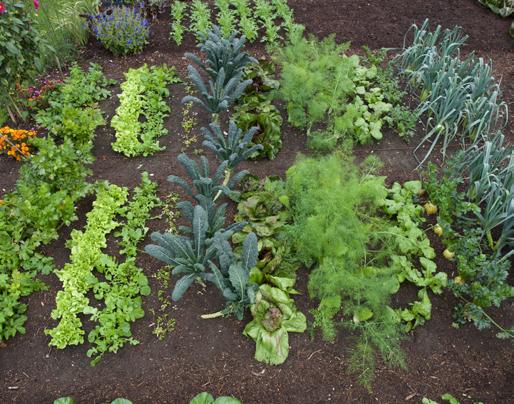
Rotation?
Is it important? In my experience, it isn’t, thanks to no dig. Because no dig soil remains in excellent structural condition and maintains good fertility. This makes for easier planning. You don't need to divide your growing space into four quarters for example.
You can put plants of the same family in different parts of the garden, as opposed to all together. This can reduce pests and disease and it looks more beautiful too. You can pop a few flowers amongst the vegetables, to maintain a nice balance of pest and predator insects. My favourite is dwarf French marigolds, which should be sown in April and May.
To find out more about the No Dig method, or for further information, go to:
www.charlesdowding.co.uk
Summer/Autumn 2023 The Vegetarian 47
Interview with Fumio Sasaki
As part of our series of articles exploring wider environmental and social issues, our CEO Richard McIlwain, spoke to Fumio Sasaki, renowned Japanese minimalist and the author of two books on the subject of minimalism.

Having first read one of Fumio’s books back in 2016, Richard was inspired and has been trying to apply the practice of minimalism in his own life, which can be challenging when living in a modern country hooked on consumerism. While many of us may not be able to reach Fumio’s level of dedication, there are lessons for all in thinking about how much we consume and whether we really need all the ‘stuff’ that surrounds us in our daily lives. Consuming less can help in preserving the planet’s precious natural resources, but also frees up space and time to help us consider what we really value about our lives and the people we share them with. Richard was keen to talk to and learn more from Fumio after coming across a speech made in Parliament by one of our founders, Joseph Brotherton MP. A keen Victorian reformer, Brotherton became a national celebrity in 1842, when after advocating against the use of child labour he was challenged on the fortune he himself had amassed from the factory system. He replied: ‘My riches consist not so much in the greatness of my means, as in the fewness of my wants’. Capturing the public’s imagination, his speech was printed in newspapers and was preached in sermons. Just five years later he became a founder member of the Vegetarian Society.
This interview was a three-way process, with Richard in the UK, Fumio in Japan and his friend and interpreter, Reiko, dialling in from the US.
48 The Vegetarian Summer/Autumn 2023
How do you define minimalism and why is it important to you?
When I wrote the book Goodbye, Things I had a very set definition of minimalism, which to me was someone who understands his or her own priorities and [reduces] their number of possessions to value, to honour [their] priorities. As time has gone by, my definition of minimalism has become broader and a little more casual and loose; should I say, to something more along the lines of someone who feels more comfortable and free with less than more.
My natural disposition is that I love things. I love to collect things. I love to look at things. I used to have a lot of things, but I was pretty bad at managing them and maintaining them. Now I understand that there are many people who experience the same thing […] and choose to go into minimalism because it helps. It really supports their life better to have [fewer] things around them, and that’s true for me as well.
What prompted you to explore minimalism? Was it a specific event that triggered your interest or a gradual process over time?
There was a moment when I first learned about the word ‘minimalist’. I Googled it and I found out about Andrew Hyde, who was known to have 15 items in his possession and travelled around the world. That was very, very shocking, and inspiring to me. However, I would say that there were eras leading up to that, which prepared me to be inspired by that discovery, which is that I lived in the same apartment for over 10 years. [It was a] very messy and cluttered apartment, and I felt like my life was in a rut. There was a whole period of stagnancy, which I think in retrospect was key in helping me prepare myself to receive this message about minimalism. I’ve read that Japanese interest in minimalism is influenced by the principles of Zen Buddhism and its core message of simplicity, and yet Japan was in many ways at the heart of the rise in consumerism, particularly with a golden age in the 1970s and 1980s of electrical consumer goods and owning ‘stuff’. Do you see this apparent contradiction played out today in modern Japan?
This contradiction was something that I was aware of from the very beginning as well when I became interested in minimalism. On the one hand, the Buddhist temples and the Shinto shrines, the Japanese people love visiting them, and I know that there is a part of us that just naturally feels more relaxed and really appreciates that simplicity and unclutteredness. At the same time, if you go into Tokyo and the urban areas, you’ll see lots of billboards and signs and lights. It’s very cluttered. It’s very stimulating. That contradiction is definitely there, especially now in current Japan, but I also feel and have noticed that this is actually not necessarily unique to Japan.
as minimalist in Japan. We had a gathering together, and in the beginning we used to have a lot of conversations about how many things we have and how much we throw away and stuff like that. Even back then, I realised that this is not good, and I eventually wrote this in the book: the psychology of wanting to throw out how little you have is exactly the same as wanting to show off how much you have. To me, minimalism is about finding happiness in what you have; it’s not about comparing how little or how much you have to others.
It's often reported that we’d need three Earths to maintain the current Western lifestyle and our levels of consumption. Do you have any thoughts on how more people might be encouraged to embrace a minimalist lifestyle, given that many people’s senses of identity are often developed through ownership of things?
If you think about every founder of great religions like Jesus Christ and Buddha and Mohammed, none of those people had a lot in their possession. They all advised against chasing after money and wealth. As I’ve been invited to speak in Europe and in Dubai recently, I was a little worried that the people in Dubai may not really be able to relate to what I have to say, but I discovered that Mohammed only had a cane to his possession, or something like that. I’m finding that this is a universal contradiction: we all have this appreciation for simplicity on one hand, and a desire for more and to consume as well.
I think some people might be put off by what seems to be a competitive minimalism, particularly in Western cultures where some online influencers boast about how little they have and record exactly the specific number of things they own. Do you worry that the apparently extreme nature of this activity could put people off who might otherwise embrace minimalism? It sounds like something that I’ve also noticed since the beginning when there were only a handful of us who identified
In terms of how to encourage people, that is a very complex, difficult question, but I do have hope in that. For example, I lived in the Philippines where not a lot of people have many things and they’re in the process of going into consumerism, if you will; they’re in the stage of developing into that. [To] tell them ‘Don’t buy more things’, when they’re very excited and hopeful and want to experience that, I think that’s a very difficult question. The interesting thing is that my book Goodbye, Things was very popular in Thailand, Indonesia, and Vietnam: countries that are very much in the process of developing into this Western lifestyle. Even the people who are in the midst of that process are still already finding that this can’t be the way, so there is an awareness even in those countries which I think gives us a lot of hope.
You practice yoga and meditation every day. Do you see these practices as a component part of being a ‘minimalist’, such that it is almost a philosophy for life, rather than minimalism simply being a process of ‘decluttering’ as it is sometimes identified in the West?
I totally agree with you that often minimalism is thought of like an interior design style. I will say that the reason why I was able to make meditation and yoga my habit is because I was finally able to live in an uncluttered room. What I love about meditation is that when
Summer/Autumn 2023 The Vegetarian 49
"To me, minimalism is about finding happiness in what you have; it’s not about comparing how little or how much you have to others."
I’m really deep in it, I could just be free of the desire to influence others or to obtain anything from others: to simply be, just like a tree growing on the earth [with] nothing to do and nowhere to be. That is the state of mind that I think minimalism has helped me cultivate: that simplicity of just being. You reference technology as playing a key role in supporting a minimalist lifestyle, particularly mobile phones and laptops with photos, video and music capable of being stored digitally. But there are often external and significant resource impacts and environmental harm associated with producing these. Do you strive to not only limit what you own but also make sure that what you do own is made in a sustainable way?
Yes. Actually, I had someone contact me requesting that I advertise their new sustainably and ethically produced smartphones, and it looked like they were doing some good work. However, I personally believe that the most helpful thing to do for the environment is to not buy more things and to use what you already have. No matter how much recycled metal you use to make new smartphones, you’re still creating things to be consumed, to be used, and to eventually be thrown away. I try my best to keep and use what I have, and fix it and mend it. I do try to be conscious that it takes a lot of water to produce denim clothes or that organic cotton uses less water than traditionally farmed cotton. That’s better of course, but I think the most effective thing that we could do is to do our best and not buy anything new. On a similar theme, I clearly must ask a question about diet. In your book, you discuss how minimalism naturally means you eat less and really focus on what you do eat. I feel this is important, as our desire for meat, fish, and dairy causes immense animal suffering and environmental harm to our climate and biodiversity. Have you considered cutting out meat in your diet or adopting an entirely plant-based diet?
As I reduced my possessions and started developing more awareness towards everything I consume, including food, there was a time when I pondered deeply
about where my food comes from, what kind of process it goes through, and what happens to the food waste: the complete cycle. In that process, there was a time when I started to develop an aversion to eating meat a little bit, and I did consider [eating a] macrobiotic, brown rice and vegetable diet for a while. I do think in something like factory farming, the process creates suffering for everyone involved.
You wrote the book Goodbye, Things back in 2015, which was my introduction to minimalism. Later you followed it up with Hello, Habits published in 2019. What prompted you to write the second book and how does it build on the first?

There are a couple of new habits that I developed as a result of practicing minimalism in the first book such as yoga and meditation, cleaning, and doing household chores. I always thought that I was the kind of person who just can’t do them, but I found that when the environment changed I could easily do them and it became actually kind of fun.
On the other hand, there are a couple of new habits that I had trouble acquiring, like getting up early in the morning or quitting alcohol. It led me to question: Why is it so difficult for me? So I started to do more research about habit-making and went on a journey of self-training and trial and error trying to acquire these new habits. That’s what the second book is about. In retrospect, when I read my second book from my standpoint now, it feels a little bit too like I’m trying too hard or being too aspirational, wanting to optimise myself too much.
What is the one item that you simply could not do without?
I can’t pick one, so I have to say two, and this brings up a contradiction from what we might think of what a minimalist ought to do. After I released Goodbye, Things, I started to become really interested in cars and motorbikes. Now I have my car which is a Mazda MX5, and a motorcycle which is a KTM, a company based in Austria.
I found that I like to just move from place to place and I love that act of moving, although the idea of owning a car or a motorbike is not very minimalist per se. Ideally, I would just have a horse that I could hop on and go from place to
place, or maybe take up surfing if I lived by the ocean. However, those options aren’t easily accessible to me right now so for me it’s my car and motorbike. I try to just be fulfilled with those two vehicles that I have. The car especially, I intend to just ride that for the rest of my life.
For anyone interested in minimalism and looking to adopt the concept within their own lives, what’s the best advice you could give them?
What I would tell them is to not worry about what’s popular right now. Minimalism is very popular and in trend right now, and I think that puts pressure on some people to try it out even if they’re not really drawn to it.
I personally believe that minimalism isn’t for everybody necessarily, and it’s really important to go pick a path that really suits you, your personality, your disposition, your interests. I could see how, if you think about the environment, maybe it’s more environmentally friendly to keep what you have and continue using it instead of letting it go.
I think the most important thing is to not be distracted by what’s popular or trendy, but by whether it resonates with you personally, to find fulfilment in your own way.
If you are interested in reading more about Fumio and the practice of minimalism, we highly recommend a read of his two published works on the subject, ‘Goodbye, Things’ and ‘Hello, Habits’ . Also available as an e-book (if you’ve been inspired not to buy a hard copy…)
50 The Vegetarian Summer/Autumn 2023
by Nikita Gordon, Chef Manager at the Vegetarian Society Cookery School.

British fruits often take a back seat when we talk about what’s in season. We’re so busy talking about amazing veggies, we can overlook all the delicious recipes for fruit and berries. Today, let’s talk about a very special berry... the humble blackberry. Let’s look at all things blackberry-related, and I don’t mean the phone from the 2000s!
When my sister and I were young, we loved picking blackberries. We’d set off with mum, washing up bowl and gloves in hand, excited for our harvest trip. I can still hear mum warning us: “Don’t pick anything below your knees”. A dog promptly demonstrated the reason why... I never forget now! Once the bowl was full, we’d make our way back home where freshly washed berries would magically be turned into the most delectable crumbles, puds and jams.
Blackberries are a great source of vitamin C, calcium, and antioxidants. They are perfect little pockets of sharp, sweet, and juicy. Did you know blackberries are great in savoury dishes? They are exquisite with goats’ cheese and walnuts in a salad.
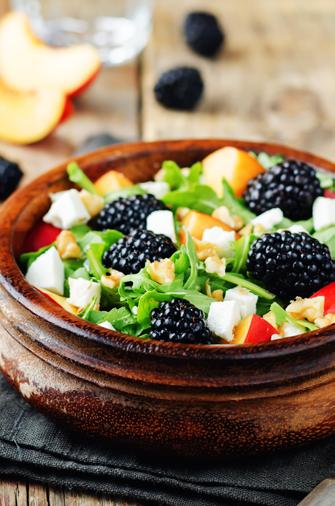
If you’re feeling adventurous, try a quick blackberry pickle. You will need enough liquid to half cover the blackberries. Heat equal quantities of water and white wine vinegar with a pinch of sugar. Pour the warm liquid over halved blackberries. Set aside to cool completely. Serve with crusty bread and a creamy spreadable cheese. Yummy!
Of course, there are few ingredients that beat a blackberry in a crumble. Our traditional recipe has an oat crumble for added crunch. It’s great with custard or ice cream. The filling is even better with your own handpicked blackberries. I hope you find a bumper crop near you soon.
www.vegsoc.org/recipes/oatyblackberry-and-apple-crumble/
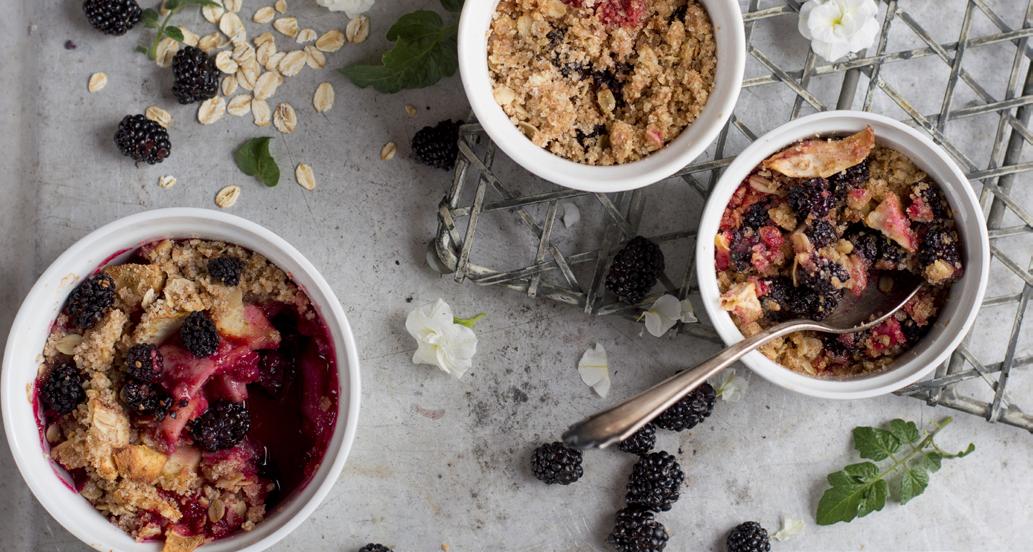
Summer/Autumn 2023 The Vegetarian 51
The Vegetarian Society Cookery School have something extremely exciting on the horizon and we are busy planning and developing our next steps behind the scenes.
As we are moving away from our current location, we won’t be advertising regular classes for a little while.
However, rest assured that we will be back soon! When preparations for our new home are in place, we’ll let everyone know - make sure you sign up to our newsletter to be the first to hear.

Scan the QR code with your mobile phone to sign up for cookery school news or visit www.vegsoc.org/cookerynews

52 The Vegetarian Summer/Autumn 2023
We're not quite ready to unwrap this yet...
Scan me!
STICKY ORANGE ROASTED GREEN BEAN AND MANGETOUT SALAD

"I am a strong advocate for warm salads. Roasting vegetables brings out their flavour but something dramatic changes when you roast green beans and mangetout (snow peas). There’s something about their bitter sweetness that is amplified in the process. This salad comes together quickly, retaining some crunch in the green veggies. Orange as the citrus in salads is criminally underrated in my opinion. Although it doesn’t offer that extreme acidity that lemon does, it gives a more subtle balance between sweet and sour.” –
Denai Moore (vegan chef)

Ingredients
Serves 4
• 200g (7 oz) fine green beans, topped and tailed
• 100g (3½ oz) mangetout (snow peas)
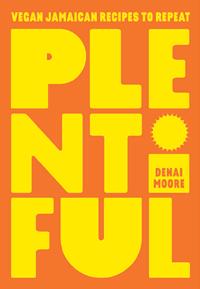
• 60g (2 oz/scant ½ cup blanched hazelnuts
• 250g (9 oz/1¼ cups) cooked green lentils
• 1 small shallot, finely sliced
• Handful of flat-leaf parsley leaves, roughly chopped, plus extra to serve
• Small handful of mint leaves, torn
For the orange dressing:
• Juice and zest of 1 orange
• 2 tablespoons olive oil
• 1 tablespoon maple syrup
• 3 garlic cloves, very finely chopped
• Salt and freshly ground black pepper
7.5miles better per portion
Method
Preheat the oven to 180°C (400°F/gas mark 6).
In a small bowl, whisk together all the ingredients for the dressing.
In a large bowl, toss the green beans and mangetout with half the dressing, then spread the vegetables out evenly on a wide baking sheet. Roast in the oven for 20 minutes, adding the hazelnuts after 10 minutes.
Once roasted, transfer the vegetables back into the bowl and add the lentils, shallot, parsley and mint. Add the remaining dressing and toss to combine. Sprinkle with a little more parsley before serving.
93.1% less emissions than a Sticky Orange
Roasted Beef and Mangetout Salad.

Summer/Autumn 2023 The Vegetarian 53
Plentiful by Denai Moore (Hardie Grant, £24)
Photography by: Yuki Sugiura
CRISPY CHILLI TOFU
"This is our take on one of our favourite Chinese takeaway dishes. It’s spicy, full of umami flavour, sticky, gooey and incredibly moreish. Often when you buy this kind of dish it’s filled with MSG, but ours is much healthier, with a base of orange juice and sweet chilli sauce adding the main sweet tang. Serve with perfectly boiled rice.”
– Henry Firth & Ian Theasby... aka BOSH! (vegan chefs / TV presenters / best-selling authors)

Ingredients
• 1x 280g block firm tofu
• 150g cornflour
• Vegetable oil, for frying
• 2 lemons
• 250ml orange juice
• 100g sweet chilli sauce
Serves 2-4
• 1 tbsp sriracha or other chilli sauce
• 3 tbsp soy sauce
• 1 spring onion, to serve
• 1 tsp sesame seeds, to serve
BEFORE YOU START
• Tofu press or 2 clean tea towels and a weight such as a heavy book
• Large pan on a high heat
• Large plate covered with kitchen paper
Method
Press the tofu
Press the tofu using a tofu press or place it between two clean tea towels, lay it on a plate and put a weight on top.
Leave for at least half an hour to drain any liquid and firm up before you start cooking.
Coat the tofu
Cut the tofu into bite-sized chunks and spread them out on a board.
Sift cornflour over the top, coating the pieces generously.
Use tongs or two forks to turn the pieces and sift over more cornflour until the tofu is covered on all sides.
The thicker the better with the cornflour as this coating gives the cooked tofu its crunchy texture.
Cook the tofu
20.7 miles better per portion
Pour enough oil into the pan to fully coat the bottom and heat until it makes the tip of a wooden spoon sizzle.
Carefully place the tofu pieces in the pan, with a bit of space around each one (you may need to cook them in batches).
Cook for 5 minutes, turning the pieces every minute or so until they are starting to turn golden brown.
Transfer to the plate lined with kitchen paper.
Tip away the excess oil in the pan and reduce the heat to medium-high.
Make the sauce
Cut the lemons in half and squeeze the juice into the pan, catching any pips in your other hand (be careful as the pan may spit).
Add the orange juice, sweet chilli sauce, sriracha and soy sauce and bring to the boil.
Simmer for 5–7 minutes until the liquid has reduced to a syrupy consistency.
Time to serve
Add the tofu strips back to the pan and stir until fully coated.
Continue to cook, stirring regularly, for 5 minutes and then remove from the heat.
Finely slice the spring onion and sprinkle over the tofu along with the sesame seeds before serving.
BOSH!’s latest book MEAT: the new plant-based, meat-free cookbook – available now. @boshtv www.bosh.tv
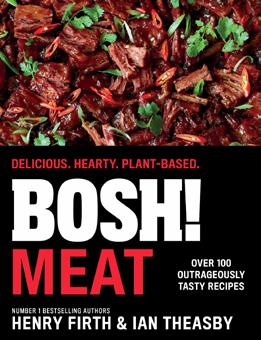
54 The Vegetarian Summer/Autumn 2023
91% less emissions than Crispy Chilli Beef.


Quick chickpea braise with kale & harissa

“This is a meal in a pan, a pan full of all the things I want to eat on a cold weeknight, and there is little more comforting than that. Most greens would work here in place of the kale. Jarred chickpeas are my choice – always. If you don’t have preserved lemons, the zest of an unwaxed lemon will do fine.”
- Anna Jones (cook / writer / best-selling author)

Ingredients
• Olive oil
• 1 red onion, peeled and thinly sliced
• 2 cloves of garlic, peeled and thinly sliced
• 2 big handfuls of kale (about 200g), leaves roughly chopped, stems shredded
• 1 heaped teaspoon ground turmeric
• 1 preserved lemon
• 1 x 400g tin chopped tomatoes
• 2 x 400g tins chickpeas or a 660g jar
• A bunch of flat-leaf parsley, roughly chopped
To serve:
• 4 tablespoons plain yoghurt of your choice
• 1 tablespoon harissa
• Tahini, for drizzling
• 4 flatbreads
Method
Put a little oil in a large frying pan, add the onion and cook over a medium heat for 5 minutes. Once the onions have had 5 minutes, add the garlic, kale stems (leaves go in later) and turmeric to the pan and cook for a couple of minutes.
While that happens cut the preserved lemon in half, remove and discard the flesh, then finely chop the peel. Add this to the pan along with the tomatoes and the chickpeas, including their liquid. If you are using jarred chickpeas you might want to add another 150ml water here, as there will be less liquid than if you are using 2 tins.
Cook for about 10 minutes, until the tomatoes have thickened and reduced. Add the reserved kale leaves and cook for a few minutes until wilted. Taste and season with salt and pepper as needed (the jarred chickpeas are usually already well seasoned, so be sure to taste first). Stir in most of the parsley. Ripple the yoghurt and harissa together in a bowl and serve with the braise, a drizzle of tahini, the last of the parsley and some warm flatbreads.
2.5miles better per portion
56.9% less emissions than a Quick Chicken Braise with Kale and Harissa.

56 The Vegetarian Summer/Autumn 2023
Anna Jones’s latest book One.
4
Portrait photo and food photo by: Issy Croker
From
www.annajones.co.uk Serves
Boston Beans and Sausage Casserole
"This firesome one-pot wonder offers a veggie take on the old American classic! Throw it back to the Wild West with Cauldron’s hearty Lincolnshire Sausages and earthy cannellini beans, all fired up with spicy chipotle and smoky paprika. Perfect for sharing with friends around a roaring campfire or your kitchen table, it delivers on flavour time after time!"

– Cauldron Foods (official sponsor of National Vegetarian Week 2023)

Ingredients
• 1 pack Cauldron Lincolnshire Sausages, left whole
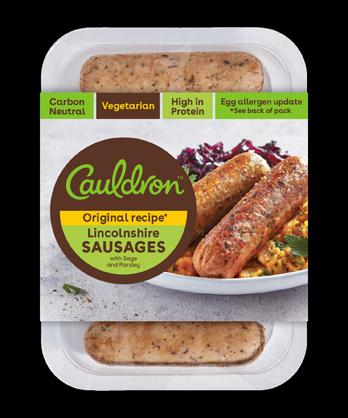
• 2 tbsp olive oil
• 1 large onion, chopped
• 2 garlic cloves, crushed
• 4 tsp chipotle paste
• ½ tsp smoked paprika
• ½ tsp each salt and pepper
• 2 cans (each 400g) cannellini beans, drained and rinsed
• 750ml passata
• 50g brown sugar
• 3 tbsp black treacle
• 1 tbsp Dijon mustard
• 1 tbsp cider vinegar
• 1 loaf crusty bread, for serving
Serves 6
1.2miles better per portion
Method
Preheat the oven to 180°C/160°C fan/gas mark
4. Heat the oil in a large ovenproof dish set over a low heat on the hob. Cook the onion, garlic, chipotle paste, smoked paprika, salt and pepper for 5 to 10 minutes or until softened.
Stir in the beans, passata, brown sugar, 60ml water, treacle, mustard and vinegar. Bring to the boil, cover and transfer to the oven for 40 minutes or until bubbling and beginning to thicken.
Stir in the sausages and cook for 15 to 20 minutes, or until the sausages are cooked through.
Serve with fresh crusty bread.
43.6% less emissions than Boston Beans and (Beef and Pork) Sausage Casserole.

Summer/Autumn 2023 The Vegetarian 57
CHARGRILLED COURGETTES WITH WHIPPED FETA & BLACKENED CHILLI-LIME DRESSING

“Chargrilling courgettes on the griddle or the barbecue brings out their sweetness, while also giving them elusive smoky notes. Using a mixture of yellow and green courgettes makes for a particularly lovely-looking salad. This dressing was devised by Leo, Wahaca’s development chef, and it is blissfully light, sharp and zingy all at the same time, perfect for dressing the rich courgette flesh.”
Ingredients
• 70ml (2½ fl oz) good olive oil
Serves 4-6
• 6 large courgettes (zucchini), green and yellow
• Few large handfuls of watercress or other peppery leaves
• 50g (2 oz) toasted hazelnuts (filberts) (optional)
For the whipped feta
• 200g (7 oz) feta, drained
• 180g (6½ oz) Greek yoghurt
• 2 tbsp tahini
• Zest of 2 limes
For the dressing
• 2 green chillies
• 12g (½ oz) sea salt
• Juice of 2 limes
• Handful mint leaves, plus extra for garnish
Method
Blitz the feta and yoghurt with the tahini, lime zest and 1–2 tablespoons of the olive oil. Set aside.
Dry-roast the green chillies in a dry frying pan (skillet) until blackened in spots all over, then whizz with 50ml (1 fl oz) water, the salt, mint leaves, 50ml (1¾ fl oz) of the lime juice and 25ml (1 fl oz) of the olive oil.

Cut the courgettes lengthways into 2cm (¾ inch) slices and toss in 1–2 tablespoons of oil. Grill (broil) on a griddle or over a barbecue until nicely coloured on each side, turning with tongs. Once they are coloured and tender but not mushy, remove them from the barbecue onto a serving plate.
Spoon the whipped feta onto a pretty platter, followed by the courgettes. Drizzle with some of the lime dressing. Strew with the watercress and then top with toasted hazelnuts, if using, and the mint leaves. Dress with a little more chilli-lime dressing and serve.
65.3% less emissions than Chargrilled Chicken with Whipped Feta and Blackened ChilliLime Dressing.


58 The Vegetarian Summer/Autumn 2023
- Thomasina Miers (cook / co-founder of Wahaca / food writer)
Portrait photo: © Tara Fisher 2015
Recipe photo: Tara Fisher
MEAT-FREE
4.4 miles better per portion
MEXICAN
by Thomasina Miers (Hodder & Stoughton, 2022)
Halloumi and Cauliflower Curry
“This Friday night ‘fakeaway’ is Halloumi and Cauliflower Curry. This recipe is a firm favourite of Flo’s and can be left to bubble away for hours (or made quickly in under 40 mins).”
– Celebrity chef Simon Rimmer and daughter Flo

Serves 4
Ingredients
• 200g halloumi, cubed
• 1 cauliflower, chopped into florets
• 1 large onion, diced
• 150g peas
• 250ml vegetable stock
• 2 tins chopped tomatoes
• 3 cloves of garlic, finely diced
• 1 tbsp turmeric
• 1 tbsp hot chilli powder
• 1 tbsp garam masala
• 1 tbsp ground cumin
• Knob of ginger, grated
• Chopped coriander, to serve
• Fresh red chillies, slices, to serve
Method
In a large, deep pan start by frying the onions on a medium heat until they begin to turn translucent and then add the garlic, ginger, and spices, stirring well until the onions are coated.
Add the cauliflower, tinned tomatoes and vegetable stock and leave to simmer for at least 40 minutes, stirring occasionally.
Whilst your curry is cooking, fry off your halloumi until golden brown.
Once your curry sauce has thickened add your halloumi and peas and simmer for a further 5 minutes.
Serve over rice with the coriander and chillies as a garnish. Enjoy!
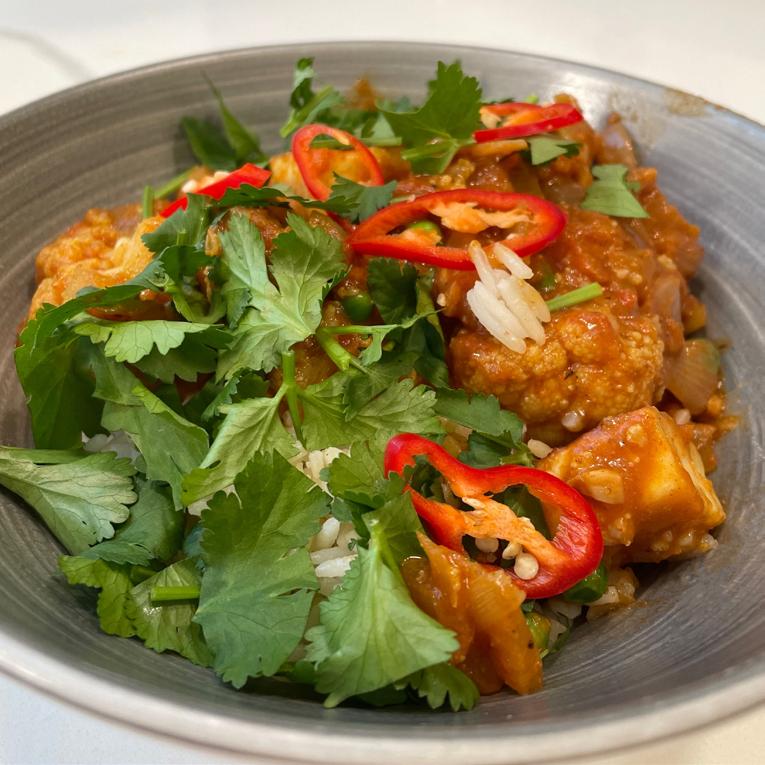
70.5% less emissions than a Lamb and Cauliflower Curry.

www.greensrestaurants.co.uk
Instagram: @rimmersimon
Instagram: @florimmer
6.2 miles better per portion
Summer/Autumn 2023 The Vegetarian 59
Trademarked Products
Browse some of the latest products to carry the Vegetarian Society Approved trademarks. For a full list of all accredited products, visit our website: www.vegsoc.org/products

Conscious Chocolate
Save 15% on raw, vegan, organic chocolate with a subscription. Chocolate on another level. You can amend, pause, or cancel anytime.

Organic | Vegan | Gluten Free | Palm Oil Free | Refined Sugar Free
www.consciouschocolate.com
Dean’s of Huntly Ltd
Dean’s Shortbread Slimmms are slowly hand-baked for the perfect melt-in-the-mouth texture and packed in handy twin packs, making them the ideal teatime or on-the-go treat.
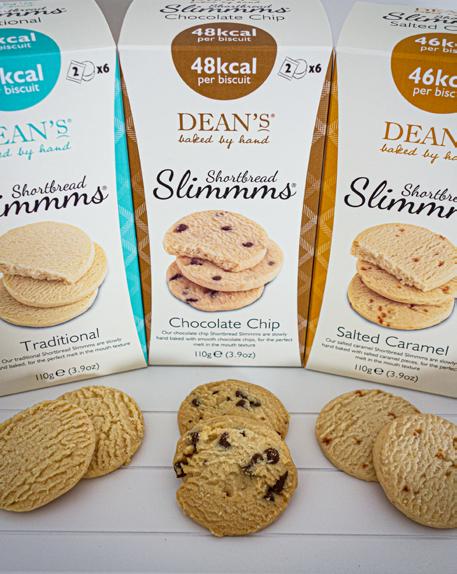
Available in Traditional, Chocolate Chip and Salted Caramel.
www.deans.co.uk
Drivers Pickles
Introducing Drivers Pickles, time-honoured pickle experts since 1906. With over a century of pickling excellence, they are proud to offer you a delectable range of Vegetarian Society Approved products. Their pickles are the perfect addition to your summer BBQs, grazing boards, cheeseboards, and picnics, adding a burst of flavour and deliciousness to every bite!
Crafted with care and using only the finest ingredients, their pickles are created to tantalise your taste buds. Whether you prefer tangy gherkins, crispy cornichons, or spicy chutney, Drivers Pickles has something to satisfy every palate.
www.pickle-lovers.co.uk
60 The
Summer/Autumn 2023
Vegetarian
Flower & White
Snack lover? Meet Flower & White, innovators of light and indulgent snacks and treats. A family-run business founded in Shropshire by husband-and-wife duo Brian and Leanne Crowther, they’re all about life’s simple, sweet pleasures.

Best known for their gourmet chocolate-covered meringue bars, the team are passionate about great tasting, ethically minded products using better, naturally grown ingredients. No additives, no E-numbers, just all-natural deliciousness.
With an ever-expanding range, there is truly something for everyone, whether you’re gluten-free, on a plant-based diet, or watching your calorie intake. Flower & White’s range of gourmet light and indulgent snacks really deliver on that taste sensation to delight any foodie!
www.flowerandwhite.co.uk
Freedom Confectionery
Since 2013, Freedom has pioneered as the world's ‘original and only all-inclusive marshmallow’ company, catering to vegans and those seeking halal and kosher options.


These guilt-free indulgences not only accommodate various dietary needs, but also impress with their gelatine-free, gluten-free, egg-free, dairy-free, soy-free, nut-free, tree nut-free, fat-free, GMO-free nature, infused with natural colours and flavours. Whether enjoyed as a snack, shared with loved ones, or incorporated into delightful recipes, these marshmallows promise an exquisitely delicious and indulgent experience.
www.freedommallows.com
Gordon Rhodes Ltd
Gordon Rhodes was an intrepid traveller who searched the globe for the finest quality ingredients. From these, the V and Easy range of gourmet vegan sauce mixes was created. Featuring five, flavour-packed recipes – Vive Le Veg Cassoulet, Chilli Non Carne, No Worry Veggie Curry, Too Good To Be Stew and Supreme Green Veggie Tagine, all designed with the convenience of slow cooking in mind.
Gordon Rhodes is delighted to continue to support members of the Vegetarian Society by offering 20% off the V and Easy range. Just head over to their website and enter VEG23 at the checkout.
www.gordonrhodes.co.uk
Summer/Autumn 2023 The Vegetarian 61
Hale Naturals
The secret of PPB - Powdered Peanut Butter, is that only the finest peanuts are selected and slowly roasted then pressed to remove most of the fat and oil. The result is peanut butter powder which is high in fibre but with less saturated fat.

Take PPB camping, to the gym, to work, or wherever you want to enjoy peanut butter without the guilt.
www.halenaturals.com
HayMax Limited
HayMax is different from most allergy products, this barrier balm seeks to prevent allergens getting in the body.

It’s 100% natural, certified organic, carries the Vegetarian Society Approved vegetarian trademark and has won over 50 awards!
Look out for new sugar cane pots, which use up CO2 instead of producing it.
www.haymax.biz
Hello Day
Vegan Omega 3 uses a 100% sustainable, ethically sourced, vegan Schizochtrium, which is a rich source of Omega 3 fatty acids.

Hello Day’s award-winning Vegan Omega 3 is grown in a controlled environment and contains no trace metals, PCBs, herbicides or pesticides. It is purified using a patented process to ensure there are no unpleasant odours, unpalatable flavours or reflux issues.
www.hello-day.com
62 The Vegetarian Summer/Autumn 2023
HOWND
HOWND has a simple mission: to improve the health and wellbeing of dogs without unnecessary harm to other animals and the planet. Since 2015, HOWND, has evolved into a multi award-winning ethical lifestyle brand for Britain’s dogs.

They recently launched a new range of hand-baked Wellness Treats for your dog. Nutrition-packed, 100% plant-based and hypoallergenic for sensitive tummies, these soft hand-baked treats come in five functional flavours.
www.dogslovehownd.com
Igennus Healthcare Nutrition
Prenatal Vitamins & Minerals is the first in Igennus’ Be kind range, formulated to provide comprehensive nutrition support during pregnancy for both mum and baby and up to three months postnatal. This supplement provides 100% of the nutrient requirements for 18 vitamins and minerals.

www.igennus.com
Innopure
SmartyPants Children's Multivitamin contains all eight essential B vitamins to ensure children get the nutrients they need to stay healthy. It also contains vitamin D3, vitamin C and zinc for their immune system benefits and added iron for normal cognitive development and growth.

It's a great way to help fill the gaps, especially on days when they don't finish all of their fruits and vegetables. Perfect for age four to teens, it’s in a yummy mixed berry flavour so you won’t have to worry about your kids not wanting to take their vitamins!
www.innopure.com
Summer/Autumn 2023 The Vegetarian 63
La Saucy Salsa
Generations of flavour in a jar! Made in West Sussex to traditional family recipes passed down over generations, La Saucy Salsa is a true taste of Spain and a very versatile way to use salsa sauces.

One jar, three ways! Their range of three flavours, Chilli & Garlic, Paprika, and Scotch Bonnet can be enjoyed as a sauce, dip, or marinade with all your favourite foods.
La Saucy Salsa is proudly made in Britain, is gluten free, Sugarwise Certified, free from added sugars, and accredited as vegan and vegetarian by the Vegetarian Society.
www.lasaucysalsa.com
Man Fook
Welcome to the tantalising world of Man Fook Sweet Chili Sauce! Chilli sauce producer, Man Fook, crafts culinary sensations to delighted discerning palates. Their time-honoured techniques and state-of-the-art production facilities ensure that every bottle of Man Fook Sweet Chili Sauce is a masterpiece of flavour and quality.
From stir fries and noodles to dips, marinades, and more, their chili sauces are the perfect companion to elevate your culinary adventures and take your taste buds on an unforgettable journey.

www.manfook.com.my
Garlic Bakery
Crispy Chips are made by thinly slicing and baking savoury wholewheat bread made with carefully selected nuts and selected dried fruits.
www.garlicky.co.kr
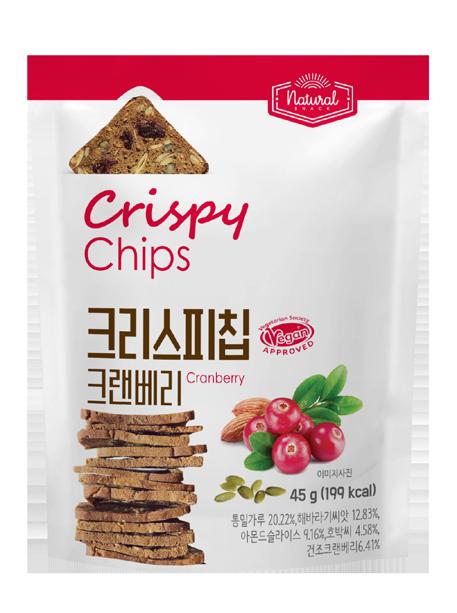
64 The Vegetarian Summer/Autumn 2023
Miravvi
Miravvi is dedicated to the pursuit of wellness and the benefits of a balanced lifestyle through the wisdom of nutrition.
www.miravvi.com
Natural Health
Are you curious to explore new and unique honey varieties? Look no further than Natural Health Greek honeys!
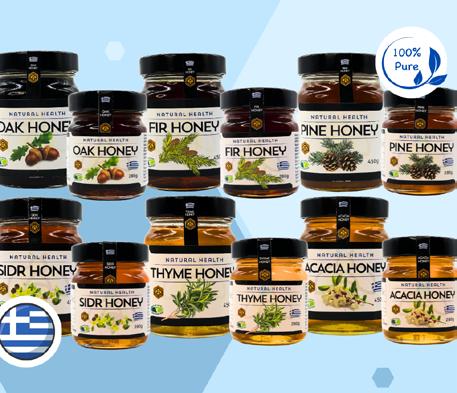
They offer top-notch, pure, and unprocessed honey sourced from diverse wild areas in Greece. With options like thyme, acacia, pine, sidr, fir, and oak honey, each honey type has its own special flavour, aroma, and colour.
These honeys are produced using sustainable and organic beekeeping practices and are proudly accredited as vegetarian by the Vegetarian Society.
www.naturalhealthworld.co.uk
Nuzest
Good Green Vitality is a comprehensive nutrient super blend designed to support overall health and wellbeing. Containing 75+ premium ingredients working together to support gut health, immunity, healthy ageing, energy production, stress, and mental cognition – all in one hit.
Using Good Green Vitality is easy and convenient, making it an ideal supplement for those who want to ensure that they are getting all the necessary nutrients in a convenient and easy way.

www.nuzest.co.uk

Summer/Autumn 2023 The Vegetarian 65
Olive and Peach
Experience the delightful Shea Delight shea butter range of fragrance-free belly butter, whipped body butter, massage bar, body balm and lip balm. Specially formulated with the family, and expectant and new mums in mind.
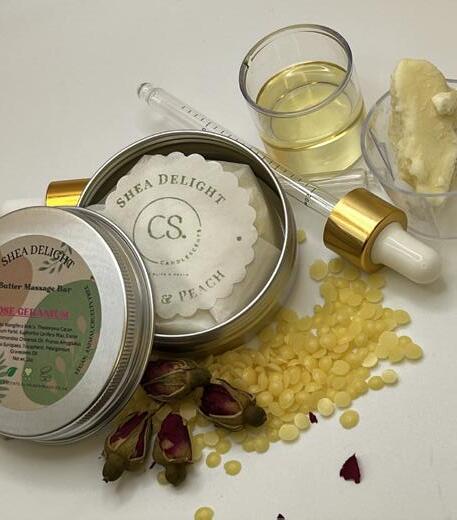
www.oliveandpeach.co.uk
Omni Pet
Omni has launched a wet vegan pet food range that utilises their patent-pending meat texture technology and has been likened to chunks of real beef and chicken. The range includes toppers enriched with vitamin B12 and iron to be added to dry food, and nutritionally complete tins of wet food.
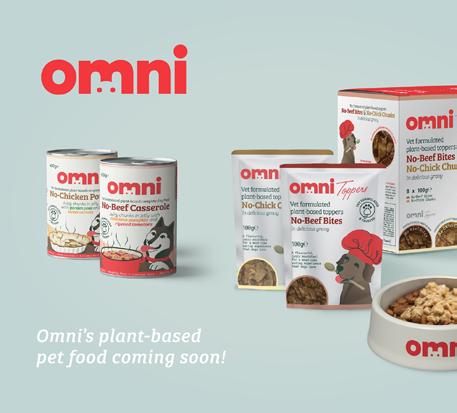
As with all Omni products, they have been formulated in collaboration with top veterinary nutritionists and a leading UK vet school.
www.omni.pet
Popcorn Kitchen
Cherry Bakewell is the eighth offering in Popcorn Kitchen’s ongoing commitment to create a truly immersive experience of all your favourite childhood flavours in a stylish popcorn style.
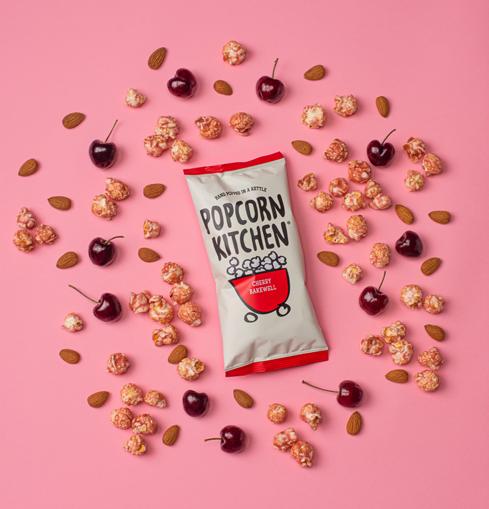
Made with gourmet popcorn, buttery caramel, freeze-dried sour cherries and a discreet hint of all-natural almond flavouring, this is a stylish, guilt-free treat that truly delivers in terms of a classic pud.
www.popcornkitchen.co.uk
66 The Vegetarian Summer/Autumn 2023
Rivya
Rivya is a vegan Indonesian skincare company that was built to help people to become the best version of themselves. Combining natural ingredients with modern technology Rivya have produced a range of skincare products that are innovative yet natural, effective, affordable, and easy to use.
www.rivya.co.id/
Tanamera Tropical Spa
Presenting Oomf, Quanna’s all-natural, water-based lubricant that goes beyond the ordinary. This unique product is enriched with organically grown CBD and prebiotics, offering more than just lubrication.

Oomf has been expertly formulated by gynaecologists to not only enhance natural lubrication, but also to maintain the pH balance and support a healthy vaginal microbiome. It's a champion for long-lasting moisture and an ally in preventing infections.
Experience the Oomf difference – where nature meets science for intimate health and comfort.

www.byquanna.com
Tanamera’s Brown Formulation Body Soap is a bestseller and will change your idea of a shower. The presence of rice grains in the soap produces a gritty surface which works as an exfoliator to remove dead skin cells. The inclusion of herbs and spices in this high-grade palm oil soap invigorate your skin and may help to alleviate rashes and itchiness.
www.tanamera.com.my
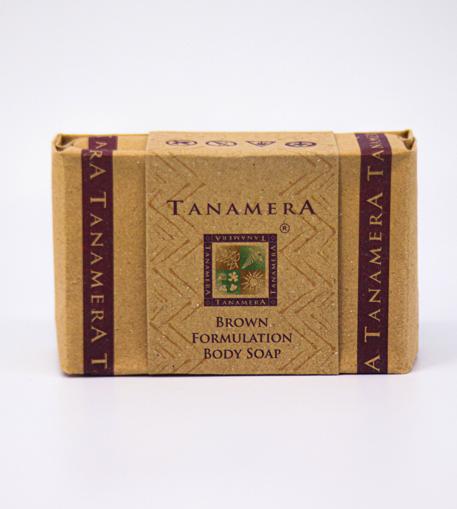
Summer/Autumn 2023 The Vegetarian 67
Quanna
The Food Supply Ltd
The Food Supply Ltd, established in 2020, is dedicated to transforming traditional lines from India into modern, healthier, and eco-friendly alternatives. With exotic spices, each item is thoughtfully crafted to elevate your culinary journey.

www.thefoodsupply.co.uk
The Raw Chocolate Company
The Raw Chocolate Company’s Salty Chocolate Hazelnuts are massively moreish chocolate-coated hazelnuts with a pinch of sea salt and a dusting of cacao powder. They’re organic, vegan, gluten free, palm oil free, and refined sugar free.
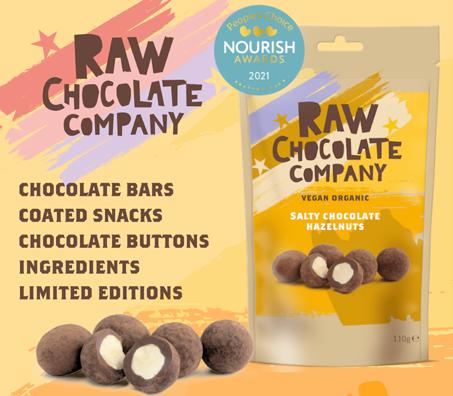
Awards they’ve won include Boom’s ‘Best of Organic Market’ award, and BBC Good Food’s ‘Best Healthy Chocolate’ award.
www.therawchocolatecompany.com
Truede Limited
Truede’s Peng Sea Salt and Vinegar Roasted Chickpea Snacks are packed full of protein and fibre and are both nut and gluten free. Not only that, but they also contain iron, vitamin B6, and magnesium amongst other key vitamins and minerals. Finally, they’re accredited as vegan by the Vegetarian Society!
www.truede.com
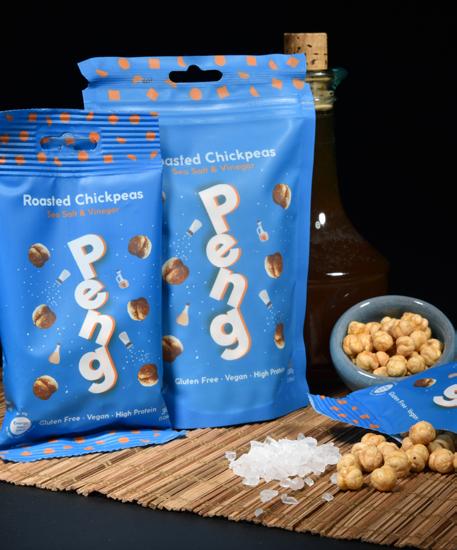
68 The Vegetarian Summer/Autumn 2023
Vanilla Mozi
Vanilla Mozi produce luxe natural bug protection. Rather than using pesticides, their innovative BiteProof Body Cream makes you smell like a flower that bugs instinctively avoid.

Australian made and owned, Vanilla Mozi has been established over 15 years to become an essential product that’s highly effective but gentle enough, even for use on babies’ faces.
Vanilla Mozi is vegan; organic; pesticide, palm oil, cruelty and paraben free; and family friendly.
www.vanillamozi.com
Vitabiotics
Wellwoman Vegan from Vitabiotics has been specially developed for women who are following a vegetarian or vegan diet. With 24 nutrients including vitamin D, iron, zinc and vitamin B12, it provides unique vegetarian and vegan support in the Wellwoman range.

www.vitabiotics.com
Olu Olu
Olu Olu’s coconut milks bring a little luxury to dishes and are a great alternative to regular dairy milk. They’re a versatile product that can be used in desserts, baking, beverages and for cooking in a variety of cuisines: Caribbean, Asian, Oriental, and others. Used in everything from curries to dairy-free ice cream, their rich smooth coconut cream will compliment your stews, soups, drinks, and baked items.

Check out Olu Olu’s website for more information.
www.oluolufoods.com
Summer/Autumn 2023 The Vegetarian 69
Competitions!
Hale Naturals
www.halenaturals.com
Are you a peanut butter enthusiast who loves exploring new flavours? Then this is the competition for you!
You could win four mouth-watering tubs of powdered peanut butter, featuring four tantalising varieties: Original, Chocolate Flavour, Sweetened with Stevia, and Cinnamon Flavour. Just go to: www.vegsoc.org/comp and answer this simple question:

How many varieties of Hale Naturals’ powdered peanut butter are there?
HayMax www.haymax.biz
The HayMax VIP Pack contains six boxes of HayMax organic, drug-free allergen barrier balms for hay fever and airborne allergy sufferers. They are ideal for dust and pet allergy sufferers this autumn and hay fever sufferers in spring and summer. The pack contains two boxes of HayMax Pure, the original, unscented balm, and one each of the other varieties in the HayMax range – Lavender, Frankincense, Aloe Vera and HayMax Kids.

For a chance to win a HayMax VIP Pack, simply go to: www.vegsoc.org/comp and answer the following question:
Which of these is not a variety of HayMax?
A. Aloe Vera B. Frankincense
C. Lavender D. Nettle
Vitabiotics www.vitabiotics.com
Vitabiotics provides supplements with safe, balanced, and effective support, with the goal of helping you to be at your best, day after day. The range includes Wellwoman Vegan, with 24 nutrients to safeguard the nutritional needs of women following a vegetarian or vegan diet. It includes vitamin B12 and iron to support normal red blood cell formation. Ultra Vitamin D gummies provide 1000iu vitamin D in a delicious, natural orange-flavoured chewable gummy, suitable for vegans. You could win a three-month supply of both Wellwoman Vegan and Ultra Vitamin D Gummies by going to www.vegsoc.org/comp and answering this question:

How many nutrients does Wellwoman Vegan contain?

A. 18 B. 21 C. 24 D. 27
Terms and conditions The competitions are open to all UK residents with the exception of employees and their families of the Vegetarian Society of the United Kingdom and the companies that have contributed a prize and anyone connected with the competitions. The judges’ decision is final and no correspondence will be entered into relating to the result of the competitions. Only one entry per competition per person. Completed entries must be received by midday on Friday 15 September 2023. The prize winner(s) will be chosen at random from the correct entries received by the date specified. No cash or other alternative will be offered in lieu of the prize. The Vegetarian Society accepts no responsibility for any entries (online or postal) lost or not received or actions of companies outside of the Vegetarian Society. The winner(s) will be contacted by a member of staff at the Vegetarian Society and may be asked to participate in post-event publicity.
By entering any of these competitions, you are agreeing for us to send you emails about the Vegetarian Society’s work, as well as how you can get involved and support us through fundraising and campaigning. We will never share your details with anyone else without your express permission, and you can unsubscribe from these emails at any time. See the full Privacy Policy (www.vegsoc.org/privacy-policy) with information about how we store and use your personal data. If you are a member of the Vegetarian Society you will continue to receive communications from us, regardless of your preferences indicated on this form. If you do not wish to receive communications from us by telephone, email or post please contact us at hello@vegsoc.org or by calling 0161 925 2000. The winner(s) will be contacted via email by a member of staff at the Vegetarian Society and the winner(s) may also be announced on our website, Facebook and Twitter. For a full list of terms and conditions, please visit: www.vegsoc.org/compterms
70 The Vegetarian Summer/Autumn 2023
To enter, go to: www.vegsoc.org/comp
A. 1 B. 2 C. 3 D. 4
Gordon Rhodes
Discount: 20% off the ‘V and Easy’ range


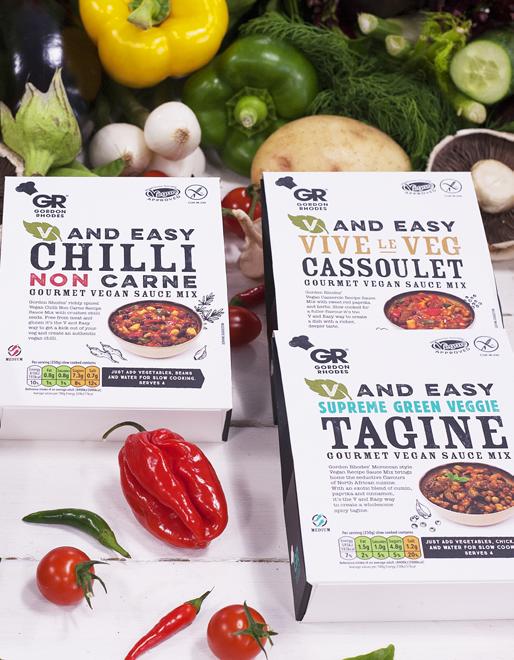
Code: VEG23

Expiry: Ongoing
Gordon Rhodes was an intrepid traveller who searched the globe for the finest quality ingredients. From these, the V and Easy range of gourmet vegan sauce mixes was created. Featuring five, flavour-packed recipes – Vive Le Veg Cassoulet, Chilli Non Carne, No Worry Veggie Curry, Too Good To Be Stew and Supreme Green Veggie Tagine, all designed with the convenience of slow cooking in mind.
www.gordonrhodes.co.uk
Summer/Autumn 2023 The Vegetarian 71 GET YOURS NOW
advertisement
Discount


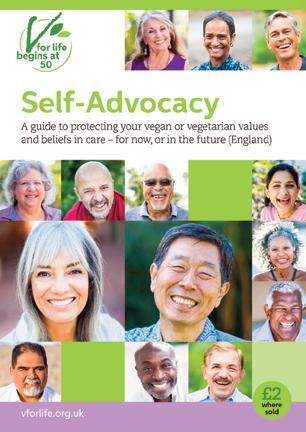




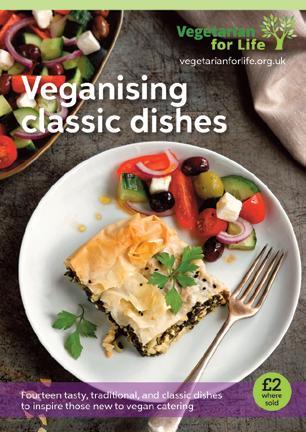

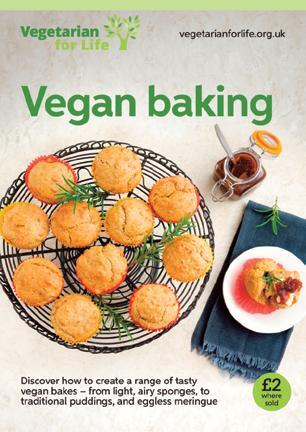




0161 257 0887 | vforlife.org.uk | VfLUK @VfL UK V for Life is a charity registered in England and Wales, number 1120687 With you on the journey Vegan recipe service Veg*n pen- and phone-pals scheme Just £2.75 inc P&P Lifestyle support 0161 257 0887 vforlife.org.uk/shop advertisement





































































































































































































